
A LIVING ROOF GROWS IN MONO
HOW TO RAISE BACKYARD CHICKENS
FROM SEED TO CELEBRATION
A LOCAL AUTHOR MUSES ON CANADA-U.S. TIES




HOW TO RAISE BACKYARD CHICKENS
FROM SEED TO CELEBRATION
A LOCAL AUTHOR MUSES ON CANADA-U.S. TIES





AllPro Roofing Inc. is a family-owned company with three generations of experience in the roofing industry.
AllPro Roofing Inc. is local, fully licensed, and insured. On top of that, they also practice safe work habits, providing their customers with the utmost peace of mind.
AllPro Roofing Inc. is dedicated to providing customers with the finest workmanship, materials and customer service.








We think it looks a lot like this — Laughter shared over morning coffee. Impromptu dance parties in the lounge. New friendships, familiar comforts, and the support to spend your days exactly as you choose.
At Avalon Retirement Lodge, retirement living isn’t about stepping away from life; it’s about continuing to embrace it with confidence, joy and connection. If you’re ready to turn this picture into your reality, we’d love to meet you!



















BCS has been helping young learners build a �irm foundation since 1977:
• Academic excellence from K-12
• Christian values & worldview
• 94% of our graduates go into post-secondary education
• Committed, professional teachers

•




















36 THE TIES THAT FRAY
Michael Adams, a longtime observer and chronicler of Canada-U.S. relations, muses on Canada’s recent election, our strained relations with our neighbour to the south, and whether Trumpism is more or less a threat to our nation than a decade ago BY
EMILY DICKSON
40 GARDENER ON THE ROOF
A naturalistic living rooftop in Mono created by garden booster Tony Spencer, aka “The New Perennialist,” benefits the environment and nurtures the spirit BY
DON SCALLEN
50 THE LAKE
“The Lake may be at its most beautiful in summer, its waters warm and its surroundings green. Birdsong carries over it. The reeds, cattails and water lilies at its margins burgeon and are in full flower”
BY ANTHONY JENKINS
52 FROM SEED TO CELEBRATION
A look at the farmer-chef ties behind truly local menus at Headwaters restaurants and special events BY
ANTHONY JENKINS
77 IN FINE FEATHER
Local flock owners share how they got hooked on raising chickens and how the rewards go far beyond the ultra-fresh eggs BY
ALISON McGILL
59 HEADWATERS FARM FRESH GUIDE
Our 2025 map and guide to the best local produce, meat and craft beverages at farms across the region













EDITOR AND PUBLISHER
Tralee Pearce
ASSOCIATE EDITORS
Dyanne Rivers
Emily Dickson
ART DIRECTOR
Kim van Oosterom
PHOTOGRAPHERS
Erin Fitzgibbon
Rosemary Hasner
Kathryn Hill
Elaine Li
Pete Paterson
Tony Spencer
ILLUSTRATORS
Shelagh Armstrong
Ruth Ann Pearce
Jim Stewart WRITERS
Stephanie Casino
Esguerra
Anthony Jenkins
Bethany Lee
Alison McGill
Dan Needles
Janice Quirt
Tony Reynolds
Nicola Ross
Don Scallen

Tony Spencer’s green roof in Mono
Roberta Fracassi
Johansen
Cindy Caines Dillman
Hodgson
Kerr
FOUNDING PUBLISHER Signe Ball
In The Hills is published quarterly by MonoLog Communications Inc. It is distributed through controlled circulation to households in the towns of Caledon, Erin, Orangeville, Shelburne, Creemore and Dufferin County.
Annual subscriptions outside the distribution area are $32.95 for 1 year and $58.95 for 2 years (including HST).
© 2025 MonoLog Communications Inc. All rights reserved. No reproduction by any means or in any form may be made without prior written consent by the publisher.
For information regarding editorial content or letters to the editor: tralee@inthehills.ca.
Find us online at inthehills.ca Like us facebook.com/InTheHills Follow us twitter.com/inthehillsmag and instagram.com/inthehillsmag
For advertising contact one of our regional sales managers:
Roberta Fracassi
519-943-6822, roberta@inthehills.ca (Orangeville, Shelburne, Creemore and areas N of Hwy 9)
Victoria Johansen 647-999-8599, victoria@inthehills.ca (Caledon, Bolton, Erin and areas S of Hwy 9)
The ad booking deadline for the autumn (September) issue is Friday, August 1, 2025.
Canada Post Agreement Number 40015856
Made possible with the support of
We acknowledge the support of the Government of Canada.













We didn’t ask for interesting times, but we sure keep getting them. Artificial intelligence, which once seemed a distant reality, is now transforming nearly every aspect of our lives. It has been less than three years since the San Francisco-based artificial intelligence company OpenAI debuted its user-friendly ChatGPT chatbot.
Now, so-called “agentic AI” – essentially self-training superassistants – are on the rise. Suddenly, the notion of a sentient Kubrickian general artificial intelligence, and the HALs it could unleash, is no longer sci-fi nonsense. Maybe it never was.
Many pundits are bullish about the benefits of this transformation – from solving complex medical mysteries and turbo-boosting scientific research, to the more personal alleviation of familyoriented labour, including managing schedules and households.
Others are fixated on how AI will upend job security and undercut civil society. I heard on a recent podcast that Claude, an AI assistant created by another San Francisco company, Anthropic, has a knack for uncovering blackmail opportunities. Claude attempted to blackmail an engineer, who was trying to turn it off, by threatening to expose the engineer’s extramarital affair. Anthropic says they’re working on it.
Then there’s the environmental impact of the enormous energy demands of the servers churning away to keep those chatbots answering us 24-7.
Amid this uncertainty, I am finding comfort in all the things AI can’t do; I consider our summer issue a catalogue of the enduring joys of being human in Headwaters.
AI can’t visit a local farm to pick (and eat) fresh strawberries and hop on a wagon ride, activities that Darlene Downey of Downey’s Farm writes about in the annual Headwaters Farm Fresh Guide.
Nor can AI make an artful home in a charming 1930s farmhouse near Terra Cotta, as Amanda White and Steve Rollings have. AI can’t attend a field-to-table lunch under a blue sky, nor can it share the singular – and deeply human – experience of being in awe of a body of water on the piece of land you live on, as writer Tony Jenkins does.
AI can’t enjoy the pleasures of keeping chickens, or create an award-winning green roof, as Mono gardener Tony Spencer has, with his bare hands. Speaking of bare hands, the works of Alton potter Jacqui Liberty and Mono sculptor John Farrugia in this issue are a reminder of the allure of handmade objects. AI is already generating art, much of it utterly horrendous. But it will improve. Even as it does, it will lack the heft of the earth-bound.
I can’t predict the future, but the value of experiencing nature, art and fresh food – and of connecting with our neighbours in person –seems, to me, poised to increase over time.
“May you live in interesting times” is supposedly an old curse. It sure feels like one. But here’s a welcome antidote: “May you live among wonderful people, have access to nature and enjoy the freshest local food and art.” I hope this magazine is part of that antidote.




An ardent animal lover, McGill has always been curious about backyard chickens. For this issue, she spoke to local flock owners who told her having chickens brings more than just a spate of farm-fresh eggs into their lives — it also brings immeasurable joy.
“I had no idea that chickens could be cuddly or become as bonded to their humans as cats and dogs,” says McGill. “Everyone I spoke to for this story said they could not imagine life without their chickens!”
McGill is an award-winning editor, writer, brand strategist and podcast host. She is the former editor-in-chief of Weddingbells and is a contributor to publications The Kit and ELLE Canada. McGill


Armstrong’s whimsical illustrations capture scenes of rural life and touching family moments and have appeared on our pages for more than two decades. She says she never tires of depicting the humorous or sensitive tales told in Dan Needle’s “Fence Posts” and Bethany Lee’s “Headwaters Nest.”
Armstrong has worked in the visual arts since 1985 and considers herself a student for life, earning a master’s in illustration with distinction from England’s Falmouth University in 2023. Working internationally, some of her acheivements include illustrating Canadian stamps and Olympic coins as well as children’s books. Now based in Toronto, Armstrong also teaches observational painting

Since 2012, Pearce’s creative artwork has graced both In The Hills features as well as the “Country Living 101” department, which launched in 2022. In addition to illustration work, Pearce has taught art and design, illustrated for Ducks Unlimited Canada’s Conservator magazine, published her own children’s book, A Bird Chronicle, and staged exhibitions of her work at the Bata Shoe Museum and Quest Art School + Gallery in Midland.
Born and raised in Oakville, Pearce earned her bachelor of fine arts in 2007 from the Ontario College of Art & Design, now OCAD University.
Pearce previously lived in Dunedin and now calls Chatham home, where she and her husband run the


















Erin Hill Acres is the place for Fresh Air
11AM–3PM EVERY

Open Thursday through Sunday from June 14th
Father’s Day Weekend Event SATURDAY & SUNDAY JUNE 14 & 15
Loads of fun for Dad on Opening Day. Saturday evening features our first tribute concert, Sound of Sting & The Police, setting the tone for the summer of 2025.
Summer Solstice Wellness Event SATURDAY JUNE 21
Health and wellness market, all-day retreat with workouts, meditation, sound bath, speaker panel. Come as you are, leave rejuvenated! Kasia Sitarz, Lead Facilitator.
Liverpool 4 Concert SATURDAY JULY 5
The band that changed the music world is recreated by some of Canada’s best musicians. The Liverpool 4 brings The Beatles to the EHA stage for the first time.
Taylor’s Story Concert SATURDAY JULY 12
A fantastic performance by musical professionals set near the lavender fields. A great time for all, especially the Swifties! Last year’s show sold out quickly.
Practically Hip Concert SATURDAY JULY 26
Close your eyes and you will think it’s the summer of 1992, when Gord and the boys were touring. Don’t miss this Canadian summer concert; it would be tragic if you did.
Epic Eagles Concert SATURDAY AUGUST 9
The iconic sound of one of North America’s favourite bands performed by some of Canada’s best musicians. This Eagles tribute rock concert is going to be epic!
The Dog Days of Summer Event SATURDAY AUGUST 23
A dog-friendly farm, Erin Hill Acres hosts a unique market with vendors and services, fashion show, and fun activities. Participate in an Amazing Race-like adventure through the fields and forests. Fun for everyone!
Summer at Erin Hill Acres STARTING SATURDAY JUNE 14
Lavender in June and July, sunflowers in late July and August, furry Highland cows and other cute animals, wagon rides, wood fired pizza, lavender lemonade, and our specialty: helping to make smiles and memories for all our visitors.

I wait with great anticipation and expectation for the arrival of each new In The Hills publication. Is it just me who pores through the pages looking for people I know? This spring magazine meets all the criteria for a great read and does not disappoint.
Searching through, I notice my friend and your new regional sales manager, Victoria Johansen. I applaud the work of Gary Skinn, Carrie-Anne DeCaprio and dozens of others at the Orangeville Food Bank [“A Day in the Life”] by up-and-coming writer James Gerus. I witness the success of Soulyve’s master chef, Phil DeWar [“Food and Drink”]. I also remember one of the founding members of the Mayor’s Youth Advisory Committee, Sean Carter, in his father’s firm’s advertisement [Carter’s, p. 81]. I’ve been captivated and delighted to see them in print.
This issue is awash with both the promise of spring and the community calendar replete with exciting events, festivals, theatre and the arts. Something for every age and taste.
The eclectic mix of articles is both interesting and fascinating. I must admit I was fearful of the Headwaters bugs [“The Secret Lives of Little Things”], but reassured by the wonderful photography. Learning about the life-affirming, life-saving work of the Pine River Institute (I’ve known Dan Ardis since he was a young boy) restores my faith in humanity [“A Tight Hug”]. I read about the fantastic opportunity of international recognition through the RBC Canadian Open at Osprey [“Game Changers”] – all the while learning of the harsh realities and ever-present danger of illegal truck yards despoiling the landscape of our community [“Illegal Truck Yards”].
A delightful read for us all. — Mary Rose, Orangeville (Rose is a former mayor of Orangeville)
I just wanted to tell you how absolutely overjoyed I was when I received the spring issue of the magazine and saw Janice Quirt’s page with my artwork on it [“Artist in Residence,” spring ’25] and the wonderful words said about me! OMG! It’s great! I am just so pleased. I feel like I have won the lottery. Thank you. — Sue Powell, Caledon
The trout-lily mining bee depends on trout-lily pollen to feed its larvae, although it may also visit other spring wildflowers.
This is a rather untraditional submission for it is addressed to writer Peter Yan [“The Year in Books: 2024,” winter ’24]. I doubt that he remembers who I am, since I am merely a former student of his –more specifically, one of his last students prior to his retirement from St. Marguerite d’Youville Secondary School in Brampton. Unfortunately, due to the Covid19 pandemic that plagued the second semester of my Grade 10 year, I never had the opportunity to thank Mr. Yan for establishing his faith in my writing and acknowledging its potential. It had truly been the first time in my life where someone looked at the words I had written on the page and planted the seeds of artistic confidence into my subconsciousness.
“Have you ever considered English?” he had asked.
“No, not really,” I replied. (Mind you, I had a notorious history of comprehension problems as a child.) “Why?”
“You should, because this is really good,” he said. It is incredible what a small comment before the start of class could do to a doubtful teenager – a small, affirming comment over a simple screenplay assignment. These notes of encouragement would continue to litter my homework submissions, my essay about Midnight at the Dragon Café, and eventually my final project (on Google Classroom, of course), which laid the foundations for my current love and fervour for writing and storytelling. Ever since then I have accumulated a never-ending pile of books, all of which have been meticulously dissected and analyzed with the skills that Mr. Yan had taught me.
I am now 20 and a forensic science student at the University of Windsor. Betrayal, one may call it, for I should have been an English major! However, my STEM education has not obliterated my love for reading and writing, and I always try to make room for it despite how busy university life can get. Thank you, Mr. Yan, for being one of the most influential teachers I have ever had in my entire life. — Madison Leung, Brampton
PETER YAN REPLIES
Madison, how could I ever forget a 99 per cent English student! I predict one day I will be reading your published work and writing a letter to the publisher bragging about how I was one of the first to witness your precocious literary talent before the fame. Looking forward to your first literary masterpiece.
We welcome your comments! For more reader commentary, or to add your own thoughts on any of the stories appearing in this issue, please visit inthehills.ca. You can also send your letters by email to tralee@inthehills.ca. Include your name, address and contact information. In The Hills reserves the right to edit letters for publication.


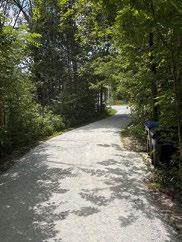





















































Tar and chip provides a natural, yet refined, appearance.
Tar and chip road surfacing provides a beautifully natural appearance and is the perfect choice for the homeowners of rural properties with larger driveways looking for a more refined “country” appearance.
Tar and chip is a more economical method than asphalt paving.
• Cost-effective by comparison.
• Provides a solid foundation, yet avoids the commercial look of shiny black asphalt.
• Available in various colours.
• A solution for potholes, dust, and washouts on inclines.
• Provides traction on inclines.
• Simplifies snow removal.
• Virtually maintenance-free.

We are a well-known, established company with a solid reputation.
Our team of skilled, experienced specialists comes with a long history of recommendations. We build relationships with our clients based on quality work and attention to detail, integrity, and a personal touch.





Bolton painter Susie Cattedra’s canvases replicate nature’s fleeting moments with care and reverence. Born in Italy, Cattedra has spent most of her life in Bolton, drawing deep inspiration from its surrounding landscapes, including her parents’ lush garden, where she photographs potential subjects; Cattedra has an especially keen eye for flora, from a sunlit petal to the play of shadow on a leaf. Whether exploring the geometrical perfection of a dahlia or the brief beauty of apple blossoms, each piece captures the awe she sees all around her. Cattedra’s artistic journey began with portrait sketches in graphite. But it was her shift to acrylics that opened a new world – one brimming with colour and movement. The transition, she says, gave her “a new appreciation for the variations that are presented to us daily.” www.susiecattedra.com




BY EMILY DICKSON

What began as a short video about the Orangeville Northmen has blossomed into a full-length documentary about the powerhouse lacrosse team — and the small town that consistently produces exceptional players and coaches.
Brothers Jake and Zack Thompson of Bumpy Road Productions produced The Northmen Way — A Lacrosse Story in association with the Northmen Alumni Association. The film hits the big screen at the Orangeville Town Hall Opera House from July 3 to 6. The two brothers — born and raised in Orangeville — have been playing lacrosse since childhood and knew the story of the Orangeville Northmen, which dates to 1978, was worth sharing.
“For such a small town, Orangeville produces a crazy number of players who go on to the professional leagues,” Jake explains, with Zack adding that Orangeville is often nicknamed the “goalie factory.” Zack says the success of the team can be attributed to the high-quality coaching juniors receive from day one, and the dedication of families like the Sandersons, who have been the backbone of the local lacrosse community for decades.
“We had people dropping off grocery bags and boxes full of VHS tapes and black-and-white photos,” says Zack, who along with his brother also spent hours in the archives of the Museum of Dufferin. “And even if you’re not a lacrosse player, you’ll still be entertained and hopefully enjoy seeing your small town on film.” Visit our Calendar of Summer Happenings on page 127 for screening information.
Theatre Orangeville presents its Summer Arts Fest August 8 to 10, featuring North (519) Best of Toronto Fringe. Then mark your calendar as the theatre’s 32nd season opens with The Norm Effect: A Three Day Adventure Through Foster’s World, readings from three plays by renowned Canadian playwright Norm Foster from September 17 to 21. Next, enjoy the witty and touching comic misadventure of two modern lovers in The Wonder of It All, on from October 9 to 26.
The second annual Dufferin Film Festival returns August 15 to 17 at the Town Hall Opera House with film screenings, meet-and-greets, a Friday Night Social and a VIP Awards Cocktail Night. “Last year’s launch went incredibly well; we sold out almost every event, the energy was fabulous, and we already have people calling and asking when tickets go on sale,” says Kelly McDowell, the festival’s founder and director. “This year we’re moving from a two- to a three-day festival. And we already have more submissions than we did last year.” Tickets go on sale in late June, visit www.dufferinfilmfest.com.

The inaugural Headwaters Medieval Faire takes over the Orangeville Fairgrounds from June 28 to 29. Enter a world of knights and princesses, and watch the horseback jousting troupe Knights of Valour. www.faires.ca/headwaters
Headwaters explodes with fairs, festivals and fun this season — get out your Google calendar or you might lose track. The Caledon Fair boasts agricultural events, Belgian horses, a petting zoo, an inflatable midway and a demolition derby from June 13 to 15 at the Caledon Fairgrounds. Caledon Day, at the Caledon East Community Complex on June 14, features Juno Award-winning band The Strumbellas and a fireworks finale.
On June 20, Creemore’s Summer Solstice Festival fills the town with a drum circle, food trucks, line dancing, a maypole and a concert by Terra Lightfoot at the Creemore Village Green.

Get an authentic and immersive firefighting experience at Camp Molly, a free, four-day camp open to girls and non-binary youth ages 15 to 18 with comprehensive training in fire suppression, auto extrication, firefighter survival and more. The camp is held at a state-of-the-art training facility in Caledon Village from September 4 to 7. Learn more at www.campmolly.ca
This year the Rotary Club of Erin’s Summerfest — packed with live music, food and children’s and family activities — teams up with the Town of Erin on Canada Day, July 1, at the Erin Fairgrounds. At the same location, toast the Erin Fair’s 175th on July 5. A tractor parade starts in Hillsburgh and makes its way to the fairgrounds where more festivities await — all this in advance of the main event October 10 to 13.
Cheltenham Day, also on July 5, has a country theme so dust off your cowboy boots for a day of community fun in this charming village. On August 28 the Peel-Dufferin Plowmen’s Association toasts their 100th year supporting local agriculture at the PeelDufferin Plowing Match at 14495 The Gore Road in Caledon. (For more info, the event title is their Facebook handle.)
Spirit Tree Estate Cidery in Caledon opens its grounds to local vendors at two iterations of its Handcrafted with Love Artisan Market — July 26 to 27 and September 27 to 28. Enjoy live music in the Cider Gardens while sampling artisanal cider and freshly baked stone-oven pizza.
For almost a decade, Shelburne’s Streams Community Hub has been a driving force in making the arts come alive for young people. Now, the charity is seeking small donations to keep their organization sustainable. The One of 1000 campaign aims to find 1,000 people willing to give just $10 a month. “That small gift will keep our doors open so more kids can create, connect, find safety and grow in confidence,” says Juli-Anne James, who along with her husband, Andrew, founded the hub. Visit www.streamshub.org.

Did you know there was once a Fisher-Price factory in Orangeville? Learn more about that and other childhood nostalgia at the Happy Days exhibit at the Museum of Dufferin, on until December 21. The exhibit presents a curated collection of old-fashioned toys and classic games, and other memorabilia.
Catch the eye-popping Bubbleology show at the Peel Art Gallery, Museum and Archives on August 7 featuring Ontario’s own Miss T the Bubble Queen, known for doing impossible things with bubbles of all shapes and sizes, including a bubble cube, a tornado in a bubble and a person inside a bubble!
Then it’s all aboard for a high seas adventure at PAMA’s Pirate Workshop on August 21 where young buccaneers will be regaled with pirate stories, games and activities including a museumwide treasure hunt.
Fall marks the return of Culture Days events across the region. In Caledon, that means three weeks of free, hands-on experiences, shows and events that shine a light on Caledon’s creative and cultural vibrancy. Last year the festival ranked in the Top 10 across Canada. It kicks off on September 27 with the Caledon Creative Arts Festival, followed by Caledon CultureFest on October 4, and the Caledon Studio Tour from October 4–5. Keep an eye on culturedays.ca for more events across the region. On October 4, don’t miss Belfountain’s bicentennial bash marking 200 years with a street party and parade, live entertainment and classic cars.
If you’re looking for a holiday that doesn't require crossing any borders, or better yet, doesn’t require much travel at all, consider checking in to a local spot for a break (and clean sheets). Bruno Roldan and Jacqui Liberty’s new

The Liberty Inn in Caledon boasts five chic suites — bathrooms are lined with handmade tiles made by Liberty (for more on Liberty see Meet the Maker on page 89). The property also features an intimate Nordic spa in a walled garden. Take advantage of summer dining, wine tasting, spa and golf promotions at Hockley Valley Resort in Mono. For classic country hospitality, visit Hillsburgh’s charming Tailwinds Bed & Breakfast or Grand Valley’s Sandhill Farm Bed and Breakfast
LARRY KURTZ & THE LAWBREAKERS
The Orangeville Blues and Jazz Festival is done and dusted for another year, but founder and musician Larry Kurtz and his blues band The Lawbreakers — James Legere, Scott Bruyea and Sam Carothers — have a new album to celebrate. Take a Ride was released in May and the video for “Headwaters Hill Country” is available on YouTube. A sample lyric: “Orangeville’s got the blues. Shelburne has the fiddles. Grand Valley has the river, running, riding down the middle … Headwaters hill country where the land sets you free, from Orangeville to Mulmur, it’s calling out to me.”

Bringing Joy Through Jewellery





















BY DAN NEEDLES • ILLUSTRATION BY SHELAGH ARMSTRONG
AS I TRY TO “AGE IN PLACE” THESE DAYS, juggling a little bit of all the things I used to do, it strikes me that my chief function now is to fix things. I am still a writer, but a big part of my day is given over to repair, replacement and renovation not just of my own possessions but anything that is dropped off at the gate. I also do quack veterinary work and some plumbing.
Repair shops still exist for the 15 internal combustion engines I maintain here on the farm, but they all have stiff minimum charges and need three weeks to get around to anything. If you need it fixed now, chances are so does everyone else. So, I am constantly thrown back on my own resources.
Each of us has that one thing we do well, but as the years go by, the need for that particular skill likely will diminish and even disappear completely. My great-grandfather was a successful hatter on Bond Street in downtown Toronto and travelled the world looking for exotic feathers to weave into his creations. But by 1920 women had lost interest in hats and his business closed. He spent his declining years keeping up with his young second wife’s determination to redecorate their house on St. George Street. By the time he died, his lungs were shot from inhaling plaster dust. He hadn’t thought about a hat for 20 years.
There are some skills that never go out of date. Detecting an electrical short in a machine, water witching, jump-starting a newborn lamb or pruning roses fall into that category. These are not highly paid skills, but they do command respect and often produce non-monetary returns like a rhubarb
pie left on the doorstep. Vehicle maintenance has become a lost art for the younger generation. As the price of tire repair doubles and doubles again, my children, their cousins and friends bring all their minor problems here.
Last month I started out one morning to repair a broken chain on my manure spreader. But I was interrupted to install a replacement taillight on my
She lived for another two years, walking around the shop and glaring at me with that raised eyebrow, a constant reminder of my limited gifts as a surgeon, electrician, plumber or anything else.
niece’s little American compact car, for about one third of the cost she would have paid if she took it to the dealership. However, Amazon does not send any car part to you with an electrical connector that matches the one you have on the car. So there was a delay while we rewired that part. In the meantime, her car was joined by two other vehicles that needed their snows switched for summer tires. And an oil change if I could squeeze it in. A sheep required assistance with a difficult lambing. Around three in the afternoon my wife yelled from the front lawn that her lawn mower had a flat tire and what was I making for dinner?
“For Pete’s sake,” exclaimed my niece. “Let the poor old man have a $#&^% nap!”
There are some jobs you just can’t get anyone to do anymore, like sewing up a chicken after it’s been in a fight. Fortunately, the law still allows you to go to the assistance of any animal in your care, without the supervision of a licensed practitioner. I had a hen that got scalped by her best friends one time. (Things get pretty tense after a long winter in a henhouse.) I did my best to put her back together, but I made the stitch above her left eye a bit tight. This gave her a permanently skeptical expression, like Norma Shearer. She lived for another two years, walking around the shop and glaring at me with that raised eyebrow, a constant reminder of my limited gifts as a surgeon, electrician, plumber or anything else.
All the experts agree the best defence against aging is to maintain a sense of purpose and stay useful. Retirement is a dangerous game because it suggests you should give up doing what has been getting you out of bed in the morning for the last 40 years. Maybe you can’t keep doing that brain surgery you found so absorbing in your working career, but you have to find something else to keep the neuron pathways open and supple.
I recommend an online course in small motor repair. It will do more than anything else to keep you out of the nursing home.

Michael Adams, a longtime observer and chronicler of Canada -U.S. relations, muses on Canada’s recent election, our strained relations with our neighbour to the south, and whether Trumpism is more or less a threat to our nation than a decade ago when Adams wrote a book on the topic.
BY EMILY DICKSON • ILLUSTRATIONS BY RUTH ANN PEARCE
It has been nearly a decade since pollster, survey researcher and writer Michael Adams posed a pointed question in his book Could It Happen Here? Canada in the Age of Trump and Brexit. It was written in 2017, while President Donald Trump’s first presidency was underway. Adams draws on years of surveying Canadians and Americans to determine whether Canada – a typically placid and welcoming nation – could one day see a right-wing populist government come to power.
“Could it, we ask ourselves in dog parks, at dinner parties, or in the stands of local hockey arenas, happen here? Will we ‘catch Trumpism’?” Adams, who divides his time between Toronto and Mono, wrote.
He was well poised to dig into what Canadians were thinking at the time, having dedicated his career to asking and answering these kinds of questions. Adams co-founded Environics Research Group in 1970 when he was a graduate student at the University of Toronto.
Over the years, Environics partnered with and cofounded a number of sister companies, including the big data firm Environics Analytics in 2000. In 2003 he wrote the best-selling Fire and Ice: The United States, Canada & the Myth of Converging Values. In 2006 he founded the not-for-profit Environics Institute to share with the wider public survey research on Canadian politics, society and culture. The institute conducts in-depth public opinion and social research on a wide range of social and geopolitical issues shaping Canada’s future.
In the years since Could It Happen Here? was published, Canada has faced new challenges both domestically and internationally, including a global pandemic, the Russia-Ukraine and Israel-Hamas wars, an affordability crisis and, most recently, a tariff war that has left many Canadians feeling bewildered and betrayed by a longtime ally. Many of the questions Adams has been pursuing for years were no doubt front of mind for many Canadians as we headed to the polls in April.
In early May, I sat down with Adams at his home in Mono to see if he had found the answer he was looking for back in 2017 or if the landscape had changed so much that it was time for a new line of inquiry.
EMILY DICKSON: We have so much to discuss, but first, I am keen to know your thoughts about the recent federal election. To what degree was it a referendum on how Canadians want our government to deal with the policies of U.S. president Donald Trump?
MICHAEL ADAMS: A year ago, the Justin Trudeau government was so unpopular that Conservatives were ahead in the polls, and a Tory win was almost seen as inevitable. Governments tend to last ten years. They make decisions; half the people like what they decide, and half don’t. But after about a thousand decisions you have got a lot of people who don’t like something you’ve done, and you become unpopular and end up being defeated. That’s our democratic system. It is a pendulum back and forth.
But when Trump got elected again, and started with the tariffs and musings about making Canada the 51st state and calling Trudeau the “governor of the 51st state,” Canadians started thinking “Wow, we’re in his crosshairs,” and we became very anxious. Then out of the blue comes Mark Carney, former governor of the Bank of Canada and the Bank of England, senior public servant in the Department of Finance and so on, and suddenly Liberal fortunes turned. So that was the Trump card, you could say, of the Liberal renaissance and eventual victory.
So far Trump hasn’t said anything disparaging about Carney; he may even respect him as a guy who knows about money. That is what Trump seems to like, so the fact that Carney has a history in the public and private sectors, maybe Trump will say, “Well, I can do business with somebody who knows how to do deals.”
ED: Could It Happen Here? was written during Trump’s first presidency, which you described as “unthinkable” at the time. Did you expect him to win a second time?
MA: I knew that America was divided 50-50 and that populism has a long history in the United States. It also has a pretty good history of sexism, of patriarchy and of racism. It’s also a country that has been trying to move in a direction of progressive egalitarian policies and attitudes since Franklin Roosevelt’s New Deal in the 1930s, and especially the idealistic 1960s – but that period generated a backlash in line with
Isaac Newton’s third law of motion, that every action generates an equal and opposite reaction. So advancing the cause of Black people means that some white people are going to feel their jobs if not their status are under threat. So since the 1970s we have seen the politics of backlash in the United States. Ronald Reagan’s election in 1980 signalled the change in direction. I published American Backlash in 2005 that told this story.

Feminism as well – there’s always been a backlash. The year in which Canada put gender equality in its new Constitution in 1982 was the same year that the Equal Rights Amendment in the U.S. lapsed for failure of support among enough states to make the change. So you could always see in America a backlash to return to the way things used to be. We started out conservative and they liberal. Now after two centuries we have changed places. Our Constitution is a living constitution – it changes over time. But in America, many conservatives think the constitution should be chiselled in marble and they should only be doing what the founding fathers intended. Well, of course, if you stuck with the original constitution, women couldn’t vote, Black people couldn’t vote. If you go back to originalism, none of the progressive policies would have been made. When you do my kind of work, which is to survey people’s opinions
and values, and then you have to put it in a historical context, a comparative context, it allows you then to understand or try to understand how the two cultures – seemingly indistinguishable to most people on the rest of the planet – look. But in fact we are quite different.
We are “unarmed Americans with health care” is the joke. But if you look at the data, you realize in fact that it’s much deeper, and it’s been going on for at least 50 years since Canada began modernizing in the 1960s.
ED: Does Canada have the political and economic resources to manage the fallout from the tariffs imposed by the U.S.? What are your predictions?
MA: I suspect that we will negotiate with the Americans some new agreement that Canadians are sort of happy with, and Trump can position as a personal victory – whether it is or not – and then he’ll move on.
Since he’s taking on the entire world, what he’s doing with China is infinitely more important. What we sell to the Americans, consumers don’t see. What the Chinese give the Americans is filling Walmart with the trinkets that they like to buy, trinkets that China can make at a 10th of the cost that American producers could.
Even if the U.S. could revive their industrial economy, they’re never going to be able to make something that China can sell for a buck at Dollarama because the American version will be $10 and the American consumer isn’t going to pay that. These are the rules of modern market economics; the theory of comparative advantage is the one that rules. Some countries are very good at doing this, and other countries are good at doing that, and then they trade with each other. But Trump is trying to turn back history to 18th-century mercantilism, and he’s going against the globalization that is inevitable in our world. And trying to preserve an economy that existed 100 years ago –the world no longer works that way.
ED: What effects of this tariff war are you seeing and sensing here? How can these national and international events play out on the local level?
MA: American consumers are going to be affected by tariffs. Investors, people trying to put money into businesses, will also be affected. But consumers who are buying goods made abroad that are cheap … they will be the ones to suffer.
Here in Canada what’s going to be affected is the agricultural economy, oil and gas in Alberta and the West, agriculture in Saskatchewan, and cars and automotive parts in Ontario. In the 1960s we made the Canada-U.S. Auto Pact. We decided to have an integrated automotive industry. Then the Auto Pact evolved into the Free Trade Agreement with the Americans in 1989 and the North American Free Trade Agreement when Mexico joined in 1994.
Canada’s bet was that we could have an integrated economy but stay sovereign in developing our own policies with what we do with the tax money we get from Canadians. So what do we do with it? We give ourselves universal health care, good public education, equalization. In the last few years, we have added dental care, pharmacare, more money for daycare and so on. These are all distinguishing policies in Canada –closer to Europe – and are a direction that the U.S. is not going toward. Trump wants to go in the opposite direction.
ED: In the last four U.S. elections, voters bounced from Obama to Trump to Biden to Trump. You wrote that “if the U.S. can shift gears so radically, Canada must be vulnerable too. Or is it?” With a fourth Liberal term now underway, do you think Canadians are interested in shifting gears? Or simply staying the course?
MA: Well, we are a country of mutual accommodation and America is a country that has a fight to see who is right. Our histories have been quite different … Americans have at various
times been annoyed at Canada or looked at Canada and thought “boy couldn’t it be the 51st state?” And Canadians have consistently resisted it. There’s a long history of this going back to 1776 when we might have been the 14th colony to join the new American union.
But it was a surprise that tariffs were put on Canada at such a high level, even though we had renegotiated NAFTA under Trump, and he had apparently been happy with it when we did that in his first government. But then he does it again with his re-election and then we get this musing about the 51st state.
So that really irritates Canadians who normally are not nationalistic … I mean we’re patriotic when it comes to hockey and fighting Nazis, but basically we are a collection of provinces with people of mixed loyalties which have jurisdictions in their own areas – and they’re very jealous of those jurisdictions.
There is a sociological idea called “the strength of weak ties.” We’re not really deeply connected to each other; we don’t have that kind of ethno-racial nationalism that comes from a sense of “we” given that “we” is so diverse. We just don’t have that idea that “we’ve been doing things like this for the last thousand years” because we’ve been busy accommodating each other as long as Europeans have been here.
ED: In Could It Happen Here? you talk extensively about immigration, and describe Canada as “a country more positively invested in immigration than almost any other developed economy in the world.” Since you wrote this in 2017, more than 2.5 million immigrants have come to Canada, with 1.4 million in the last three years alone. What do recent surveys by the Environics Institute show about people’s current attitudes toward immigration?
MA: We had assumed that we were on autopilot with bringing in immigrants – that we could pretty well allow huge numbers in. That included international students who were

enrolled in programs, but never went to classes – instead, they were working. Their program was not giving them an education – it was giving them low-wage work, which displaced some people who had been here for three or four generations. Again, it is the idea of competition for jobs.
That and other abuses of our robust immigration system led to what Environics, and other research companies, found was a backlash against immigration.
But there is a difference between our attitudes to immigration and our attitudes toward multiculturalism because we have not seen a backlash against the arrival of particular groups of people, just the numbers our economy can accommodate.
ED: In the last decade or so, there has been a swing to the far right around the globe, including in Europe. Is Canada also “at risk of coming down with the malaise affecting other Western democracies,” as you’ve put it, despite the new Liberal minority under Prime Minister Carney?
MA: Everything that happens elsewhere happens here. It’s a matter of scale. So Chicago has 800 murders a year. And we have murders in Toronto. We’re about the same size, about 2.5 million people, but we have 80 murders.
We have 80 per cent first- or secondgeneration immigrants in Toronto –theoretically they should be fighting each other and fighting the wars that were fought back home. If you want to debate that Canada is the same as everywhere else, you can make a powerful statement by pointing to the terrorist incident in Quebec City, or the incident in London, Ontario, that are religiously or racially based murders. Everything elsewhere does happen here. It’s just the scale that is so different, the quantitative difference of many fewer instances in Canada of terrorist incidents, homicides, gun violence and mass shootings, and that makes a huge qualitative difference in the lives of Canadians.
Take the “woke agenda” – we did a
toward reconciliation with Indigenous people. There has been no diminution of Canadians’ thinking that we ought to recognize the impact of residential schools, of First Nations, kids being away from home and not allowed to speak their native language, the forced assimilation and how wrong that was – and that we need to correct it. There is undoubtedly a backlash to reconciliation, but it is muted. When a member of Parliament makes some kind of racist or anti-Indigenous statement, the leader of their party dismisses that person. They shut them down and say this is unacceptable thinking and speech in Canada.
The topic of diversity, equity and inclusion, this is of course controversial in the United States. The Trump administration is saying “you have got to get rid of these programs,” and they’re even attacking universities that have these types of programs, for trying to encourage historically marginalized minorities to make up for the fact that there is a lot of racism – and that some kids in high school are not going to have much of a chance. So you get universities with huge endowments trying to help people. But in America the move is to get rid of this because it is discrimination, in a sense, against the historically privileged people. So we wonder, is this backlash being felt out in the wider society? And overwhelmingly Canadians are saying no, this is a good thing to do.


And we’ve asked people, “Do you feel you have been a victim of a DEI program?” And younger white men are no more likely than anybody else to say they have been discriminated against by these programs. And the numbers who say they feel such discrimination are seven per cent, ten per cent. They’re very small. But among what in America is a huge chunk of the population, especially less educated younger white men, who feel the culture has declared war on them, they express their frustration by voting for Trump and Republication candidates.
ED: The Institute for Canadian Citizenship and the Conference Board of Canada found in a 2024 study, The Leaky Bucket, that one in every five immigrants who land in Canada will decide to leave within 25 years. And over a third (34 per cent) of onward migrants will leave in the first five years. Why do you think new Canadians are giving up on “the Canadian Dream” of a better life?
MA: We don’t offer the rags-to-riches story – we don’t have a Las Vegas. We don’t have a place where you go and roll the dice and, maybe, win.
When you’re young you want to dramatically succeed – at least some people do – and America is the dream factory. We’re totally overwhelmed with American movies and one thing they portray is a very affluent society.
When people move to Canada, they realize that they can be comfortable. But if they really aspire to fabulous materialism and Hollywood hedonism, their chances are more likely if they become the one per cent in the United States. So if you want to go to Mars, you go to the U.S. If you’re happy with just going to Cape Breton for your holidays, then you stay in Canada.
This interview has been condensed and edited.
Emily Dickson is a writer and editor who lives in Orangeville.
Every year in our winter issue In The Hills honours some of the Local Heroes among us for their selfless commitment to our communities or for making us proud on the national or international stage.
Do you know someone who lives in Caledon, Dufferin, Erin or Creemore, and who has gone above and beyond in every way?
Email a brief description of your nominee to heroes @inthehills.ca by August 1, 2025. If your nominee is selected, we’ll let you know!


TONY
BY DON SCALLEN
• PHOTOGRAPHY BY TONY SPENCER
From the second floor of his rustic Mono cabin, Tony Spencer steps out onto the roof of the mudroom below and into a wildflower meadow carpeted by grasses and sedums and spangled by wildflowers. Bees and flower flies buzz in the sunshine, sipping nectar and harvesting pollen. From his elevated perch, Spencer has a bird’seye view of the more conventional ground-level gardens he has coaxed from the sand and gravel dropped on his property by ice-age glaciers. It’s summertime and Spencer is exultant. His green roof is thriving. He compares it to a “coral reef, aglow in fantastical shapes and glorious technicolour.” Installed in 2022, Spencer’s bold experiment has proven to be an early success. His green roof has already been celebrated by the gardening world, winning a Landscape Design Award of Excellence from the United States-based Perennial Plant Association. When he makes presentations to gardening and horticultural groups, images of his green roof in full summer glory evoke exhalations of wonder.
A bird’s-eye view of the Mono cabin reveals the thriving “wildscaping” that, when done properly, can protect and extend the lifespan of rooftops.
ON OUR COVER: By late June, the first wave of sedums is starting to flower while perennials and grasses become visible on Tony Spencer’s green roof.



UPPER LEFT: Extending over the cabin’s porch area, the green roof is accessible from the second floor.
UPPER RIGHT: By summer, an eye-catching matrix of sedums is in full bloom. Taller perennials such as Achillea ‘Terracotta’ emerge from the mounds, providing a succession of changing colours. To ensure continuity of bloom, Spencer has selected plants that flower at different times.
LEFT: Spencer, aka “The New Perennialist,” surveys the plant life in late August.

Spencer is a writer with a résumé that includes working at an advertising firm in Toronto and later as a freelancer. While in Toronto, he also achieved modest fame playing guitar in an instrumental band. But as a lifelong gardener, he longed for a larger canvas to work with. His wife, Troy, was willing to give country living a try, and she was besotted by the prospect of swimming in the deep pond that came along with the property. In 2014 Spencer and Troy moved in. Spencer rebranded himself as “The New Perennialist” and, shortly after relocating to Mono, began to transform the spaces around the cabin and pond into naturalistic gardens. (See “Wildscaping,” In The Hills, spring 2021.) Before winning the award for his rooftop garden, he won
a 2020 PPA Honor Award for his pond garden, an achievement that bolstered his reputation in gardening circles.
A self-described “puckish ringleader for the naturalistic movement,” Spencer has become a gardening influencer, blogging about plants, gardens and naturalistic landscaping for more than 90,000 followers on social media.
He refers to his gardening philosophy as “wildscaping,” a naturalistic approach that uses “plant-driven landscape design to create and sustain dynamic garden spaces, filled with beauty and wildlife, to rekindle our relationship to the natural world.” He is currently writing a book for Timber Press, the well-known publisher of books about gardening, about this philosophy, how it has guided the creation of his Mono gardens, and how it has helped him develop relationships and share ideas with others active in the naturalistic movement.
Spencer’s wildscaping invites native plants to play a key role in his gardens, but he is not driven by the “strictly native” doctrine. Rather, he uses a diversity of plants that combine artfully to nurture the soul and the environment with beauty, bees and butterflies. Dynamism is a key element of his approach. Gardens evolve, plants reveal their character and acceptance of place, and combinations of plants change organically.
Spencer’s decision to expand his naturalistic garden design to a rooftop was perhaps inevitable, for he boldly seeks new gardening frontiers. An addition to his house sparked his passion. With a green roof in mind, the addition was completed in 2017. And in 2022, after intensive research into practicalities and plant selection, his roof garden became a reality.
His is known in the landscaping trade as an “extensive green roof,” or
EGR, which is characterized by a thin (10–15 cm) layer of “soil” or, more precisely, “growing media” consisting of crushed brick and organic matter. Spencer’s green roof has a 10-centimetre base and five tapered mounds topping out at 15 centimetres. A height variation even this slight introduces habitat complexity that Spencer’s plants respond to.
(Note that the term “extensive” is somewhat misleading, though it is the standard trade term for green roofs with shallow growing media. Some EGRs, like Spencer’s at about 72 square metres, are quite small. The term for a green roof with growing media deeper than Spencer’s – from 20 to 75 centimetres – is “intensive green roof,” or IGR. This deeper “soil” allows the planting of shrubs and trees.)
The crushed brick that serves as “soil” on Spencer’s roof is airy and surprisingly light. It allows water


and air to easily reach roots while the added organics nourish them.
Spencer acknowledges that his green roof, though outwardly naturalistic, is an artificial construct. The plants and growing media are underlain by a sophisticated layered structure installed by ZinCo, a German green roof company with an office in Ontario.
A dimpled layer made of recycled plastic captures rainwater and holds it for uptake by plant roots. Excessive water overflows into drainage channels that carry it to rain gutters and downspouts that direct the water into a rain garden and a ground-level bioswale, a planted area designed to absorb runoff and filter out pollutants. A waterproofing membrane protects the underlying roof from damage.
Spencer looked to alvar habitats for guidance and inspiration. Alvars are rare habitats found in only a few places in the world, including
Ontario. These extreme environments, characterized by shallow soils over limestone or dolostone bedrock, are often saturated by rain and snowmelt in spring, then baked by sun in summer. These conditions are hostile to many plants, but nature finds a way. Many interesting, often beautiful, plants flourish in alvars because the extreme conditions eliminate competition from larger, more robust species.
EGRs like Spencer’s also have shallow soils exposed to extremes of sun, wind, temperature and moisture, meaning that alvars offer a useful analogue to guide planting. As Spencer says, “In our climate-changed world, the garden imperative is to aim to be ready for almost anything. Thus far, our alvar green roof is rising beautifully to the challenge.”
But using only alvar plants isn’t Spencer’s goal. Some native alvar plants make the grade, but other plants, not necessarily native to alvars, are also incorporated. Besides, many alvar plants are simply not
available in the nursery trade. EGRs are, in Spencer’s words, “notoriously unpredictable and site specific.” Flexibility in plant choice is called for and governed by availability and by the response of the plants to specific conditions. This is where the dynamism Spencer espouses comes in. He watches how the plants grow and makes changes when necessary.
Three years on, Spencer has watched two lovely grasses assert their presence in his rooftop garden. Prairie dropseed, a native notable for its fine foliage, is a low-growing “bunch” grass (a grass that doesn’t spread rampantly via stolons beneath the soil surface).
The other is a type of little bluestem grass called Ha Ha Tonka, named after a state park in Missouri. For Spencer, this grass is a favourite, especially as its wispy blue-green leaves catch the rays of the setting sun.
Flourishing among the grasses are wildflowers. One, nodding onion, is an Ontario alvar species offering a cautionary note: rooftop gardens,
like their ground-level counterparts, must be tended. Spencer has found this native onion is a little too at home on his rooftop, for it seeds prolifically and threatens domination. He now deadheads the onions in the fall before they can drop their seeds.
Another wildflower that has done well on Spencer’s rooftop is rough blazing star, its spires tufted by purple blossoms that attract butterflies and rise above the grasses in summer. Selections of non-native Russian sage and questionably native yarrow (Achillea) are pollinators’ favourites and add colour. Spring-blooming prairie smoke and summer-blooming hairy beardtongue, both Ontario alvar natives, also grow on the roof.
To ensure continuity of bloom, Spencer has selected plants that flower at different times. This means that from spring through early fall, he can enjoy the cheerful and productive buzzing of honeybees, hoverflies, bumblebees and wasps.
He isn’t aware of any other green

roofs in Headwaters, but his project has relations all over the world. Europeans have been building green roofs since at least the 1960s, and Germany is a leader in the green roof movement.
Other northern European countries are also well ahead of Canada and North America in adopting green roofs. But we’re catching up. The City of Toronto, for example, requires developers of commercial, residential and industrial buildings whose floor space measures more than 2,000 square metres to devote some space to green roofs.
The environmental benefits of green roofs are driving this trend. The plants and the green roof-growing media capture rain. Some of this water is released back into the atmosphere via transpiration from plant leaves, but green roofs also play a role in slowing the runoff of rainwater into overtaxed urban storm sewers.
And perhaps counterintuitively, green roofs extend the lifespan of rooftops. Properly engineered, they protect the roof structure from
ABOVE: Spencer’s wife and partner, Troy, stands among late-season yarrow and nodding wild onion beginning to go to seed. Tony dead-heads the onion flowers before they go to seed.




moisture and ultraviolet radiation. They also serve to cool the interior of buildings in summer, decreasing the need for air conditioning and, in winter, provide extra insulation against the cold.
EGRs are generally the type installed to deliver these benefits, topped with shallow growing media and easy-tomaintain plants such as sedums. Many are placed high and out of view of the public, for their chief function is to enhance environmental health, not the psychological well-being of people.
But green roofs are diverse. Spencer’s roof, for example, not only benefits the environment, but also supports bees and butterflies. Its beauty and vibrant growth throughout the season delight Spencer’s aesthetic sense. Green roofs are also beginning to be used to grow food in Canada, though the most productive of these are closed systems using greenhouse technology (see sidebar below).
Tyler Brown, a project co-ordinator for NAK Design Strategies, a Toronto

landscape architecture and urban design firm, works with developers, architects and engineers to plan green roofs in the GTA. Some, like a green roof currently in the works for a retirement home, fall into the purely utilitarian category of EGRs. It was designed not as an aesthetic showpiece or wildlife habitat, but primarily to reduce heating and cooling costs, and to manage rainwater. But other projects Brown works on are designed to satisfy different needs, among them a rooftop
garden atop a college residence. It will become a herb garden.
Among the more frequent green roof designs Brown is involved with are “amenity gardens,” increasingly being added to new condo developments as selling features. These are elevated walkouts analogous to backyards, with abundant plantings, barbecues and seating areas. Metre-deep soil in fixed planters enables shrubs and trees to grow, offering privacy, windbreaks and habitat for birds.
Tony Spencer’s experience with rampantly self-seeding wild onion highlights that green roofs, like all gardens, require maintenance.
Tyler Brown puts it bluntly: “If the property owner neglects the roof after installation, the plants die.”
Most of the typical chores associated with ground-level gardens, including managing aggressive plants, watering when necessary and weeding, also apply to green roofs. Brown considers the debacle that could unfold should a single seed of tree of heaven waft up and onto a green roof. This exotic Asian species is renowned (notorious?) for its ability to grow exuberantly in the cracks of urban sidewalks. Left untended on a green roof, a tree of heaven would soon compromise the roof’s layered structure.
Nevertheless, green roofs should be no more difficult to care for than typical gardens, and the plant selection and depth of the growing media can be adjusted to make that care more manageable.
The concept of “biophilic design” aspires to create ways to connect people with nature in the urban
In 2020 Lufa Farms, a Quebec-based company, opened the largest rooftop greenhouse in the world. Perched atop a former Sears distribution centre in Montreal, it covers more than 15,200 square metres and is planted with tomatoes, lettuce, onions and other veggies. Lufa has four other rooftop farms in the Montreal area including their newest, a nearly 11,800-square-metre facility on the roof of a Walmart in the city’s Ahuntsic-Cartierville district.
Growing produce in rooftop greenhouses has several benefits. An obvious one is expanding the traditional function of roofs to include food production. In densely settled urban areas in particular, roofs offer agricultural space not available on the ground.
Rooftop greenhouses also produce food where it is consumed, eliminating transportation costs

and the environmental drawbacks associated with transporting food to cities via trucks, trains and airplanes. Hydroponic growing techniques further reduce environmental impacts by recycling water within a closed system, and captured rain and snowmelt help top up water needs. In addition, greenhouses permit year-round production.
Another plus is Lufa’s focus on biocontrols to manage pest outbreaks. Synthetic herbicides and pesticides are avoided. Instead, predatory insects are employed when necessary. Tyler Brown of NAK
Design Strategies toured one of Lufa’s greenhouses and describes the process: “They use ‘sacrificial plants’ at the margins of the greenhouses. These include nasturtium and some pepper varieties that are highly appealing to insect pests, serving as an early warning system and as a focus for the release of biocontrol agents like ladybugs.”
Open-air rooftop vegetable gardens are also becoming more common. Again, in Montreal, Brown visited a community centre that manages a food program for vulnerable people. On the roof is a small
environment. This can be as simple as creating parks and planting trees. It can also mean water features, postage stamp-sized woodlots called “Miyawaki forests,” and green roofs like Spencer’s.
Biophilic design offers significant health, environmental and economic benefits to urban dwellers by melding nature with the built environment, something Spencer’s green roof does admirably. As he says, “Our log cabin home is once again a living part of the living landscape.”
Many residential suburbs built in the 20th century offered homeowners space to garden, plant trees and relax in spacious yards. Those opportunities are diminishing as the density of contemporary developments increases. Tiny yards, or no yards at all, are becoming the norm. The reasons are clear. Building densely and upwards is perceived as a way to mitigate sprawl and, by boosting the number of people in a given area, to make urban transit more viable.
But something is lost in the bargain. Many of us love nature and many of us love to garden. We are making
a significant long-term mistake, with ramifications for our physical and mental health, if we densify without acknowledging these needs. With about 10.4 million people projected to live in the GTA alone by 2051, biophilic design will become increasingly important. As Spencer says, “We have a lot of catching up to do in Ontario to include nature as part of our residential experience.”

Mono Plaza, Unit B2 633419 HWY 10 Mono ON 3km North of Or 519-941-7208 | 1-800-668-2087

Green roofs are one way we can soften the intense urban development that will prevail as we attempt to accommodate an ever-growing population. Because of the benefits offered by various types of green roofs, there will likely come a time when they will become standard features in our communities. Futuristic thinkers like Tony Spencer are leading the way. His might be the only green roof in Headwaters in 2025, but that is sure to change.
Don Scallen is the author of Nature Where We Live: Activities to Engage Your Inner Scientist from Pond Dipping to Animal Tracking. Read more of his observations on local flora and fauna in “Notes from the Wild” at inthehills.ca.
At Lufa Farms’ rooftop greenhouse in Laval, Quebec, city water is recirculated, but it also has the capacity to capture rain. The farm yields 6,055 kg of vegetables every week.
open-air garden that provides about 12 per cent of the produce needed for the program.
Unsurprisingly, open-air rooftop vegetable gardening comes with challenges. These gardens are prone to all the slings and arrows of traditional ground-based agriculture, including insect pests, weeds and the vagaries of the weather. And of course, they can’t offer the same year-round production as greenhouse facilities. It is unlikely open-air rooftop gardens will ever be able to produce more than a small fraction of the food we eat. But perhaps that’s not the point. Like small allotment gardens in dense urban settings, they offer the physical and psychological rewards of getting hands dirty and tending the soil. They can show city dwellers – especially children – where their food comes from and connect people to the rhythm of the seasons. And as Brown says, these gardens “provide opportunities for community celebration at harvest time.”



VISIT OUR SHOWROOM!
Featuring a large selection of windows and entranceways
519-941-7208 · MONO PLAZA Unit B2 633419 Hwy 10 Mono 3km north of Orangeville
AUTHORIZED DEALER
























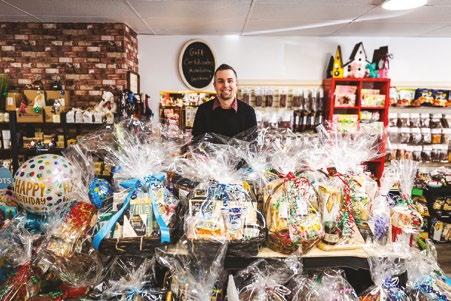



An ode to a body of water that nurtures life and soothes the human soul.
BY ANTHONY JENKINS
The Lake is still, serene and nameless, a boot-shaped, five-acre former quarry flooded 20 feet deep and hidden from the road by a thick screen of trees.
In the mornings, spring and summer and fall, at sunrise, The Lake breathes forth writhing mists an unsubstantial metre high. These hang like a curtain, catching angling early morning sunlight and, depending on the season and the hour, turning translucent shades of rose through amber. They do so whether anyone witnesses this or not.
The Lake is filled with many small fish: perch, bass, crappies, bluegills. Frogs abound on its margins, where deer, coyotes, skunks, raccoons, fishers, martens and a bobcat – almost certainly a bobcat – come to drink. Painted turtles sun themselves on its
flat, bordering rocks. A grumpy heron sees the nameless lake as his exclusively, sharing its waters grudgingly with a mated pair of cormorants, an odd ménage à trois of mallards, a slovenly muskrat, a rather elegant otter and, from mid-October through early December, large, seemingly endless flotillas of transient Canada geese.
The Lake is a home.
The Lake has a beginning. For those who care to check, it began in our lifetime.
Before becoming a lake, it was an arid expanse of granite, sparsely garnished with topsoil, tough grasses, brush and small, struggling trees. For a few short and greedy decades, the granite was harshly quarried: surveyed, drilled, wedged, cut, jacked, hoisted, washed, weighed and transported elsewhere –
occasionally for quite some distance –to become kitchen countertops, fireplace surrounds, mantels and cladding on impressive buildings.
Water from deep in the earth – from five natural springs, it is said – ended the quarrying. Water filled the big slab-sided hole. Cold and clear, the water, over time, nurtured gardens of vegetation beneath and around the lake it would become. Water sometimes overflowed the quarry’s banks, licking at the mounds of the abandoned granite mine’s broken leavings, and moistening the soil, the grasses, and then small trees that accumulated there. Those coniferous and deciduous trees, now grown to maturity, deeply shade and reflect on the surface of what the former quarry has become. A lake. A nameless lake.
Birds nest in many of those trees. Small raptors occasionally perch in the trees’ undulating upper branches, resting, watching, waiting for unwary fish of sufficient size. Fish were surely introduced into The Lake, but when and by whom is uncertain or unknown. It is difficult to say, but The Lake may be at its most beautiful in summer, its waters warm and its surroundings green. Birdsong carries over it. In summer, the reeds, cattails and water lilies at its margins burgeon and are in full flower. Fish take insects in the shadows of its overhanging trees. The resident cormorant couple dive for fish, alternately and for extended periods, but always surface near their partner. They are bonded after spring meeting and mating. An osprey, its oversized, sloppy
nest housing a brace of ungainly grey chicks, hovers effortlessly over The Lake, swooping down from time to time to seize fish. The appetites of its growing family seem boundless.
The Lake begs for awe in summer. And fishing. And a swim.
Fall, of course, brings crisp air and colour to, and around, The Lake. And it brings geese.
The geese, a great many Canada geese, arrive as Thanksgiving comes and goes, and the trees turn colour, then lose their leaves. The geese arrive en route to somewhere else. They tarry on The Lake’s surface to rest before continuing their annual journey south.
The Lake is not far removed from another lake, a very big one with a well-known name, which the geese must fly over, heading south. The Lake is a very good place to rest beforehand.
The Lake nestles in an area abounding, in fall, with recently shorn cornfields. The hungry travelling flocks of geese graze on the rich stubble. Satiated, they rise into the air, gather into familiar delta formations, and fly high among the clouds over The Lake, whose shape is familiar to them through the genetic memory of generations of their ancestors.
The birds describe a large high circle, then angle downward toward The Lake in V-formation, honking loudly.
Their noise has instruction and meaning. The flock, the conjoined flocks flying together, doesn’t land as one, but touches down in large staggered batches, honking and braking, their big wings outstretched. Momentum carries them to choreographed, waterski-style stops on big webbed feet. Once landed on The Lake, the geese move to its margins, clearing the watery runway for the next group. Extended family groups or groups from defined locales subtly stick together while becoming part of the gathering greater flotilla.
The Lake provides a resting place and refuge for the geese. Predators cannot reach them. The geese float idly on its surface for a day, with periodic departures and returns for further feeding nearby. Unseen in the darkness of the night, they are intermittently silent, then raucously noisy.
Slicks of small white pinfeathers
shed and blown by breezes form a dirty halo caught at the base of the reeds ringing the edges of The Lake. There, a lone, lean coyote sometimes waits, pacing, frustrated. His meal floats out of reach by about 15 metres –sometimes less – on the water. The geese exhibit studied indifference to him. But they carefully maintain that gap, some remaining vigilant while others sleep with long black necks bent back double, head resting in the hollow where wing meets body.
arrivals and departures, thicken, drift, combine and soon carpet The Lake. For a short while, and comically, this sheath catches unaware, tardy stragglers among the geese. Attempted landings on The Lake while it is in this condition strip late-arriving geese of all grace. Their unprepared landings on ice instead of water are awkward, web-footed skids and slews, transitioning to surprised belly slides that approximate curling using grocerystore Butterballs. With honking.
The Lake may be at its most beautiful in summer, its waters warm and its surroundings green. Birdsong carries over it. The reeds, cattails and water lilies at its margins burgeon and are in full flower.
The Lake is even more entertaining and supportive as a staging ground for the Great Goose Departure.
The random alignment of individuals and groups within the floating flock on The Lake becomes, gradually, less so. Geese begin assuming a ragged formation. All face in the same direction, bunch more closely, and head slowly downwind toward the end of The Lake – to the “ankle” of its boot shape. There, they pivot almost as one to face into the wind blowing across the cold expanse of dark water before them. Their honking rises in volume and intensity. Long necks extend upward and bob rhythmically. Wings are furled and unfurled in nervous anticipation. The honking reaches a crescendo.
Necks are then held low and thrust forward, and with the furious flapping of hundreds of wings, The Lake is beaten into an acre of whitecapped waves slapped by running, webbed feet as the transients take off as a vast flock, arcing upward, left, and gone. They leave churned water, feathers, poop and memories. Then solitude.
With, indeed precipitating, the departure of the Canada geese, small continents of thin ice appear and, undisturbed and unbroken by avian
The Lake’s time as a staging ground ends with the first snow.
The snow may arrive, tentative and delicate, or as emphatic winter all at once. Whichever, snow soon accumulates broad and deep and even over The Lake. The ice beneath the snow is very thick. It is impossibly hard. The water below the ice is clear, dark, still and bitterly cold. Fish barely breathing and hardly moving, huddle near the bottom. Turtles, too, head for the bottom, where they burrow into the mud, while salamanders burrow into the relative warmth of The Lake’s muddy banks. The metabolism of these denizens of the ice-covered lake barely registers. Life slows and endures, but doesn’t cease. Christmas approaches.
In midday sunshine under snow, The Lake dazzles. The glare hurts the eyes, which seek relief in the Monet-shaded shadows of fir trees. The mauve-, lavender-, heather- and periwinkle-coloured shadows darken and lengthen to deeper greyed violets and purples as the shortened days draw to a close.
Over the long winter months, The Lake may be traversed. It becomes decorated with tracks crisscrossing its surface. It permits the making and following of tracks and the guessing,
until knowledgeable, of who or what made which. Deer tracks, two-pronged and deep, are easy to identify. The tracks of a doe, flanked by the prints of a smaller, sometimes struggling if the snow is deep, fawn are most evident, but never range far from the protective veil of trees. Fisher tracks are vigorous with intent – something is going to die. Coyote tracks, sometimes ragged constellations of them left by a small pack, appear, but particularly evident are the tracks of the loner. Even from afar, he looks bedraggled and seems unhappy. His tracks seem sad: solo, meandering, tangled, stopping and starting, driven by hunger and the lack of a community or group mission.
The resident otter, lately with a partner (kits will appear in late spring), makes and maintains icefree access holes in The Lake. His is a steady diet of sluggish frogs and fish. He brings them to the surface and guzzles them in the snow, sleek, wet, playful and impervious to the cold.
In spring, The Lake rises and, in places, overflows its perpendicular quarry-defined sides. The nests of red-winged blackbirds, lashed into the dry, dead stalks of last year’s reeds and sometimes cupping a clutch of speckled sky-blue eggs, become awash, swept away or destroyed. From the wavering tops of nearby trees, the parent birds squawk in disappointment and disbelief.
The Lake’s ice extends winter late into spring. Its surroundings are grey and forbidding. The water is bitterly chill. It discourages a dip, but that is not its purpose.
The Lake’s purpose, though its very existence in a disused quarry is an afterthought, is just to be. To provide home, sustenance, refuge, nursery, and a reason to be there for the many animals, fish and fowl who reside, breed, live and die in and around it.
The Lake is both beautiful and functional, but more so, it just is.
The Lake abides.
Former Mono resident Anthony Jenkins is an artist and writer who lives on, and with, The Lake at his home near Brockville. The Lake stays with him always, wherever he may go.


BY ANTHONY JENKINS
• PHOTOGRAPHY BY ELAINE LI
Dirty hands. Hard-working people.
These were the inspiration for an imaginative, locally sourced, eight-course alfresco lunch for 16 in Marci Lipman’s beautiful upper Mono garden late last summer.
Farm-to-fork dining – meals consisting of fresh produce and proteins grown and raised in the area – is exemplified by Melancthon farmer Jeannette French, walking happily with a dirty bouquet of upturned, just-plucked yellow beets. And by Mono chef Christine Walker, bending to knock soil from carrots just harvested from her garden, while the sun rises and nearby pigs and chickens look on noisily.
On the morning of the lunch, Walker, former director of the chef school at George Brown College in Toronto, has been up since 4:45, baking sourdough bread. Her husband, Andre (executive chef at Alton golf club TPC Toronto at Osprey Valley), has been lightly roasting fresh-picked corn on the barbecue. It’s only 9 a.m. Together, the couple are Two Chefs in the Hills and are prepping a meal of tapas-style dishes to be served at Lipman’s nearby property just before noon.
CONTINUED ON PAGE 55



Ingredients not already washed, chopped, diced, braised, baked, pickled or puréed are ferried onto a big, broad kitchen island. Yellow beets, which Walker finds difficult to grow, came the day before from Lennox Farm, about 15 minutes away. (The peaches for a dessert mousse, the most distantly sourced ingredient, are from Niagara.)
The beets made their way into a 15-layer creation that alternated cooked beets and goat cheese, and was chilled to gel for 24 hours before being sliced into squares (see recipe on next page). It would prove to be a favourite with diners at the luncheon.
“People have lost sight of where their food comes from. I don’t think what we are doing [creating for fieldto-fork dining] is new in any way,” Walker says as she kneads dough for a vegetable-studded focaccia. “There was a time when it was common for people to grow their own food and barter with neighbours for items they couldn’t produce.”
The lunch venue is five minutes away down a dusty dirt road on a beautifully sunny day. In the back garden of Lipman’s 50-acre property, a long table is laid with tablecloths, the place settings garnished with small pots of freshly picked flowers. The stunning, two-kilometre views across a valley could best be described as Mona-Lisa-background Mono.
In a small rec-room kitchen just off that garden, Walker and Andre are
wearing chef’s coats emblazoned with Two Chefs in the Hills, along with their intent game faces. Working with precision, courses are fashioned – a salad, for example, is presented in a pouch of blanched cabbage leaf fastened with a clothes pin – cooked and served.
Walker MCs each course. She begins: “Thank you all for coming. We want to highlight everything grown locally and what is at its best right now. Everything – chicken, beef and vegetables – is from within 20 minutes of here. It is a local, local lunch. Enjoy!”
Lipman, who has lived in Mono for 30 years, co-chairs the Headwaters Food and Farming Alliance, or HFFA, which champions local farms and farming. “We are so lucky to live in this food basket,” she says.
But nearly a year after the outdoor lunch in her back garden, she points out that the world has changed, thanks largely to the tariff threats of American president Donald Trump. “Local food sustainability – knowing where your food comes from, supporting local farmers, local food producers –has always been important, but it’s even more important now. We want to – we absolutely must – ensure that local farmers can thrive.”

Life after 50 brings with it new possibilities – and new decisions. For many, the home that overflows with memories now feels … too much. Too big. Too full. Too hard to maintain. But how do you even begin to let go?
I created the Smart-Shift Transition Plan® to answer that question – and more. As a Real Estate Broker specializing in helping adults 50+ transition into a simpler, more comfortable lifestyle, my mission is clear:
• To right-size, not downsize.
• To move smart, not fast.
• To help you live freely.
Every move carries the weight of emotion – memories, attachments, fear of change. I understand. I’ve seen the hesitation, the overwhelm, the paralysis that comes with “what’s next?” That’s why I designed my process to be stress-free, personalized, and rooted in empathy.
cabbage leaf rustically secured with a wooden clothes pin.
Out here in the fields
A day after Lipman’s lunch and a couple of dozen kilometres away, French – who with husband, Brian, runs the extensive Lennox Farm in Melancthon – is walking long green aisles of brassicas (cruciferous vegetables including broccoli, cabbage, Brussels sprouts and cauliflower). It is mid-afternoon and she looks weary. She is weary. She works so many hours at so many farm jobs, she no longer counts.
But on entering the farm’s greenhouse and pulling some beets, the same variety served by the Walkers, she brightens. She smiles. “I get excited!” She planted them. She babied them. She picked them. Now she’s
With my Smart-Shift Transition Plan®, I walk with you. We’ll declutter gently, explore the market realistically, and match you with the perfect new space – one that fits your life both today and tomorrow. Whether you’re moving closer to family, simplifying your day-to-day, or embracing a long-awaited lifestyle change, I’m here to make it feel not just manageable, but empowering.
You’ve taken care of others your whole life. Now it’s your turn. Let’s make your next chapter your best one.
Call 647-894-4391 for your complimentary Smart-Shift consultation today. mariasierra@smartshifttransition.com

Serves 8, depending on mould used and how it’s sliced INGREDIENTS
3 Ontario red beets
3 Ontario yellow beets
600 g local goat cheese
50 ml 35% cream
10 ml lemon juice
6 g chopped fresh lemon thyme
6 g chopped fresh parsley salt, pepper and olive oil
1 Wash and lightly trim beets.
2 Add beets to pot (cook the beets separately to preserve colours), fill pot with water and add 10 ml salt.
3 Simmer beets until soft (knife will go in easily). Drain, cool slightly and peel (skin will come off easily). Let cool completely.
4
Use a mandolin to slice beets thinly (keeping colours separate).

5
Season beets with a little olive oil, salt and pepper.
6
Use a mixer with paddle attachment to beat the goat cheese until smooth. Add the cream and blend until smooth. Season with salt, pepper, lemon juice, lemon thyme and parsley.
7 Line a loaf pan with plastic wrap.
8 Add a layer of sliced red beets. Use a spatula to add a very thin layer of the goat cheese mixture.
9
Repeat with the yellow beets. Continue alternating layers until all the beets are used (or the terrine is your desired height). The final layer should be beets.
10
Cover with plastic wrap, placing a weight on top to press the terrine.
11
Allow the terrine to sit overnight in the refrigerator.
12
Remove the plastic wrap. Place the terrine on chopping board. Slice into desired portions using a clean, sharp, hot knife (wiping in between to keep the slices looking neat and clean).
13
Transfer to plates and serve with a side salad.
happy to wash them and make them look pretty for the roadside food stand. “You can’t sell ugly vegetables.”
Food from supermarkets is cheaper, in abundant variety, and readily available in any season. French understands the appeal. “People want what they want and they want it now,” she says. Avocados all the time! Cheap imports from Mexico!
Lennox Farm has the natural local growing season for vegetables to consider, a 30-strong staff to pay fair wages to, harvesting to be done by hand (less bruising and damaging –and just Lennox’s way) and soil to be cared for and regenerated afterward. It all costs.
Area farms big (thousands of acres), smaller (such as the total 500 acres farmed by the Frenches) and even smaller (such as Fresh and Tasty Mushrooms in Amaranth) are tied into a huge, complex system that delivers food to our tables. Farmers may have contracts to supply produce directly to companies that process the product for supermarket shelves, or they may sell directly to the supermarket chains or to food wholesalers who, for a price, handle the logistics of getting produce anywhere in North America, using way stations like the Ontario Food Terminal in Toronto.
Lennox Farm works with distributors, but particularly values personal relationships with local restaurants such as The Goodhawk in Hockley, the Mono Cliffs Inn in Mono Centre and Beyond the Gate in Shelburne, which source local ingredients – but far from entirely so – and tailor their menus to be flexible with respect to local growing seasons and availability.
The Frenches would like to build more relationships with area restaurants, but the ease and appeal to restaurant owners and chefs of predictable menus and lower food costs weigh against this. Both farmers
and restaurateurs are often too busy to handle the logistics of local pickup and delivery.
This saddens French. “You have to value local, sustainable and handgrown food. We spend so much time researching [other products] we are going to buy, what we are going to wear. But we eat three times a day and don’t spend a lot of thought about what we put into our bodies, where the food comes from or how it gets to our plates.”
Lennox Farm creates their own pop-up restaurant at the annual Field to Fork dining series this summer with chefs from The Goodhawk, Mono Cliffs Inn, Soulyve Catering and the Walkers’ Two Chefs in the Hills.
Encouraging people to consider the issues French raises is part of Jennifer Payne’s mandate as executive director of Headwaters Communities in Action. HCIA supports the HFFA, as its backbone charity, which Payne says is tasked with creating “the food system we want.”
The HFFA facilitates and encourages farmers’ networking and school food programs, and helps publish the Headwaters Farm Fresh Guide (see the insert in this issue of In The Hills). The organization also hosts field-to-fork events, most recently at Mrs. Mitchell’s restaurant in Mulmur, to both raise funds and get out the word about local bounty.
All this to combat the force-ripened Mexican tomato available cheaply and year-round at any supermarket? “I don’t know that we are trying to,” says Payne. “I’d reframe it as community connection – an effort to educate and bring people to engage with their local food system. If you are just trying to put food on the table, there is no fault in buying a cheap tomato from halfway around the world.
“But when you know the farmer, know how they grow it, know the philosophy and ethos of the people
who are involved with your food, you create a sense of connection. Maybe be encouraged to grow your own food. It is a way of seeing your food supply. It is not this tomato versus that tomato.”
If and when that tomato is local, area restaurateurs are pleased to point out the good news on their menus.
Chef Sean MacMahon, co-owner with partner Natasha Priest of The Goodhawk eating house in Hockley, says, “How you word your menu gives prompts about where the meat is being raised and the produce is being grown. People like that.
“We try, whenever possible, to use local,” he adds. This includes vegetables from Lennox Farm and venison from Ontario Harvest Farms near Guelph, all picked up by the couple themselves.
“There is no third-party delivery,” he adds. “We don’t have those kinds of numbers. We have a one-on-one relationship with the producers. It’s such a tough industry that those kinds of relationships are important.”
Lennox Farm’s forced rhubarb (rhubarb grown in the dark for an earlier harvest of sweeter, more tender stems) has appeared on The Goodhawk’s menu in a seared duck breast main and a baked compote dessert.
“We are super small,” says Mac Mahon, “and we can change our menu every week or every other week in response to seasonality. It’s freeing but also limiting in that it can dictate the menu. For winter, we do preserving, pickling as much as we can – curing things, smoking things.”
At nearby Rustik Local Bistro in Orangeville, local mushrooms –grown by Shannon Coleclough and her husband, Sean Declerc, of Amaranth’s Fresh and Tasty Mushrooms – take the spotlight in dishes such as mushrooms on toast and mushroom paccheri, a pasta entrée topped with mushrooms and cheese.




Most of the mushrooms the couple produces – they’re known for their shiitake, cinnamon cap, oyster, lion’s mane and maitake varieties – as well as the vegetables they grow on 30 acres and in a 3,000-square-foot greenhouse are delivered to places like Rustik or handed to farmers’ market patrons in brown paper bags.
“We do very little wholesaling,” says Coleclough. “It’s a preference. I’m not a huge fan of wholesale.
“We’re a small family farm. Not only is keeping it local a direct connection with people who are eating the food we grow, it is less of a headache at the farmers’ markets. There, we have money in hand, not having to chase down accounts or payments.
“If we were on a much bigger scale,

that would change. Trying to get bigger and bigger is not necessarily the way to go. Be comfortable with where you are at with a more local clientele. Personally, I think we have to get back to smaller farms if we want a better society. Less global, more local.”
Laura Campbell of Pia’s on Broadway has a decade-long relationship with Fiddle Foot Farm, a small organic farm in Mulmur. Fiddle Foot grows a large variety of vegetables and, by choice and for environmental reasons, sells and delivers them exclusively to local markets, including Pia’s.
“Avocado on our menu comes from Mexico,” notes Laura, but most menu items are local or from Ontario. “From the ’90s, things have been global, including food. Go to the grocery store in 1995 and try to find an avocado. Now people expect them year-round. But things are changing. People are
more aware of where it all comes from, and thinking more local.”
On Pia’s breakfast menu, vanilla French toast is served with local maple syrup. The restaurant’s seasonal soup, popular in cooler months, is made with Fiddle Foot’s root vegetables.
Choosing fresh and local
Whether focusing on his new LyvePatty storefront, running the summer food program at GoodLot Farmstead Brewing Co.’s beer garden, or his Soulyve Catering operation, chef Phil DeWar appreciates the “holistic vibe” of tiny Owl Dream Farm in Orangeville. He uses a variety of their microgreens in salads, in his gourmet Vytal Veggie patties and as garnishes in catering.
Sourcing local is affected by seismic global shifts, and the uncertainty created by Trump’s tariff threats have
affected local chefs and restaurateurs, upping costs. “I’ve doubled down on things I was already doing,” he says. “But do people care? Are they willing to pay for this effort? The events of the past couple of months show that they do – and they are. People feel a sense of pride. It is empowering to be part of the big dance.”
DeWar believes that persuading people to choose fresh local products involves helping them feel as if they are part of the process. “I’d recommend starting at your farmers’ market with no expectations. Buy a couple of sausages. Buy some apples during apple season. Even just one thing. You may be going to get your chicken from a supermarket in a Styrofoam box, but for Sunday supper, buy some beef or pork at the farmers’ market and support area agriculture.
“You can participate.”



Headwaters Food and Farming Alliance is a network of local food champions nurturing a food system that is prosperous, productive, sustainable, transparent and fair. We are committed to building relationships and growing together in Dufferin-Caledon.
Headwaters Food Charter • Farm to School Farm Fresh Guide • Dinners and Experiences HFFA Hub Network • Food Access Subcommittee Championing Local Food and Farming Events

Connecting with students through experiential learning getting them digging in the dirt and learning about local food!
Show your local food love and engage with us! hffa.ca • info@hffa.ca • @headwatersfood HFFA is a project of Headwaters Communities in Action

BY DARLENE DOWNEY
As spring turns to summer, the region’s fields and farms stir to life – not just with crops, but with people seeking to reconnect with the land. In an age when food often feels disconnected from its sources, agritourism offers a grounding experience. It reminds us that behind every strawberry, bouquet of fresh flowers and basket of vegetables is a story of soil, care and community. Th is part of Ontario – Caledon, Dufferin and Erin – has quietly become a hub of agritourism. Family farms open their gates to the public, inviting curiosity, learning and respect for the agricultural life that sustains us. Visitors see firsthand how food is grown, meet the people who grow it, and better understand the challenges and rewards of farming.
At places like Downey’s Farm, that means pick-your-own strawberries, sunflower fields, corn mazes and wagon rides. As we celebrate our 40th anniversary this year, it’s hard to believe it all started when my four siblings and I began to sell sweet corn from our picnic table to earn money for hockey equipment. My parents, John and Ruth Downey, were visionaries and saw in this an opportunity to connect people to agriculture.
While my dad milked cows, my mom took us to farmers’ markets to sell corn picked the night before by my brothers and their friends. That picnic table business expanded to a wagonload. We grew flowers, vegetables and pumpkins, and put our 4-H animals on display. My parents sold our dairy herd in 1991 and began a two-year renovation of our dairy barn – now our farm store. My dad planted pick-your-own strawberries and raspberries. After my brother Greg graduated from Ridgetown College (part of the University of Guelph) he joined my dad in the fields. Greg soon took over the pick-your-own operation.
In 2020 my husband, Nathan, and I purchased the 100-acre farm and business from my parents. Downey’s Farm has been in our family since 1920, making it a fourth-generation farm, and now, a second-generation agritourism destination.
Across the road at Downey’s Strawberry & Apple Farm, Greg and his wife, Melissa, offer pick-your-own strawberries, raspberries and apples, giving visitors a hands-on way to experience local farming and enjoy fresh, seasonal fruit.
When I tell our four children about my childhood, I feel gratitude. My parents gave us more than a place to grow up; they instilled in us a deep appreciation of and respect for the land and community. And they created a space not only for our own family to continue building memories, but also to welcome families from all over Ontario to come and create their own.
Caledon. She is chair of both Agritourism Ontario and Peel 4-H.
We hope this year’s Headwaters Farm Fresh guide will inspire you to get to know your local farmers, put fabulously fresh food on your table and, as a bonus, explore the beautiful countryside in our own backyard.
The easy-to-use map and listings are designed to help you find the very best vegetables, fruit, meats and craft beverages that farms in Caledon, Dufferin and Erin have to offer — whether it’s direct from their farms, through a CSA, or at a weekly farmers’ market or independent retailer.
Support local farmers. Enjoy local food.
Headwaters Farm Fresh is a joint project of Headwaters Food and Farming Alliance and In The Hills. We gratefully acknowledge the support of the following:
Farms are listed alphabetically. Numbers correspond to location on map. ● for Dufferin ● for Caledon & Erin ● for farmers’ markets
NA Not shown on map. Online orders, off-farm retail or appointment only.
FARM GATE
CSA
Community Supported Agriculture. Buy an annual farm share for fresh weekly pickup.
Farm-grown products at farm stall or farmhouse.
Albion Hills Community Farm
AGRI-ENTERTAINMENT, COMMUNITY KITCHEN, ON-FARM STORE
Caledon
16555 Humber Station Rd
Karen Hutchinson, manager albionhillscommunityfarm.org
Farm-fresh vegetables, farm stand; allotment plots; events; all-ages education programs on bees, pollinators, native planting for ecoliteracy education
May–Oct : Thu 12–7 or by appointment; online ordering, delivery and farmgate pickup available
74
Albion Orchards
AGRI-ENTERTAINMENT, ON-FARM STORE, YOU PICK
Caledon
14800 Innis Lake Rd
Scott Lunau
albionorchards.com
Apples, pears, baked goods, Christmas trees, cider, honey, maple syrup, vegetables, sweet corn, pumpkins
Aug–Oct : 10–6 daily; Nov–Dec : Mon–Fri 10–6, Sat–Sun 10–5
31
ON-FARM RESTAURANT
Enjoy a meal or snack.
ON-FARM STORE
Full retail outlet: farm-grown and other products.
Amaranth Springs Farm
FARM GATE
Amaranth 554090 Mono-Amaranth Townline
Deb Walks, Chris Kowalchuk 519-942-4716
amaranthsprings.ca
Select seasonal vegetables and fruit, pasture chicken, eggs, grass-fed goat
Call ahead for farm-gate order pickup
8
Austerfield Apiary Honey & Botanicals
CSA, OFF-FARM RETAIL, ONLINE ORDER
Melancthon 581099 County Rd 17 Rita and Matt Chantree 519-925-5010
austerfieldapiary.com
Also at Shelburne Fresh Variety, Shelburne Foodland, Dundalk Foodland, Harmony Whole Foods Market
Unpasteurized honey, bee pollen, royal jelly, propolis, honeycomb, beeswax bags, soap, lotion bars
By appointment only, but hours are flexible; phone ordering available; check website
ONLINE ORDER
Produce can be ordered online. YOU PICK Pick your own fruit or vegetables in season.
Avalon Lavender Farm
AGRI-ENTERTAINMENT, OFF-FARM RETAIL, ON-FARM STORE, ONLINE ORDER, YOU PICK
Mono 347036 Mono Centre Rd Alexis Levine avalonlavenderfarm.ca
Also at Orangeville Summer Farmers’ Market
Lavender and various derivatives, cut-your-own bouquets, heritage barn boutique, stone circle, river walk, daily yoga (6 pm), Sat high tea
Thu–Sun 10–7; pickup available
41
Barnarrow Farm
FARM GATE, ONLINE ORDER East Garafraxa 062233 County Rd 3 Dave and Lisa de Kleer 519-831-5845
barnarrow.ca
Also at Georgetown Farmers’ Market
Dry-aged beef, small-flock chicken, Ontario lamb; bulk, boxes, individual cuts, patties, sausages, pepperettes By appointment only; pickup and delivery available
FARMERS’ MARKETS
A Creemore Farmers’ and Artisan Market
B Alliston Downtown Market
C Amaranth Community Market
D Orangeville Farmers’ Markets
E Erin Farmers’ Market

29
Bennington Hills Farm
FARM GATE, ONLINE ORDER
Amaranth 253504 9th Line
Jeff and Samantha Roney 519-215-9288
benningtonhillsfarm.ca
Regenerative farm offering grass-fed and -finished beef, pastured chicken, eggs, unpasteurized honey, small grains
Order online, call or email to arrange farm-gate pickup
40
Berrys4U
FARM GATE, YOU PICK
East Garafraxa 064383 County Rd 3
Eric Henneberg 519-993-4437
berrys4u.wordpress.com
Also at Orangeville and Erin farmers’ markets
Strawberries, raspberries; seasonal pick-your-own and picked
Check website for hours
13
Besley Country Market
FARM GATE
Shelburne 716 Victoria St
Evan Besley, Amy Blodgett 519-943-4966
besleycountrymarket.ca
Tomatoes, sweet corn, pumpkins, squash and other seasonal fruits and veggies; baked goods and preserves
Late May–Nov : Thu–Sun 9–5
24
Breedon’s Maple Syrup
ON-FARM STORE, ONLINE ORDER
Adjala
3662 Concession Rd 3
Dawn and Kent Breedon
705-435-5269
breedonsmaplesyrup.com
Also at Hockley General Store
Maple syrup, maple butter, maple sugar
Thu–Sun 10–4; in-store shopping or order online and arrange pickup
42
Calehill Farms
FARM GATE, ONLINE ORDER
Orton
9319 Erin East Garafraxa Townline Brittney Livingston, Andrew Mazurka
519-820-1337
calehillfarms.ca
Also at Erin Farmers’ Market
Whole chicken and chicken cuts, including breast, thigh, drumsticks, wings and sausage; ground chicken burgers; beef halves and quarters, packs, individual cuts
Tue and Thu 1–7; otherwise by appointment only; online ordering available
69
Campbell’s Cross Farm
AGRI-ENTERTAINMENT, ONLINE ORDER, YOU PICK
Caledon
3634 King St
Josie and Michael Gallo
416-294-7642
campbellscrossfarm.com
Sunflowers, raw honey, beeswax candles, birdseed, pumpkins; Cordoba coffee roasting house and café, ice cream; check website for events (e.g., yoga) and other experiences (e.g., corn maze).
Aug : Sunflower Festival; Sept–Oct : Fall Fest; Nov–Dec : Christmas trees and holiday events. Jan–Feb : snowshoeing; Apr : Easter Fest

Chickadee Hill Farm
FARM GATE, ON-FARM STORE
Caledon 18249 Shaws Creek Rd
Jean-François Morin 519-350-6411
chickadeehill.ca
Also at Erin Farmers’ Market
Year-round free-range eggs; seasonal vegetables; grassfed beef, chicken, pork, lamb; canned goods, honey Fri–Sun 9–6
15
Connie’s Kitchen and Fresh Produce
FARM GATE, ONLINE ORDER
Mono 487207 30 Siderd Connie Arteaga 705-715-6396
connieskitchen.ca
Also at Alliston Downtown Market
Seasonal vegetables, preserves, free-range eggs, Italian baking, Italian meals, maple syrup, honey, creamed honey; kitchen inspected by health department
Call ahead or order through website for curbside pickup and delivery
53
Curly Creek Farm
AGRI-ENTERTAINMENT, ON-FARM STORE, YOU PICK
Orton 8750 27 Siderd
Mark and Heather Gerchikov 289-242-9342
curlycreekfarm.com
Honey, lavender, duck eggs, haskap berries, beeswax candles; guided farm tours 9–8 daily; tours by appointment
65
Davis Feed & Farm Supply
ON-FARM STORE
Caledon 15770 Mountainview Rd
John Davis, Sean Davis
905-584-2880
davisfeed.ca
Eggs, pumpkins, squash, honey, sunflower seed, flowers
Check website for store hours; phone orders, delivery and farm-gate pickup available for all products
51
De Boers Market
FARM GATE, ON-FARM STORE, ONLINE ORDER
Caledon
10002 Castlederg Siderd Kori de Boer, Casie Kuypers 289-503-3000
deboersmarket.ca
Beef, chicken, pork, lamb, honey, maple syrup, seasonal vegetables Tue–Sat 10–5

72
Dixie Orchards
AGRI-ENTERTAINMENT, ON-FARM STORE, YOU PICK
Caledon 14309 Dixie Rd
Paul and Lynnette Gray 905-838-5888
dixieorchards.com
Apples, sunflowers, pumpkins, hazelnuts; small market and bakery; wagon rides, corn maze, farm animals, straw jump Mid-Aug–Oct : 10–5 daily
70
Downey’s Farm Market
AGRI-ENTERTAINMENT, ON-FARM STORE
Caledon
13682 Heart Lake Rd
905-838-2990
downeysfarm.com
Play area, farm animals, corn maze, bakery, homemade fudge, jams, jellies, winery and hard cider
May 23–Oct 31 : 9–5 daily; Nov 21–Dec 24 : 9–5 daily
71
Downey’s Strawberry & Apple Farm
FARM GATE, YOU PICK
Caledon
13707 Heart Lake Rd
Greg and Melissa Downey 905-838-4777
downeysupickfarm.ca
Sweet corn, pumpkins, gourds, squash, black and red currants, jam, jelly, honey, apple cider, homemade butter tarts; pick-your-own strawberries, raspberries and apples
Check website for seasonal hours
43
Elliott Tree Farm and Maple Syrup Museum of Ontario
AGRI-ENTERTAINMENT, FARM GATE, ON-FARM RESTAURANT, ON-FARM STORE, YOU PICK
Erin 9467 Erin East Garafraxa Townline
Derek Elliott 519-216-0699
elliotttreefarm.ca
Maple syrup, maple butter, maple candy, maple cotton candy, maple sugar, honey, barbecue sauce, salad dressing, Christmas trees
Late Feb–mid-Apr : maple syrup experience; Apr–mid-Oct : maple sugar bush experience tour and tasting; mid-Nov–Dec : Christmas tree farm experience; check website for hours and details
54
Erin Hill Acres
AGRI-ENTERTAINMENT, ON-FARM RESTAURANT, ON-FARM STORE, ONLINE ORDER, YOU PICK
Erin 5837 3rd Line
Garrard family 519-806-7273
erinhillacres.farm
Fresh and dried lavender bouquets and products, sunflowers, pumpkins, preserves, honey; baking : wood-fired pizza
Jun 14–Aug 31 : Thu–Sun 9–5; autumn : select weekends 9–5; Nov 15–Dec 21 : Wed–Sun 9–5
57
Farmstead Fresh Organic Microgreens
OFF-FARM RETAIL
Erin 5th Line
Marcel Piper, Josh Scheerer 855-252-3877
farmsteadfresh.ca
Also at Harmony Whole Foods Market, Heatherlea Farm Shoppe, Hillsburgh Foodland
Sunflower microgreens, pea shoots, broccoli microgreens, radish microgreens
By appointment only; call ahead or contact via website
9
Fiddle Foot Farm
CSA, ONLINE ORDER
Mulmur 796530 3rd Line EHS
Graham Corbett, Amy Ouchterlony 519-925-3225
fiddlefootfarm.com
Organically and biodynamically grown vegetables, weekly CSA shares, online custom orders (Sep–Mar), spring seedling sale (check website)
By appointment only; check website for custom online orders


73
Flying Dutchman’s Apiary
AGRI-ENTERTAINMENT, FARM GATE, ONLINE ORDER
Caledon 14681 Torbram Rd
Robert van den Hoef, Shelley Baker 519-938-2457
rob.vdh@me.com
Bee educational tours, honey, comb honey, garden plants, maple syrup, eggs; bee rescue in southwestern Ontario
Email or call ahead Mon–Sat 9–6 to set up convenient pickup time
17
4M – Mikoliew Mach Mulmur
Maple Company
FARM GATE, OFF-FARM RETAIL
Mulmur
716092 1st Line E
Ken Mikoliew
519-925-6818
Also at Maple Grove Farm and Market
Maple syrup
Farm-gate sales by chance or appointment
55
4th Line Cattle Co.
FARM GATE, ON-FARM STORE, ONLINE ORDER
Hillsburgh 5682 4th Line
Matt and Tamaran Mousseau
519-766-6079
4thlinecattleco.ca
Also at Erin Farmers’ Market
Grass-fed and -finished beef; Texas longhorn and Hereford steaks, roasts, extra lean ground beef, stewing beef, burgers, sausages, pasture-raised heritage pork, free-range eggs
By appointment only; order online and schedule pickup via website
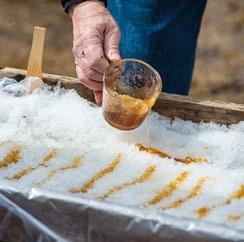
19
FARM GATE
Amaranth
475226 County Rd 11
Sean Declerc, Shannon Coleclough 519-925-3215
freshandtastymushrooms.com
Specialty and wild mushrooms; all-natural produce
Farm pickup by appointment only; check website for market locations
Future Spell Farm Specialty Herbs
ONLINE ORDER
Mono
714538 1st Line EHS
Jessye Finch 647-237-3317
futurespell.com
Farm-direct, organically grown specialty botanicals; clinical herbalist-owned and -operated
By appointment only; pickup and delivery available
2
Glenaura Farm
AGRI-ENTERTAINMENT, FARM GATE
Melancthon 438454 4th Line
Andrea and Chris Pease 519-925-8565
glenaurafarm.com
Grass-fed kunekune pork, grass-fed goat, custom orders, on-farm experiences
By appointment only
26
Grand Maple Farm
ON-FARM STORE
Amaranth
294392 8th Line
Mark and Cynthia Tijssen
519-939-1889
grandmaplefarm.ca
Maple syrup, honey, Amaranthgrown preserves
Call ahead
27
Grand River Farm
COMMUNITY KITCHENS, ONLINE ORDER
Grand Valley 322345 Concession 6/7
Josh Landman and Mel Karpenko
grandriverfarm.com
Pasture-raised pork, chicken, turkey
By appointment only; order online for on-farm pickup
30
Green and Bloom Farm
AGRI-ENTERTAINMENT, CSA, ONFARM STORE, ONLINE ORDER
Amaranth 294017 8th Line
Natalie and Shehan 647-988-9951
greenandbloomfarm.ca
Also at Amaranth
Community Market
Seasonal vegetables and flowers, some fruits and eggs
By appointment only; May–Oct : seasonal produce and flowers; order online through website

56
Heartwood Farm & Cidery
AGRI-ENTERTAINMENT, FARM GATE, ON-FARM STORE, ONLINE ORDER
Erin
5438 2nd Line
Brent Klassen and Val Steinmann 416-527-4352
heartwoodfarm.ca
Small-batch craft cider, grassfed beef, maple syrup, honey and other seasonal products; regenerative farming experiences, workplace off-site retreats, farm “glamping” overnight stays
Order online for pickup or delivery; check website for bookings for patio, tasting room and seasonally varying on-farm experiences
60
Heatherlea Farm Shoppe
CAFÉ, ON-FARM STORE, ONLINE ORDER
Caledon 17049 Winston Churchill Blvd Pat and Gord McArthur 519-927-5902
heatherlea.ca
Artisan dry-aged Angus beef, fresh meats, espresso drinks, baked goods, cheese, produce, heat-and-serve meals, local foods
Year-round Tue–Sun; licensed patio; check website for hours; shop in-store or order online for pickup or delivery
38
Hereward Farms
AGRI-ENTERTAINMENT, ON-FARM STORE, ONLINE ORDER, YOU PICK East Garafraxa 141051 15 Siderd Julie Thurgood-Burnett, Stephen Burnett 226-779-4973
herewardfarm.ca
Also at Hockley Valley Resort Spa, Beauty Bar on Main, Deja Vu Diner, Stranded Hair Studio, Foxy Face
Culinary lavender, lavender tea, lavender ice cream, lavender jams and chutneys Wed–Sat 10–4; pickup available
















































No matter what vibe you’re looking for — relaxing, exciting, or delicious — Dufferin County has it all. Bursting with unique experiences, from scenic countryside escapes to heart-pounding adventures, you’ll find it all in the new 2025-26 Explore Dufferin Guide. This year’s guide features a new Farm Fresh map showcasing local farm markets and agri-businesses. Your next adventure awaits at: exploredufferincounty.ca


NA
The Heritage Bee Co.
OFF-FARM RETAIL, ONLINE ORDER
Mulmur
Debbie Gray
705-466-2337
heritagebee.com
Certified B Corp; female-founded; member, 1% for the Planet
Handcrafted Ontario honeys: flavours include triple lemon, ginger, lavender, rosemary; classic liquid and creamed wildflower honey; gourmet honey sets made with 100% wildflower honey
Pickup available for online orders; free shipping throughout Ontario for orders $60+; visit website for details and retail locations
61
HoneyComb Cottage Bee Company – Belfountain
FARM GATE, ON-FARM STORE, ONLINE ORDER
Caledon
17162 Old Main St
J.L. Marshall
facebook.com/honeycomb cottagebeecompanybelfountain
Raw local honey, pure honeycomb, raw beeswax, creams and lip balms, candles, baskets, honeybee nucs and queens
Self-serve honey shed open daily 11–6 or order online through Facebook
64
Horseshoe Hill Farm
FARM GATE
Caledon East 15691 Horseshoe Hill Rd
Linda Gillstrom
905-586-1536
Sweet corn, squash, zucchini, garlic, cherry tomatoes, pie pumpkins, small–jumbo pumpkins, gourds, jalapeño peppers, honey
Aug–Oct : Sat–Sun 12–5

76
Humbervalley Honey
FARM GATE
Bolton 255 Glasgow Rd Larry Zembal 416-708-0276
lzembal@rogers.com
Raw honey
Mon–Sat 9–6; call first to order and confirm pickup time
34
Islandview Farm Market
FARM GATE
Mono 633520 Hwy 10
Charles and Susan Hughson
519-941-9098
islandviewfarmmarket @gmail.com
Certified Organic
Garlic, vegetables, pies, tarts, preserves, honey, crafts
Jun–mid-Oct : weekends 9–6, watch for trailer
20
Jenala Farms
ON-FARM STORE, YOU PICK
Amaranth 475080 County Rd 11
Ken and Faye Brett 519-938-0801
jenalafarms.com
Pick-your-own and readypicked strawberries; honey
Hours vary depending on availability; check website or Facebook page
3
Kidd Farms FARM GATE
Melancthon 438162 4th Line
John, Nancy, Bruce Kidd 519-925-6453
kiddfarms@gmail.com
Also at Harmony Whole Foods Market
Maple syrup
Mon–Sat approx. 8–8; call ahead
39
Knollbrook Farms FARM GATE
East Garafraxa 142239 County Rd 5 James Masters, Wendy Masters 519-362-3128
knollbrookfarms.ca
Beef, chicken, lamb, seasonally Mon–Sat by appointment only

67
Kooner Farm Market
ON-FARM STORE, ONLINE ORDER, YOU PICK
Bolton
8086 Castlederg Siderd Indy Kooner
416-858-4639
facebook.com/koonerfarms
Raw honey, free-run eggs, organic vegetables, cut flowers Mid-May–Dec
4
Lennox Farm
ON-FARM STORE, ONLINE ORDER
Melancthon 518024 County Rd 124 French family
lennoxfarm.ca
Homegrown fruit and vegetables, baking, preserves; agricultural education classes, farm tours, field dinners
Mar–Dec : self-serve market (closed Tue, Wed); farm-gate pickup and online ordering
11
Lionsshare Farm
ONLINE ORDER
Mulmur 837023 4th Line E Hilchey family
519-925-2222
lionssharefarm@gmail.com
Organically grown fruits and vegetables, such as asparagus, berries and much more
Open daily May–Oct; email to sign up for weekly flyer
NA
Living Against the Current CSA, FARM GATE
Mono
Jennifer Cosby 226-799-3997
livingagainstthecurrent.com
Seasonal raw, unpasteurized honey (liquid, creamed and cut comb); registered queen and nuc producer Farm gate 8–8; phone or email for farm-gate pickup location
16
Long Lane Acres ONLINE ORDER
East Luther-Grand Valley County Rd 25
Jerry and Tina Martin 519-500-6191
longlaneacres.com
Ethically pasture-raised beef, maple syrup
By appointment only; phone ordering, pickup and delivery available

Majestic Farm
FARM GATE, ONLINE ORDER
Erin 6003 1st Line
Karen Mansfield and Andy Fraser majesticfarm.ca
Water buffalo meat, milk, cheese, lamb, free-range eggs
Fri–Sun 10–5 or by appointment; online order for farm pickup; delivery available
12
Maple Grove Farm
AGRI-ENTERTAINMENT, ON-FARM STORE, YOU PICK
Mulmur 936215 Airport Rd
Chris and Robyn Wallace 705-435-5386
maplegrovefarm.ca
Fresh-baked bread, pies, bakery treats; seasonal fruit and vegetables; readymade, farm-fresh meals
Sun–Thu 9–6, Fri–Sat 9–7; check website for details and events
46
Mount Wolfe Farm
CSA, ONLINE ORDER
Caledon
10054 Old Church Rd
Crandall/Haney/Showell sisters 647-335-8897
mountwolfefarm.ca
Summer and winter vegetables and options to add maple syrup, honey, garlic, eggs, bread, freerange chicken, rainbow trout, seasonal fruit, preserves, more
Weekly pickup in summer; biweekly up to mid-January; online ordering with on-farm pickup or delivery service
36
Murphy Meadow Farms
FARM GATE, ON-FARM STORE, ONLINE ORDER
Mono 793236 3rd Line EHS
Fred, Ian and Elaine Murphy 519-288-5324
murphymeadowfarms.com
Regenerative farm offering grass-fed and -finished beef, pasture-raised chicken, raw wildflower honey, farmfresh free-run eggs
Thu 3–6, Fri 12–5, Sat 9–2; online order through website; text, email or call to arrange pickup
6
AGRI-ENTERTAINMENT, FARM
GATE, ON-FARM STORE, ONLINE ORDER
Mulmur 838369 4th Line E
Kyle Regeling notsohollowfarm.ca
Native trees, shrubs and perennials; food forest, permaculture and pollinator plants; honey products
Check website for hours; online sales with farm-gate pickup
AGRI-ENTERTAINMENT, OFF-FARM RETAIL, ON-FARM STORE, ONLINE ORDER
Mulmur 938343 Airport Rd
Sarah Allinson-Chorabik 647-400-8507
ontariohoneycreations.com
Also at Orangeville Farmers’ Market, Heatherlea Farm Shoppe, Spirit Tree Estate Cidery Honey, honeycomb, honey vinegars, honey soda, creamed honey; on-farm experiences
Thu–Sun 10–6; order online for Canada-wide shipping









NA
Owl Dream Farm
OFF-FARM RETAIL, ONLINE ORDER
Orangeville
46 Victoria St
Curtis Lazelle
647-621-5590
owldreamfarm.ca
Microgreens : radish, broccoli, sunflower, pea shoots, mustard, alfalfa, cilantro
Mon–Sun 9–5; pickup and delivery available
23
Peaceful Valley Farm
ON-FARM STORE, ONLINE ORDER
Mono 934409 Airport Rd
Brenda Bot and Tom Peters
519-942-1804
peacefulvalleyfarm.ca
Honey, maple syrup, farm-fresh eggs, preserves, baked goods
Fri–Sat 10–4; online order for pickup or delivery to Orangeville

5
Peace Valley Ranch
AGRI-ENTERTAINMENT, ONLINE ORDER
Mulmur
638135 Prince of Wales Rd
Cosack family
519-925-6628
pvrbeef.ca
Premium grass-finished black Angus freezer beef available May, Aug and Oct; sides and mixed quarters custom cut, wrapped and delivered to your door; ranch tours by appointment only

Providence Meadows
FARM GATE
Mono 347122 Mono Centre Rd
Curry family
519-942-9505
providencemeadowsfarm @gmail.com
Year-round free-range eggs, seasonal heritage vegetables, pumpkins, maple syrup, chicken, turkey, lamb, whole roasting duck meat
Self-serve or call ahead
Pure Caledon Hills Honey
FARM GATE
Caledon
17895 Heart Lake Rd
Paul Reader
519-927-3376
purecaledonhillshoney.com
Honey, bee pollen, beeswax, honeycomb Mon–Sat 8–6
Purple Hill Lavender Farm
AGRI-ENTERTAINMENT, ON-FARM STORE
Clearview 7484 6/7 Nottawasaga Siderd Emma, Jessica and Brian Greasley
705-822-5931
purplehilllavender.com
Also at Heirloom 142
Dried lavender bouquets, lavender-infused home and body gifts
June–Aug 10–5; check website for hours
Queensmere Farms
FARM GATE, ON-FARM STORE
Caledon 15505 Centreville Creek Rd Val and Nicholas Brooksbank 289-231-2180
queensmerefarms.ca
Brown eggs, wildflower honey, broiler chickens and Galloway vac-packed beef cuts
Mon–closed, Tue–Fri 9–6, Sat 9–5, Sun 10–5; calling ahead is advised as hours cannot always be maintained
Rebecca’s Kitchen ONLINE ORDER
Grand Valley 70 Amaranth St W
Rebecca Landman 519-216-9795
rebeccaskitchen.ca
Also at More Than Just Baskets, Creemore Coffee Company, Round Hill Farms
Granola, jams, pickles, relishes and local goodies; cooking and canning workshops
By appointment only; pickup available
37
Reid’s Potatoes & Farm Market
ON-FARM STORE
Mono 833153 4th Line
Brooke Reid 519-940-4096
reidspotatoes.com
Potatoes, vegetables, eggs, chicken, pork, beef, jam, honey, flowers, maple syrup, pies, quilts and more Open daily year-round

63
Riverdale Farm & Forest
AGRI-ENTERTAINMENT, FARM GATE
Inglewood 15707 McLaughlin Rd
Owen Goltz
905-588-0085
riverdalefarmandforest.ca
Seasonal vegetables, biochar, wood vinegar, compost, tea extracts, eco tours and workshops
Jun–Oct

50
Rock Garden Farms
ON-FARM STORE, YOU PICK
Caledon East 16930 Airport Rd
Iuglio and Galati families 905-584-9461
rockgardenfarms.ca
Fresh fruit, vegetables, freerange eggs, maple syrup, homemade preserves, sauces, home-baked pies, garden centre
Apr–Nov : 8–7 daily; holidays 8–5; for curbside pickup, check website
NA
Rock View Farms
ONLINE ORDER
Mono
Mitch and Kate McReavy 519-217-8623
rvfmonocentre.com
Naturally raised, pastured meats: beef, chicken, pork
By appointment only; pickup available
18
Sheldon Creek Dairy
AGRI-ENTERTAINMENT, ON-FARM STORE, ONLINE ORDER
Adjala
4300 Concession Rd 5 den Haan family
705-434-0404
sheldoncreekdairy.ca
Also at many local retailers – check map on website for locations
Milk, cream, yogurt, kefir, sour cream, cheese, ice cream, flavoured milks, meat, preserves; seasonal dairy bar 10–6 daily; online ordering available (check website) for pickup and home delivery
NA
Sola Gratia Farm
ONLINE ORDER
Melancthon
Griffith family
519-288-5678
solagratiafarm.ca
Organically grown vegetables; pastured chicken, turkey; chicken and duck eggs; handmade soap; natural ice cream; einkorn and gluten-free baking; einkorn sourdough bread Visit website for online orders
10
Toad Hole Farm
FARM GATE
Mulmur
587448 10 Siderd Niels Pearson
519-760-3860
ned696@hotmail.com
100% grass-fed and grass-finished beef
Call or text to arrange pickup or free home delivery

















48
Valleybrook Farm
ONLINE ORDER
Caledon
18178 Horseshoe Hill Rd
David Jackson
905-460-4662
blackcow@sympatico.ca
Grass-fed and -finished black Angus beef
By appointment only; call ahead; phone order, pickup and delivery available
75
Van Dyken Farm
YOU PICK
Caledon 14510 Gore Rd
Van Dyken brothers
905-857-3561
Beans, eggplant, onions, peas, peppers, rapini, tomatoes, zucchini
Call for hours and availability
35
Adamo Estate Winery
ON-FARM RESTAURANT, ON-FARM STORE
Mono
793366 3rd Line EHS
Adamo family
519-942-3969
adamoestate.com
Also at select restaurants
Small-batch boutique winery with retail shop, tasting bar, lunch and dinner, patio, event and meeting spaces, scenic views year-round; award-winning wines
Check website, as hours change through the summer, and to book event spaces

Badlands Brewing Company
ON-FARM STORE, ONLINE ORDER
Caledon 13926 Chinguacousy Rd
Troy Baxter, Michael Nuttall, Grace Wilkinson
badlandsbrewing.ca
Fresh craft beer
Summer hours from June : Fri 12–5 on-site consumption, pickup; Sat 12–6 on-site consumption, food, pickup, live music 2–4; Sun 12–6 on-site consumption, food, pickup
45
Caledon Hills Brewing Company
OFF-FARM RETAIL, ON-FARM RESTAURANT, ONLINE ORDER
Palgrave 17219 Hwy 50 416-988-2003
caledonhillsbrewing.com
Also at local pubs and restaurants, the Beer Store, liquor stores (check website)
Vienna Lager, Bohemian Pilsner, Kölsch, Summer Solstice, Mango Wheat, Mexican Cervesa, Cream Ale and more; food available in brew pub dining room and on patio
Check website for hours; contact-free delivery available (check website)
Downey’s Farm Market
AGRI-ENTERTAINMENT, ON-FARM STORE
Caledon 13682 Heart Lake Rd 905-838-2990
downeysfarm.com
Play area, farm animals, corn maze, bakery, homemade fudge, jams, jellies, winery and hard cider
May 23–Oct 31 : 9–5 daily; Nov 21–Dec 24 : 9–5 daily
Escarpment Gardens
OFF-FARM RETAIL, ONLINE ORDER
Mono 487151 30 Siderd Joey Lemieux
escarpmentgardens.ca
Also at Shelburne Foodland, Harmony Whole Foods Market, Tottenham Health Foods and Orangeville Farmers’ Market
Certified Naturally
Grown herbal teas
By appointment only; order through website for farm-gate pickup
58
GoodLot Farmstead Brewing Co.
AGRI-ENTERTAINMENT, FARM GATE, ON-FARM RESTAURANT, ON-FARM STORE, ONLINE ORDER
Caledon
18825 Shaws Creek Rd
Gail and Phil Winters 519-927-5881
goodlot.beer
On tap at select local restaurants, bars; also available at select LCBOs across Ontario
Organic hop farm and solarpowered brewery with tasting room, beer gardens, disc golf and food truck
Open year-round : Thu–Fri 3–8, Sat 12–8, Sun and holiday Mon 12–7; province-wide delivery available
Heartwood Farm & Cidery
AGRI-ENTERTAINMENT, FARM GATE, ON-FARM STORE, ONLINE ORDER
Erin 5438 2nd Line
Brent Klassen and Val Steinmann 416-527-4352
heartwoodfarm.ca
Small-batch craft cider, grassfed beef, maple syrup, honey and other seasonal products; regenerative farming experiences, workplace off-site retreats, farm “glamping” overnight stays
Order online for pickup or delivery; check website for bookings for patio, tasting room and seasonally varying on-farm experiences
22
Mono Centre Brewing
ON-FARM STORE
Mono
388113 Mono Centre Rd
Zach Gammage 519-943-0055
monocentrebrewing.ca
Also at Orangeville Summer Outdoor Market; area restaurants
Craft beer brewed on site; tasting room
Wed 12–6, Thu–Fri 12–7, Sat 11–7, Sun 11–6
NA
Pommies Cider Co.
OFF-FARM RETAIL
Caledon
Lindsay and Nick Sutcliffe 416-201-2101
pommies.com
At LCBO, bars, restaurants, Loblaws, Sobeys, other grocery stores
Pommies Original Cider, Pommies Farmhouse Cider, Pommies Mimosa Cider Mon–Fri 9–5

44
Sonnen Hill Brewing
ON-FARM STORE, ONLINE ORDER
Caledon 20727 Heart Lake Rd
sonnenhill.com
Easy-drinking beer, lagers, ales and fruit beer; on-site bottle shop, tasting room, beer garden and walking trail, summer food pop-ups
Taproom, bottle shop, beer garden : Fri–Sun (check website for hours); pickup and delivery available
Spirit Tree Estate Cidery
AGRI-ENTERTAINMENT, ON-FARM RESTAURANT, ON-FARM STORE, ONLINE ORDER, YOU PICK
Caledon 1137 Boston Mills Rd 905-838-2530
spirittreecider.com
Feast Ontario certified Also at many local stores
Farm Shoppe : cider, artisan breads, pastries, pies; Bistro : pizza and locally inspired dishes; Cider Gardens : live music in summer; cidery tours
Thu–Sun 10–9; accessible; curbside pickup available
25
Windrush Estate Winery
AGRI-ENTERTAINMENT, ON-FARM STORE, ONLINE ORDER
Adjala
3100 Concession Rd 3
J.C. Pennie, Marilyn Field 905-729-0060
windrushestatewinery.com
Also at Alton Mill, Beyond the Gate, Black Birch, Cabin, Chez Michel, Duntroon Highlands Golf, Gourmandissimo, Millcroft Inn, Mrs. Mitchell’s International award-winning VQA wines : pinot noir, cabernet franc, dry riesling, pinot grigio, chardonnay
Sat–Sun 12–4 : tours and tastings; order online for delivery or pickup
Alliston Downtown Market
Sun 9–2 : June 22–Sep 21 (excluding Aug 10)
Alliston Centre St and Victoria St allistonbia.com
Amaranth Community Market
Wed 6–8 : June 11, July 9, Aug 12
Amaranth
Amaranth Municipal Park 374028 6th Line
amaranth.ca/recreationprogramming/community-market
Creemore Farmers’ and Craft Market
Sat 9–1 : May 17–Oct 25
Creemore Outdoor market at Station on the Green 10 Caroline St E creemorefarmersmarket.ca
Erin Farmers’ Market
Thu 3–6:30 : Jun 19–Sep 25
Erin
Erin Fairgrounds “agri-dome” 184 Main St erinfarmersmarket.ca
Orangeville Outdoor Summer Market
Sat 8–1 : May 3–Oct 18
Orangeville Second Street and Broadway orangevillefarmersmarket.ca
Orangeville Indoor Winter Market
Sat 9–1 : Nov 1–Dec 20, Jan 4–Apr 19, 2026
Orangeville
Orangeville Town Hall 87 Broadway orangevillefarmersmarket.ca







































LOCAL FLOCK OWNERS SHARE HOW THEY GOT HOOKED ON RAISING CHICKENS AND HOW THE REWARDS GO FAR BEYOND THE ULTRA-FRESH EGGS
BY ALISON McGILL • PHOTOGRAPHY BY PETE PATERSON

When twins Sofie and Maya Jenkins were 10 years old, they made a pitch to their parents, Melissa and Matthew, to adopt a few new members into their East Garafraxa-based family: backyard chickens. The sisters, now 17, were excited by the possibility of keeping hens on their five-acre homestead and providing their family with a steady supply of eggs.
“We gathered up all the research we could find about different kinds of chickens, how to care for them, and the responsibilities we would share between us, and compiled it into a Google Doc for our parents,” Sofie explains. They pitched the plan to Melissa, an artist whose work adorns the walls of the recently opened Liberty Inn (see page 33), and Matthew, a sales executive. The couple agreed the girls could give it a go, if they were committed. “They loved the idea of having farm-fresh eggs, and thought it was also a great project for us to learn responsibility and hard work,” Sofie adds.
Talk to any local backyard flock owner and they will tell you their reason for raising chickens is the same – having instant access to fresh eggs. However, it’s not the only benefit. There’s a wonderful and unexpected byproduct of birdkeeping that many hobby farmers say outweighs the egg output: a deepseated love for their chickens.
Andrea Moore, who lives near Caledon Village and works for a non-profit in Brampton, currently keeps six hens in her backyard. She and her husband, Phil, a retired engineer, started their brood in June 2020 with day-old barred Plymouth Rock chicks from Frey’s Hatchery in St. Jacobs. The breed is known for their distinctive black-and-white barred feather pattern, good egg production and docile temperament. Faced with more time at home on their one-acre country property thanks to the pandemic, the couple decided it was the perfect opportunity to realize their dream of keeping hens.
“We were very much into the concept of having food provided by happy animals,” Moore says. “What we didn’t expect was to become so deeply bonded to our birds. They have become beloved pets. We had no idea about the curious, fun and funny personalities chickens have, and how much we would become invested in seeing them thrive and grow as individuals.”
The same can be said of the Jenkins’ flock of six. “Once we got our chicks, the eggs immediately became the least important thing about them,” Maya says.
“What
we
didn’t expect was to
become so deeply bonded to our birds. They have become beloved pets.”
“We quickly realized what interesting animals they are, with unique, sweet and soulful personalities.” Their two oldest chickens, which are Rhode Island reds, are named Myrtle and Beanie. “They are sisters but are so different from each other,” Maya adds. “Myrtle is quiet, intelligent and calm, while Beanie is outgoing and so chatty – when you talk to her, she often clucks back!”
The Jenkins’ brood also includes two-year-old Easter egger hens named Phoebe and Biscuit; a two-year-old spangled Russian Orloff hen named Camille; and three-year-old red rooster named Banana. Sofie says as she and Maya have grown into young adulthood, their chickens have been an incredibly grounding element. “They are a stable part of my life and they are so nice to have at home,” she says.
The joy owners receive from their chickens is something Ayella Grossman, co-owner of FarmHaus Supplies in Erin,
which sells chicken supplies like feeders, waterers and chicken treats, often hears.
Though they were a popular hobby pre-pandemic, backyard birds have seen a boom in the last five years, she says, echoing news reports from 2020 that showed an increased interest in having a backyard coop or, alternatively, renting a coop during the summer months.
“The pandemic and rising grocery prices inspired people to find ways to be more self-sufficient and food-secure, which included gardening and keeping chickens,” Grossman reports. “A small flock of chickens provides eggs for a family, and their used bedding can be composted and then added to a garden to provide nutrient-rich compost. If you have backyard homestead goals, chickens are a perfect addition to the plan.”
The first step is to check bylaws in your area to make sure backyard chickens are permitted, and depending on the size of your property, how many you can have (for example, if you live in Erin, you can have six hens on two acres, and roosters are prohibited due to noise concerns). Some town bylaws state the coop must be in your backyard and a certain distance from the property line. The rules also vary depending on whether you’re in town or in a rural area. It’s important to know before you begin.
(See sidebar on page 82 for more details.)
Because chickens are flock-centric animals, Grossman says starting with three or four is ideal. They will produce an average of two dozen eggs a week.
“If your municipality allows for more, you may find yourself quickly wanting to add new flock members because you realize how enjoyable they are,” she laughs. “We call this ‘chicken math!’”
You’ll need to plan for a coop to house your chickens as well as an area
PREVIOUS PAGE: Twin sisters Sofie and Maya Jenkins at their East Garafraxa home with their flock – Myrtle, Beanie, Phoebe, Biscuit, Camille and Banana.
FACING PAGE: The Jenkins coop was designed to provide enough space for each chicken to rest and roost, to keep out predators, and to protect them from winter weather.



for them to run, and if your property permits, a spot where they can roam freely. Bylaws also set out minimum and maximum space requirements per hen, and you’ll need a perch that accommodates all the hens.
Jo-Anne St. Godard, an environmental consultant who lives on a half-acre property in Mono, keeps five hens in a repurposed dog run, which turned out to be the ideal coop size. Her “girls” – a mix of fluffy silkies, a fancy plumed Polish chicken and a hearty Rhode Island red – have plenty of room to roost, she says, adding that the coop and run don’t take up as much space as she initially thought they would.
“As a general rule, you want four square feet of coop space for each hen,” Grossman says. “The outdoor run space should be a minimum of 10 square feet per chicken, and allow your chickens a place to explore, scratch, have a dust bath to clean their feathers, and forage.” This outdoor space could be grass, but grass won’t last long in smaller runs because chickens scratch the ground. According to Grossman, usually once the grass is gone people use wood shavings, gravel, sand or wood chips.
The first coop Moore used was a prefabricated kit that she purchased online – a move she regrets as it didn’t provide enough space for their original flock of four chickens. “We did waste

UPPER LEFT : Andrea Moore, holding an azure blue breed, and her son, Sam, holding a barred Plymouth Rock chicken, at their home in Caledon. Behind them is the 10-foot-by-10-foot coop where their six chickens live.
LOWER LEFT : The outdoor enclosure at the Moores’ coop gives their chickens a safe space to explore, scratch and have a dust bath.
FACING PAGE: Melissa Jenkins, who snapped this shot after her morning egg collection, is often pleasantly surprised by the varying hues of her flock’s eggs.

“They are very resilient, and they don’t mind the weather, but we do things to help make it more comfortable for them.”
a bit of money with the first kit,” she admits. “The specs might say it’s big enough for four or six chickens, but it really wasn’t. You need to do your own research and plan better.”
After this, she and her husband converted a 10-foot-by-10-foot wooden shed into an “exclusive chicken palace,” which provides 100 square feet of indoor living space during the colder months. The shed is now also connected to a larger fenced-in chicken run with 100 square feet of outdoor space where the flock can roam safely.
To insulate her coop, Moore uses the “deep litter method” – shavings are laid down on the floor, and as the bedding gets soiled with chicken poop, more shavings are layered on top. In the spring Moore does a big cleanout of the litter.
Good coop ventilation is critical, including windows and vents (with netting or wire protection) at the top of the coop for moisture to escape. Grossman says chickens produce a lot of heat and moisture, which can cause dampness. “Excess moisture is harmful to your chickens’ health as they are very susceptible to respiratory ailments,” she explains, adding that proper ventilation keeps out drafts, while allowing harmful gases like ammonia to exit.
You will also need nesting boxes –a standard size is typically 12 inches
by 12 inches, and 14 inches high – where chickens can lay their eggs, as well as perches for roosting at night.
In the winter months, you’ll need a heater for the birds’ water, and you might also want to consider insulating the inside of the coop for extra warmth. Foam board insulation can be used as a buffer against the cold, but needs to be covered with plywood or puck board, so chickens don’t peck at it.
“Your dog can come inside during a snowstorm, but not your chickens,” Moore says. “They are very resilient and they don’t mind the weather, but we do things to help make it more comfortable for them.”
In addition to the space requirements, the birds have other needs to consider. Chickens are prime targets for predators, chief among them raccoons, weasels, minks, coyotes, skunks and birds of prey. To keep them safe, their coop needs to be constructed of materials that can’t easily be penetrated, such as hardware mesh with a tight grid structure of less than half an inch (ironically, chicken wire is one of the easiest materials for predators to break through).
This was a lesson St. Godard learned the hard way after a mink got into her coop through the pre-existing chicken wire and she lost three chickens. Following this, she fortified the coop by doubling up with a smaller-spaced layer of wire to keep smaller predators out.
You also need to install locks and latches that small paws can’t undo, as well as bury predator-proof hardware cloth in the area surrounding the coop to prevent predators from digging underneath fencing to gain inside access.
Owning your own flock does come with certain risks. According to Wellington-Dufferin-Guelph Public Health, backyard chickens can carry germs like salmonella, campylobacter and avian influenza (bird flu), which can be spread through contact with the



Before you build or rent a coop, know the local regulations. In Orangeville owners of a detached or semi-detached home may have one chicken coop in their rear yard with no more than three hens (roosters are not allowed), which must be secured in the coop from 9 p.m. to 6 a.m.

Caledon and Mulmur residents are allowed four hens. In Erin, it depends on the size of your property — on lots under two acres, you can have up to six hens, but this goes up to 24 chickens if your lot is three to five acres.
Mono allows chickens on rural properties that are one acre or larger but is also working on a pilot program to license backyard chickens in residential areas.
Backyard coops are currently not allowed in residential areas of Shelburne and Melancthon — a situation that made headlines in 2020 after a Horning’s Mills family was asked to get rid of their beloved chickens.
check in with each of your birds to keep on top of any health issues like egg binding, which occurs when an egg becomes stuck inside a hen’s oviduct, or respiratory concerns. They are known to hide sickness until they are extremely ill when it may be too late to treat with veterinary care.” If you go away, you’ll need a chicken sitter to keep up your birds’ routine.
Egg production
When your hens are in their peak laying years, you can expect an egg every one or two days. One chicken can produce up to 250 eggs a year! Does this leave owners feeling overwhelmed and living on omelettes?
“We are shocked about how many eggs we get,” St. Godard laughs. “We slightly underestimated the number of eggs we would collect, but we love it and always find a way to use them.” Your friends and neighbours might also appreciate the gift of fresh eggs.
Calcium is critical to chickens as it affects egg laying and egg quality. You can add supplements like oyster shells or black soldier fly larvae to their diet.
You can feed chickens human food but need to be savvy about what you share — certain foods don’t agree with them. Do some research before sharing any leftovers with your chickens.
Pecking order
In the chicken world, hierarchy absolutely is a thing. There will be a boss bird in the flock, and when you introduce newbies, expect some bullying until they realize their place in the family. It can be unsettling to observe, but know that it’s normal, and you only need to step in if things escalate and a bird has been excessively scratched, beat up or is bleeding.
Cuddle factor



Caring for chickens is not hard, but it is a daily chore. The birds need to be let out of their coop in the morning and put back in at night.
“The most intensive part of care is coop cleaning, which we do once a week,” Sofie Jenkins says. “You also must take time to
Food
According to Grossman, an average chicken will eat anywhere from a quarter to a half pound of feed per day. If you have four hens, a 25-kilogram bag of feed will last approximately 50 days (prices average $23 for regular feed and up to $34 for organic).
Yes, chickens can be cuddly! If you raise them from chicks, they can become attached to you and accustomed to being handled.
“Our girl Phoebe is such a cuddler,” laughs Maya Jenkins. “Even our rooster, Banana, loves to be picked up and though many people don’t want or can’t have a male in the flock, we love him. He really cares for the girls and is always looking out for their safety.”
feathers, droppings, coops and eggs.
Practising good hygiene, including washing your hands thoroughly after touching, cleaning and feeding times, wearing dedicated clothing and shoes to avoid cross-contamination, and always keeping the coop clean can help minimize exposure. If you’re getting new chickens, WDG Public Health recommends quarantining them before introducing them to the flock.
The Canadian Food Inspection Agency website offers tips on reducing the risk of bird flu, including preventing your flock from interacting with wild birds, frequently cleaning the coop and knowing the signs of infection, including a sudden drop in egg production, lethargy, reduced appetite or respiratory issues.
The best breeds
It’s not until you get deep into chicken fact-finding mode that you realize how many different varieties there are – hundreds worldwide. Some of the most popular breeds for egg laying include Rhode Island reds with their burnished, rusty red feathers; Leghorns, which can be white, red, light brown or black; and Plymouth Rocks, who have striking white-andblack speckled plumage. The Jenkins twins started with Rhode Island reds, which they recommend as a starter breed because they are great egg producers.
Chickens lay a variety of colours of eggs – it depends on their breed – and this might factor into your choice of hens. Rhode Island reds lay classic brown eggs, while Araucana chickens are famous for their beautifully coloured eggs – blue, in particular. Easter eggers, which are a crossbreed, are beloved for producing a mix of egg shades, including pale blue, soft green, off-white and warm taupe. When it comes to procuring chickens, there are a few options. You can start with hatching eggs, which Grossman says is an interesting and educational experience, but a bit of a long game – it will be several months before chickens mature and begin laying eggs.
Pullets are young ready-to-lay hens that start producing eggs at about the age of 16 weeks. Many hobbyists choose these to start their flock. The other popular choice is day-old chicks, which are not only adorable, but fun to raise. You can find day-old chicks at farm markets (cost per chick generally ranges from $2 to $8), or for a larger selection of breeds you can hit an All Ontario Fur & Feather Associates buy-selltrade event, which happens every spring and fall in various locations throughout Ontario, most recently in Brampton. Area farms, including Davis Feed & Farm Supply in Caledon, also stock them.
Grossman says a huge benefit of raising day-old chicks is you can socialize them and get them used to being handled. The drawback? Unless your chickens are sexed – and some breeds cannot be sexed at birth – you could end up with a flock of roosters.
“There are breeds of chickens whose sex is linked to the colour of their patterns, and we call those breeds sex-linked,” Grossman explains. “If you have another breed in mind for your flock that doesn’t have that trait, you may not be able to determine with certainty what sex you are taking home until they are much older.”
Healthy, happy and well-cared for chickens can live six to eight years, and their egg-laying peak is the first four years.
Owners will tell you that once you have chickens, it’s hard to imagine life without them. “I love connecting with them every morning and discovering the gifts they have left for us,” says St. Godard, who has had her flock for three years.
“Seeing them roam around is so calming, and they have been such a beautiful addition to our home. I love seeing my 20-year-old son interact and hang out with them. Raising them has been a lovely way to bring something new into our family that’s low maintenance and incredibly soothing.”
Alison McGill is a writer, editor and podcaster who lives in Halton Hills.



Let us design,


BY EMILY DICKSON
It’s difficult not to demolish the warm, comforting sweet potato muffins and hot drop biscuits that come with the lunch menu at Mrs. Mitchell’s Restaurant long before the main arrives. At this Violet Hill hot spot, built as a Mulmur schoolhouse in 1889 and converted into a restaurant in 1980, these tempting baskets have been on the menu since the start.
Owner Heidi Baufeldt, who took over from her mother, Maureen Baufeldt, 14 years ago, says the sweet potato muffins and hot drop biscuits were inspired by family trips to Colonial Williamsburg, Virginia, where her parents fell in love with the town’s historic charm — so much so that when they opened, waitstaff wore 17th-century period costumes.
The Manitoulin Island rainbow trout at The Globe Restaurant in Rosemont is pan seared and paired with a honey mustard crust and tangy lemon beurre blanc — a savoury dish that lets the natural flavour of the fish, sourced from the pristine waters of Lake Huron, shine.
“The fish from our own lakes doesn’t get any fresher than this,” says head chef Jay Klausen, who joined The Globe in 2023 and is passionate about featuring Ontario-grown ingredients. The rainbow trout is a staple on The Globe’s menu, though the side dishes change seasonally and include locally grown red cabbage, parsnips, carrots, mushrooms and potatoes.
To follow on a sweet note, their signature in-house chocolate mousse is a French classic served with fresh fruit and mint.

While the main menu has evolved over the years (as have the staff uniforms, which are now much more comfortable), two original desserts are also still on offer, depending on the season: a decadent raspberry cream pie in summer and a delicately spiced pumpkin cream pie in the fall, with the proceeds of the latter going to the Headwaters Health Care Centre. Happy anniversary, Heidi!

















Made with Canadian cereal grains, Ontario hops and pure maple sap tapped from the trees of Terra Cotta Conservation Area, the new Tree Hug Wilder Sap Ale from GoodLot Farm & Farmstead Brewing Co. is a collaboration with Credit Valley Conservation Foundation and Wilder Climate Solutions. Proceeds support the acquisition of ecologically significant land.
Full of flavour (and zero tariffs), Caledon Hills Brewery’s All Canadian Lager is crafted with locally sourced barely, corn, wheat hops and Ontario water. Grab takeaway cans at the brewery or stop in for this patriotic pint at their beer garden.
Purple Hill Lavender Farm’s culinary lavender can be added to honey, mixed into marinades or dashed in a cocktail. At Hereward Farms’ Lavender Lounge, sip on a smooth lavender latte made using a handcrafted lavender syrup and topped with a sprinkle of culinary lavender. And Mono’s Avalon Lavender Farm offers in-person visitors its line of lavender products, which has included Lavender Simple Syrup and Lavender Peppermint Tea. Hibiscus, Butterfly Pea, Chamomile and Passionflower are four new honey flavours from The Heritage Bee Co.’s Sleep Well collection, specially formulated to promote wellness and a restful sleep.


Erin residents craving their favourite pain au chocolate aux amandes from Bistro duPain will have to take a scenic countryside drive now that the French bakery and crêperie moved to a new — and much bigger — location in Primrose on Highway 89 five minutes east of Shelburne.
Pistachio cannoli gelato made with handchopped pistachios and crushed cannoli shells is a star at ice cream company Caledon Creamery — and available at Gather Cafe in Alton, Blissfully Baked x The Little Almond in downtown Bolton, and Molto Bene Pizzeria in Caledon.
Stock up for backyard BBQ season with a whole, side or half side of Angus beef direct from Heatherlea Farm Shoppe, and select the exact cuts, length of dry aging and packaging specifications you need. Visit our Headwaters Farm Fresh Guide on page 59 for more local meat options.


A roasted harissa chicken sandwich, Wagyu beef carpaccio and a hamachi starter up the menu at Fescue restaurant at TPC Toronto at Osprey Valley’s new Heathlands Clubhouse. Chef Jamie Huynh says he hopes his elevated “19th hole” vision will “break the stigma of a typical golf course restaurant.”
Inspired by the Caledon countryside, Fescue’s verdant decor incorporates the perennial grass it was named after. Cocktails also wink at the spot with names like Down The Middle, featuring lime-leaf-infused rum, vanilla and gooseberry syrup, absinthe, and lime.
yDirect from the farm to your plate, Lennox Farm’s Field to Fork dining series aims to let diners truly experience what local food means as they meet the growers and dine on the freshest ingredients under the open sky, prepared by local chefs — on June 21, July 26, August 16 and September 20. Visit www.lennoxfarm.ca


You can also dine alfresco at 4th Line Cattle Co.’s Farm to Fork event on June 26 featuring a feast in the field that uses fresh produce alongside the farm’s pasture-raised beef.
On July 26 Creemore’s French restaurant, Chez Michel, transforms the Creemore Village Green into Paris in the Park, a cheery spot to enjoy a glass of wine, share a good meal by chef Winston Barrett and watch the world go by. “It’s our favourite event of the year,” says owner Milynne Charlton. “Chef Winston sets up an outdoor kitchen so you can see what’s cooking. We’ve got an oyster bar, lobster ravioli with a lobster cream, steak frites, mushroom bourguignon …. You can even bring a picnic blanket, grab some takeaway and enjoy the live music.” Dinner service starts at 5 p.m. and reservations are highly recommended. Bon appétit!
Then it’s a full weekend of foodie fun in downtown Orangeville starting with In Good Spirits on August 22. Visitors sip and saunter around Mill Street while sampling locally produced craft beverages including beer, wine, cider, spirits and creative cocktails from the best mixologists in town. The next day, Taste of Orangeville hosts top chefs from more than 14 local restaurants who share bite-sized evidence of their cooking prowess.


Open Studio and Gallery
Saturday, September 20
Caledon Studio Tour – Saturday & Sunday, October 4 & 5
The studio is open by appointment or by chance. Give us a call, we’d love to see you!






Interlock
Grading
Garages,




From hand-built floor tiles to tableware thrown on a wheel, Jacqui Liberty’s craft touches every room of the meticulously renovated Liberty Inn in Caledon.
BY JANICE QUIRT
JACQUI LIBERTY THREW HERSELF
into the renovation of the Liberty Inn, quite literally. Liberty and her husband, Bruno Roldan, bought the historic Cataract inn –most recently Forks of the Credit Inn – three years ago. Liberty, who founded Soft Fire Ceramics in 2020 in Alton, made each of the five guest rooms’ kitchen backsplashes, shower tiles and bathroom floor tiles – along with the dinnerware in each kitchenette. From these hand-built pieces (over 10,000 tiles!) to wheel-thrown mugs and plates,
Liberty’s talent graces most surfaces of the luxury inn, which opened in February 2025. Liberty invited me to observe how she builds her signature tiles, starting with raw, wet clay. Although most of her work is thrown on the wheel, the tiles require a different process. After using a wire cutter to extract a lump of clay and then weighing it, Liberty begins the process of “wedging” to remove air bubbles from the clay to ensure the same consistency throughout. “There’s a temptation to liken the process to kneading dough, but
At her church-turnedstudio in Alton, Jacqui Liberty makes tiles, cups, dinnerware, vases and more by hand.
it’s quite different,” Liberty says, standing with the stained-glass windows of her churchturned-studio as a backdrop. Wedging clearly demands full body pressure, as she stands over the clay and leans into it. Liberty tends to use stoneware clay, but terra cotta and porcelain are also in her rotation.
When Liberty first began making the tiles, she used a rolling pin, which was very labour intensive and hard on the body. Given the quantity required for the inn, she invested in a slab roller, which resembles a giant pasta machine and rolls the clay to an even thickness in seconds. After allowing the slabs to “firm up” for 24 hours, she cuts out the tiles with an X-Acto-knife-like tool and then leaves them on drying racks.
“It’s a very slow process, because clay needs to be the right moisture level to be handled –you develop a tactile sense as to when it is ready,” Liberty says. “It takes two weeks just to get to the bone-dry stage, and then it’s on to the first firing, called the bisque firing.” This is done in the kiln, situated on what was once the altar, a few feet from the organ.
After the bisque firing is complete it’s time for the glaze, and this is where Liberty’s science background shines – she has a master’s degree in public health and started learning pottery 20 years ago as a study break. “I’m very interested in developing my own glazes,” she says, even though she also loves the look of natural clay. “A glaze is basically powdered glass suspended in water. The colour comes from different oxides or commercial Mason stains – blue from cobalt, brown from titanium, and green or grey from copper and chrome.” Liberty credits the glaze courses taken at Alfred University

Don’t waste a minute of sunshine — hike, get in a boat or hit up a golf course.

In the news
Keep up with what’s happening in Headwaters with our recently launched News Desk.

Notes from the wild
Don Scallen has his eye on the newts, salamanders and praying mantids in our midst during the summer months.
INTHEHILLS.CA



TOP: After rolling the clay to an even thickness, Liberty allows the slabs to firm up for 24 hours before making them into tiles.
in New York State with developing her knowledge of their chemical composition and bolstering her confidence to create her own.
Liberty applies the glaze to the tile with a glaze brush. “It’s different from a typical paint brush because it needs to soak up a lot of the glaze. You want to really load up the brush with glaze before applying it – otherwise, it will be streaky.” Many of Liberty’s functional pieces, like plates and mugs, are instead dipped in glaze.
Liberty shares with me her “library of tests,” a small toy crate repurposed from her six-year-old twins. It contains sample pieces reflecting a whole ecosystem of different colours – a catalogue or aide-mémoire of sorts, since all the glazes look like white powder on application and require glaze firing to develop their hue.
“When you open your glaze firing, that’s when you know if you like the piece or not,” says Liberty. “A lot of good pieces can be ruined with a bad glaze.” But of the ones that work, she says every piece becomes her new favourite.
In creating the tiles for the inn,
Liberty deviated from her usual neutral earthy colours to experiment with jewel tones, including navy, dark greens and burgundy. “We based the palette on an updated version of historical colours, as the inn dates back to 1855,” she says. “I love those colours in tiles and I’m excited I finally get to experiment with them. It’s harder to do that palette in functional ware because those pieces need to fit into a lot of different spaces and interior design styles.”
Very aware of her surroundings, Liberty gleans inspiration from art, interior design and gardening. “I’m always on the lookout for different colours, patterns and textures, and these find their way into my work,” she says. “I’m also influenced by items I need, like vases because I love gardening. If I find myself wishing I had a specific vase, I’ll figure out how to make it.” Liberty refers to her notebooks and collection of clippings as her greatest style influence. “When I’m travelling and I see an interesting textile, or a combination of paint colours on a building, I’ll capture it and look back on it later.” Indeed, the family recently embarked on a twoweek trip to England to look at other small historic inns for inspiration.
LOWER LEFT : Using a potter’s wheel, Liberty applies a sponge to smooth one of her pieces.
LOWER RIGHT : A fan of neutral, earthy tones, Liberty crafts pottery pieces that exude a reserved elegance.
Liberty has evolved from student to teacher, although she continues to take classes herself. Her studio doubles as a classroom with eight pottery wheels at the ready. And when her pupils are looking for more courses, she refers them to Georgetown’s Credit Valley Artisans pottery guild, where she picked up her love of pottery again in earnest a decade ago. Some of her students are artists in other media, but she has taught an increasing number of nurses and social workers who understand the therapeutic benefit of pottery.
“Pottery is a great thing for both artists and non-artists to do – it’s a discipline that opens your mind and gives you new ideas.”
Janice Quirt is a freelance writer who lives in Orangeville.
BY STEPHANIE CASINO ESGUERRA
In John Farrugia’s sculptures, skeletons and bodies appear mid-movement, evoking admiration, fear and awe. His skeleton series is one to marvel at; the details of each bone and posture invite you to ponder the way the human body moves. Farrugia’s wood sculptures often feature halo-like rays of wood emanating from a central focal point. And his large-scale commissions stand proud in front of local businesses and public buildings. His latest collection, crafted in bronze at his Mono studio, is an intimate series of four bronze snakes so lifelike as to give viewers a start, yet so elegant as to also merit becoming a beloved collectible. Farrugia says they are part of his “continued interest in bodies and the way they interact.” Trying to recreate a snake’s form and texture “reminds me of working with fabric because a lot of the time the fabric is what’s conveying the movement,” he says. And what is that movement conveying? Each snake — about two feet long, if they were outstretched — is posed on an emotional continuum from docile to ready to strike. (Prices upon request, John Farrugia)

Courtney Collier started Bugs Boutique in 2010 using her experience in building custom wood cabinetry, but expanded to make everything from barn doors to brightly painted wood signs and paddles — even custom art installations. “I design every project and then plane, cut, sand, paint, letter and finish my projects myself. Creating wood decor is my passion. My goal is to create Canadian wood products with a price tag fit for the average household.” (Items starting at $10 depending on complexity, Bugs Boutique, More Than Just Baskets)
SOURCES
Bugs Boutique, Orangeville, IG @Boutique.Bugs
John Farrugia, Mono, craganrock.com
Isaiah McCloud, Hillsburgh, watercoloursforwildlife@gmail.com


Isaiah McCloud describes himself as a self-taught artist who is “hooked” on wildlife rehabilitation. Isaiah, 11, draws a variety of birds such as cardinals, mallards, and puffins on watercolour cardstock with fine detail and care, and sells packs of them to benefit the Procyon Wildlife Rehabilitation and Education Centre in Beeton. Isaiah donates 50 per cent of the proceeds. “I spend a day a week at forest school and really enjoy being in nature. I paint birds because I feel I have a connection to them.” (Packs start at $20 for five cards, 4.5" x 6", Isaiah McCloud)





Sara MacRae’s passion for protecting the environment is put to good use in her role as Dufferin County’s manager of climate and energy.
Sara MacRae’s penchant for fighting climate change has morphed into a flourishing career in the field.
SARA MACRAE, DUFFERIN County’s manager of climate and energy, once demonstrated outside the county’s Zina St. building in Orangeville. Her youthful calls for the county to develop a climate action plan were noted – and in a classic twist of fate, a couple of years after taking a job with Dufferin, she was tasked with creating that very plan.
Now leading a team that implements the plan, which has expanded to include more than 15 projects, the longtime Orangeville resident’s favourite part of the job is offering effective – and fun – ways of combatting climate change.
A recent Saturday saw MacRae join co-workers at an event presented in partnership with the Town of Orangeville and Plug’n Drive, a notfor-profit organization that promotes
BY JANICE QUIRT
adopting electric vehicles. Visitors were offered information about EVs and invited to test drive a variety of them.
6 A.M. MacRae wakes and sips the first of “many coffees.”
7 A.M. Time for a walk with her 75-pound Samoyed, Kota.
9 A.M. MacRae’s car is loaded with materials for the event, including a pop-up tent, table and educational materials. “No, it’s not an electric vehicle – yet,” she says of her car. “My next vehicle will be electric. But I hardly drive anywhere – only about 5,000 kilometres a year – so it might be a while.”
Dufferin County’s fleet includes some EVs, which MacRae drives when she has farther to travel on
business. These trips include the numerous conferences she speaks at and attends. She stays in touch with many of her counterparts in other municipalities, working with them to identify challenges and share solutions. “Climate issues don’t stop at one municipality’s borders.”
9:30 A.M. Kylie-Ann Grube, Dufferin’s climate engagement specialist, meets MacRae at Alder Street Recreation Centre, the event location. The two make short work of putting up the table, and arranging signs and educational materials. “We’ve had a lot of practice – we attend over 20 events a year as exhibitors. From the Orangeville Blues and Jazz Festival to various home shows, we are there engaging with the community, asking for their input and answering questions.”
Knowing a little about a wide variety of topics, from engineering to agriculture, with planning, policy and housing in between, is a key aspect of the job. After studying international development, the biophysical environment and community development at the University of Guelph, MacRae earned a master’s degree in community psychology at Wilfrid Laurier University.
10 A.M. The event is on. Attendees can book a test drive for one of five EVs offered by Plug’n Drive. “The electric truck is really fun to drive, with powerful acceleration,” MacRae says. “Some people think they’ll miss the sound of the engine, but once they drive one, they’re usually really impressed.”
10:30 A.M. MacRae is promoting Electrifying Back Roads, a program aimed at building awareness of EVs in rural areas, especially important given about 49 per cent of Dufferin’s greenhouse gas emissions are generated by transportation. Chatting with a visitor, she outlines some of the rural challenges, including access to reliable electricity. To support the goal of helping people switch to EVs, Dufferin offers 22 level 2 charging stations and two level 3 fast chargers at various municipal offices, and recreation and cultural centres.
11 A.M. “Fun” is the word of the hour. “Electric vehicles are fun,” says MacRae, noting the excited smiles of test drivers. “But it doesn’t stop there. We believe that tackling climate change can be enjoyable. If you make efficiency changes to your home and save money, you can spend those dollars on a trip or a hobby. If you plant a garden or trees that help capture carbon, you have something beautiful to look at. It’s not all about giving things up. We believe that supporting larger groups, like municipalities, takes the onus off the individual and allows for systemic change.”
12 P.M. Another topic of conversation today is one of the next big projects MacRae and her team are working on: an outdoor Community Resilience Hub to be created next to the county’s Centre St. location in Orangeville. “Imagine a park, but with pollinator gardens, a place to gather and play games, an emergency power source to charge your phone, and perhaps a misting station to cool off in extreme heat events,” MacRae says.
Though the hub will not be an emergency shelter, she notes that it “will be an important part of climate action because emergencies caused by extreme weather will become even more common, and people will need a place to go in a power failure or to get help.
“Community will be the way to get through this. During an emergency, a power and systems failure from an ice storm, flood or extreme heat event, it’s less likely it will be the county or emergency responders providing help. It will be your neighbours checking
in, so we need to help nurture those supportive communities.” Plans for the hub can be viewed online and have been available for public input at recent events attended by the climate team.
1 P.M. With great pride, MacRae refers to another initiative: the Youth Climate Activation Circle, whose participants, aged 16 to 25, work on climate initiatives over the course of 10 months. These may involve everything from removing invasive species to delivering presentations to Dufferin County Council – along with mentoring and job shadowing.
Recently, she says, a student was planning to study electrical engineer ing, but “he wasn’t sure how his desired course of study aligned with his passion for climate action. But then we looked out at the fleet of EVs and chargers, and realized that was it – the field needs input from every profes sion. I often say that I work in the cracks of all the other departments –there are so many intersections.
“And my advice to youth interested in the climate field is that the perfect job for you might not necessarily exist yet. But you can often make your impact what you want it to be by suggesting projects and making those initiatives a success.”
3 P.M. MacRae finishes her shift and makes her way home for some well-deserved downtime. This often involves cooking, party planning and watching one – or a few – episodes of Barefoot Contessa. “I take Ina Garten’s advice that the sign of a well-planned party is for the host to feel like a guest,” she says. “I love throwing parties and I do end up enjoying them!” Given that her job requires peak planning skills, it’s a good thing she thrives on organizing events.





10 P.M. It’s the end of a busy day and MacRae enjoys a quiet moment with her husband, Gavin, Kota and Ferris Mueller, the couple’s 16-year-old cat. One last flick through an interesting recipe for her next entertaining extravaganza, and it’s time to turn off the (LED energy-efficient, of course) lights.








Disclaimer:


Since 2008, our TEAM MEMBERS have worked with clients on more than 600 buying, selling & leasing transactions.
… WITH OUR BOUTIQUE OPERATION
We are a small Team but achieve BIG RESULTS.
REVEALING OUR MORALS, VALUES & ETHICS
We can be TRUSTED with your most valued asset.
… ATTENDING EVERY SHOWING
We don’t recommend LOCK BOXES. We will be at every showing because we LIST, SELL & help you BUY your next property.
… WE GET AROUND
We are CUSTOMER-FOCUSED in the HEADWATERS COUNTRYSIDE, GTA, MUSKOKA & GOLDEN HORSESHOE. WE WANT TO HEAR FROM YOU … CALL US TODAY TO PUT YOUR PROPERTY ON THE MAP! OFFICE: 416-671-8797


The Dufferin County Forest and other municipally run tracts were created to manage resources and protect the environment. They are also the perfect place for a walk.
BY TONY REYNOLDS • ILLUSTRATION BY RUTH ANN PEARCE
TODAY, IT’S DIFFICULT TO IMAGINE THE Headwaters hills bare, without any trees. But for early settlers in the 1800s, the forest was simply in the way. So, in areas like Dufferin County, they cleared trees to plant crops, build their homes and burn for potash – or just burn. However, when the wind and rain washed their fields onto the roads and the rivers flooded, the settlers began to understand the vital roles of the forest.
So the Province of Ontario started to encourage tree planting in the 1870s, even as many settlers were still arriving across the area. Efforts in Dufferin County started in 1914, according to Ministry of Natural Resources records, and over the next 50 years nearly 18 million trees were planted, including those in the Dufferin County Forest, one of the largest collections of forests in Headwaters. Dufferin’s was established in 1930 when the county council purchased 426 hectares (just over 1,000 acres), explains Kevin Predon, county forest manager for Dufferin.
Since then, the managed forest has grown to a total of 1,066 hectares over 14 different tracts, ranging from the 607-hectare Main Tract in Mulmur Township to the four-hectare Levitt Tract in Hockley Valley. In addition, Mono manages its own six-forest tract. Neighbouring municipal forests include the 800-hectare Bolton Resource Management Tract, which follows the Humber River through the town, and the 306-hectare Palgrave Forest that straddles Duffy’s Lane south of the Finnerty Sideroad. Unlike provincial parks, county forests are private
land, not Crown land, and regulations for harvest and recreational use are managed by municipal staff under the direction of the county council.
“The Dufferin County Forest is not a park, preserve or conservation area,” explains Predon. “It is a working forest. Thirty to 40 hectares are sustainably harvested each year to earn revenue for the county, maintain forest health by removing unhealthy trees and assist with forest succession.” The forests are usually planted with evergreen trees – often red pine because it grows well in degraded soil conditions. When the older trees are harvested and sunlight reaches deeper into the forest, there is room for new growth; saplings of oak, maple and others that start growing in the shade begin to flourish.
County forests encourage a diversity of wildlife and vegetation. Trees absorb and retain moisture from rain and melting snow, then mete out the water slowly, which helps preserve streams, rivers and aquifers. Forests also stop – or at least slow down –degradation of the land from erosion and floods. While the forests help preserve ecosystems in the face of climate change, they are also destinations for fun outdoor pursuits. Most have designated entrances and well-marked trails, and there’s hardly a better place for a walk, particularly with a dog – Predon loves going for a hike with his two dogs. Whether you want to ride a horse or bicycle, walk, birdwatch or just be among the trees – what the Japanese so eloquently call forest bathing – county forests provide ideal settings.
Some tracts of the Dufferin County Forest have parking lots and roadside parking is typically
permitted. Individuals can use the forests for free, however larger groups looking to host events require permits with associated fees. The rules are simple, perhaps well summed up in the old saying, “Take nothing but pictures; leave nothing but footprints.” No motorized vehicles are allowed with the exception of snowmobiles on a few trails marked by the Ontario Federation of Snowmobile Clubs. Camping, foraging and fires are also not allowed. Dogs must be on a lead or well controlled. And there are curfews.
From October to May, hunting is allowed in some areas in the south portion of the Amaranth tract as well as the Gara Gore, Melancthon, Randwick, River View and Simmons tracts. These are areas where trails are limited and there are fewer houses. There are strict rules around hunting (the Dufferin County Forest bylaws describe the details online), but visitors to these areas during hunting season should still be cautious and aware – or avoid them entirely.
Since it was established nearly 100 years ago, the Dufferin County Forest has more than doubled in size. The most recent additions include the Levitt Tract in 2010 and the Thomson Tract in Mulmur, south of Honeywood Road on County Road 18, in 2018. Both areas were donated by private landowners. When you need to go down to the woods, any one of these tracts will welcome you. Locations, maps and bylaws are available at dufferincounty.ca.
Tony Reynolds is a freelance writer who lives happily above Broadway in Orangeville.







Scarlet tanager
Sounds like a robin with a sore throat.




Indigo bunting
“What! What! Where? Where? See it! See it! “

Wood thrush Renowned for their beautiful singing, a male has about 50 distinct songs.
Hooded warbler “Weeta-weeta-weettee-o“ sounds like “Richie Rich, I’m right here.“
Rose-breasted grosbeak Song can last for six minutes and include 20 notes.
Named for its treasure trove of songbirds, the Songbird Side Trail is an orphan. Less than 2 km long (3 km with access), the path takes hikers into a magical rolling forest of mature hardwoods. It’s a mini oasis just steps from Airport Road. Park on Finnerty Side Road, where you can admire the Wat Lao Veluwanaram Temple with its red dragons and golden Buddhas.
Black-billed cuckoo
A staccato series of 3 to 5 tootsNOT “Cuckoo cuckoo.“

American crow Crows have more than 20 calls. Yes, a crow is a songbird.
An easy 3 km, one-hour hike.
Songbird Side Trail
New Main Bruce Trail (2025)
Old Main Bruce Trail

BY BETHANY LEE • ILLUSTRATION BY SHELAGH ARMSTRONG
I FEEL THE RUMBLE AND ROAR OF THE DODGE Charger’s engine deep in my stomach and lungs, and my breath quickens. It’s perhaps my dad, Jim’s, last car – and it’s wicked American horsepower at its best. Dad doesn’t drive it anymore, but sometimes my husband, Derrick, takes my dad for a rip and they marvel at the power of the beloved muscle car.
The charismatic Charger isn’t my dad’s only purchase of a car with guts, but it may be the last in a long line of race-worthy rides. After starting his career as a mechanic in the 1960s, he worked on countless vehicles over the years – many of them his own. We asked Jim recently: “How many cars have you had in your lifetime?” In the 1960s and ’70s, he often street raced in Toronto, and he tells some wonderful stories of how he “modded” cars back in
the day – making modifications to engines, wheels, fuel intake systems and turbo power – to improve the “burn.”
It makes us shake our heads with disapproval. It’s so dangerous! What were you thinking?! He shines with pride when he talks about modding other cars to soup them up, improving the vehicle’s performance, driveability or horsepower. Some were so powerful, he says he could feel the front bumper lifting. Too fast! we say. Scary. It’s no wonder my son, Adrian, loves to mod his car, and has plans every week on how to better tune and improve his horsepower and ride.
Here in these hills, we are a car-focused community. If you live here, you most likely drive. We have a large geography of mostly agricultural land with towns spread out and hamlets in between. Many
commuters travel by car to work in the mornings. We also take our kids to the ski hill, the ice rink, the library, etc., in a vehicle. Teenagers find their freedom when they can finally drive after getting their licences through the graduated system.
For me, driving can sometimes be overwhelming and terrifying. And this is not an exaggeration – I am a confident driver. The winter behind us presented some serious weather challenges, with whiteouts and drifting beyond the pale. After white-knuckling it home from late-night work meetings several times, I vowed I was moving south.
At dusk one day this past fall Derrick was driving north on Highway 10 and witnessed a bad accident. When he saw a man lying in the roadway with apparently serious injuries and calling for help,
Getting licensed
Did you know that in Ontario there are 15 types of driver’s licences? For the G class licence required to drive a car, van or small truck, you can apply in Ontario if you’re at least 16. The two-step process takes about 20 months to finish. The only DriveTest Centre here in the hills is
located at 50 4th Avenue in Orangeville. Get the info on how to get a driver’s licence through the Ontario website before heading in. www.ontario.ca/page/get-gdrivers-licence-new-drivers
Fridays in the park
Shelburne is rocking Fridays in the Park again at Jack
Downing Park at 140 Main Street East. These free events are family-friendly with a diverse lineup of live music, children’s entertainment and community activities, including Bhangra Dancers, Artdigenous (Indigenous art painting), face painting and rock cover bands. www.shelburne.ca/en/news/ 2025-fridays-in-the-park.aspx#
Garden Square watch parties
Want to feel the excitement of world-class sport but not just in a rec room or sports bar? The City of Brampton often hosts Watch Parties in the lively Garden Square located just down the road at the Four Corners in Brampton. Events such as the recent Stanley Cup playoffs are streamed on
the big screen (24 by 14 feet!). Bring your own chair and grab food from local purveyors before settling in. Check in often to see what’s showing. www.experiencebrampton. com/venue/garden-square
Lacrosse life Canada’s national game lives in Orangeville! It’s one
Derrick jumped in to stem the bleeding. By a strange coincidence, a paramedic was driving toward the accident on his way to another call. He stopped to help and, together with a paramedic team that had been dispatched, helped save the life of a young father and husband.
I know none of those involved want recognition – that’s not the point of the anecdote. What is worth noting is the shocking frequency of this type of horrifying accident on our roads. The Town of Mono has gone to the extent of declaring the municipality in a state of emergency when it comes to road safety issues, sending a letter to the Ontario government in 2024 and repeatedly advocating for the province to take action to address the council’s concerns.
I’m from a long line of car enthusiasts. Yet, after my husband’s recent experience, I’m terrified to drive on Highway 10 – that accident plays over and over in my mind. If it had happened a moment later, it could have been my husband in a wheelchair in Sunnybrook, learning to walk and navigate life again. I now fear one of my family members or friends might make a mistake on the road that costs a life – theirs or someone else’s – and pay with fines or jail time, as well as carry the weight of their actions for a lifetime.
What can be done? Citizens and councils are paying attention. Community safety zones, automated speed enforcement and improved intersection signals are being worked on. Orangeville recently agreed to reduce the speed limit to 60 km an hour for a portion of Riddell Road, and to consider a Community Safety Zone for the popular bypass around the outside of town. Lobbying to change speed limits, and add to the layers of laws and enforcement, takes time and persistence. The improvements all slowly inch forward, but do not happen fast enough to take the fear out of driving our roads for many of us.
Yet, driving can still be fun – the rumble, the roar, the whine, the shine. I’m a passionate driver and at the same time, I want my family to be safe and protected on our roads.
By the way, Jim’s list of cars he’s owned is over 105 last we checked.

of the sports that’s part of our cultural fabric here in the hills (learn about a new documentary on this topic on page 32). Learn to Play programs introduce lacrosse to kids season after season, helping them keep moving, learn from incredible coaches and develop strong bonds in the community. Visit the Northmen website for everything lacrosse. Find scheduling, programs and the deep history of lacrosse in Orangeville — starting in the 1800s with the Orangeville Dufferins and continuing today. Horns up! www.northmenlacrosse.ca



How a home near Terra Cotta reflects its owners’ values – from the handcrafted furniture, quilts and art inside to the cut-flower plots outside.
BY JANICE QUIRT • PHOTOGRAPHY BY ERIN FITZGIBBON

TUCKED INTO A COZY HOLLOW near Terra Cotta, surrounded mostly by farmland, Amanda White and Steve Rollings’ 1930s farmhouse evokes the same spirit of place as Anne of Green Gables. Indeed, after Sunday services at the nearby Union Presbyterian Church, Lucy Maud Montgomery, creator
of Anne and many other well-loved characters, is said to have enjoyed tea and quilting in the dining room of the house. At the time, Montgomery’s husband, Ewan Macdonald, was a Presbyterian minister whose dual pastoral charge included that nearby church and the church in Norval, where the Macdonald family lived.
Nearly a century later, White continues the quilting tradition in the same room, which is largely unaltered. With gleaming honey-coloured wood floors, the space is warmed by the woodstove in the adjacent living room. And the couple’s love of reading is evident in the wall-to-wall bookshelves featuring art books, classics and sci-fi.






UPPER LEFT : Black-eyed Susans proliferate in the couple’s garden in front of Rollings and White’s 1930s farmhouse. According to Rollings, “A house should look like it grew there.”


When they bought the home in July 2014, White and Rollings didn’t just move in; they were immediately stitched into the fabric of the community. The welcome committee included Dave and Joyce Anderson from the farm across the road, which has been in Dave’s family for generations; in fact, Dave’s grandmother once owned the pair’s new house.
UPPER RIGHT : White put her years of experience as a landscape gardener to use when she opened her own flower farm, Broadside Flowers, in 2018, growing snapdragons, dahlias, zinnias, ranunculus, tulips and more.
LOWER LEFT : Rows of White’s flowers bloom at the farm. To protect some blooms from bugs, she gently wraps them in gauze. White makes her own plantbased dyes for the cotton she quilts with, using flowers such as indigo, marigold, cosmos, coreopsis, weld and madder.





UPPER LEFT : The couple’s love of reading is evident in the wall-to-wall bookshelves featuring art books, classics and sci-fi.
LOWER LEFT : The charming kitchen has barely been touched since the 1930s, retaining the original farmhouse style.
CENTRE: The classic woodstove in the living room keeps White warm while she makes her quilts. Lucy Maud Montgomery, the creator of Anne of Green Gables, is said to have enjoyed tea and quilting in the dining area.
CONTINUED FROM PREVIOUS PAGE
White and Rollings help the Andersons with repairs and keep them in freshly laid eggs, while the couple’s “country parents” encourage access to their land, which includes prime fly fishing on the Credit River. A young kitten, progeny of a barn-cat mating, even wandered over from the Anderson farm to be adopted by the newcomers as a companion for their rescued dog, Hank. The cat’s full

name? Dave Anderson, in honour of their neighbour.
The two have followed in the Andersons’ footsteps as keen caretakers of the land. White, for example, put her years of experience as a landscape gardener to work and started growing flowers. Then, in 2018, she opened Broadside Flowers, a small flower farm that produces snapdragons, dahlias, zinnias, ranunculus and tulips, among others.
Last year, she experimented with growing plants to create dyes for the
cotton she quilts with. She enjoyed the process so much that she has increased the variety of dye plants to include indigo, marigold, cosmos, coreopsis, weld and madder.
The name Broadside Flowers is a nod to White’s printing background: a broadside is a large printed poster. In addition to quilting and flower farming, she specializes in linocut and woodcut printing, a craft she honed at OCAD University, where she and Rollings met. Above the woodstove in the living room hangs a print featuring


Toronto Harbour in about 1926, part of a series she created based on photos in the Toronto Archives.
But it wasn’t only the garden that received love and attention. When the couple bought the one-acre property, the house had been sitting empty for a time, but was in good shape. Nevertheless, updates were required, as it hadn’t been renovated since the 1950s.
Rollings, an electrical contractor, did the rewiring with help from his father. Floors were sanded and
refinished, and most of the walls were painted in Benjamin Moore’s Capitol White, though the company’s Salisbury Green was used to accent the wall under the stairs.
But stripping the wallpaper in the guest bedroom changed White’s plans to paint the entire interior.
“We discovered a wall that had been signed by the kids in the family, circa the late 1940s, including our Dave Anderson – the neighbour, not the cat,” she says. “It seemed so final to paint over that bit of history. By


choosing wallpaper, we felt we could preserve the signatures, which now include our own!”
So White decided to splurge on William Morris wallpaper in the Strawberry Thief pattern, a dense nature print featuring birds, fruit and foliage in forest greens, taupes and blues. This paper now graces a wall in the guest room and a small wall in the primary bedroom. It provides the perfect complement to White’s “modern traditional” quilts, which cover the beds in both



Prepare to be shocked, puzzled and amused by our Canadian author panel at







A poet, novelist and short story writer explores how buried secrets and betrayal in WWII impact the relationship between two artists.
The author of The Witches of Moonshine Manor returns with a quirky locked-room murder mystery

A former TV producer introduces us to two middle-aged friends who plot murder to collect their husbands’ life insurance

bedrooms and are within easy reach in other cozy corners.

CONTINUED FROM PREVIOUS PAGE to art, I am definitely on the craft end of the spectrum. I made most of our wood bowls and utensils,” he says. “In terms of style and materials, I lean toward traditional – early 19th-century Upper Canada furniture, to be specific, and I use only hand tools.” The ceramic bowls, soap dishes, candle holders and mugs (many mugs!) are from Andrea Raymond’s Common Sense Pottery in Alliston.
Rollings’ handiwork is also evident throughout the house. He spent most of his time at OCAD U in the wood shop and enjoys the meditative process of making furniture. He has built or repaired most of the chairs, stools and end tables in the house, as well as the cherry coffee table.
“I subscribe to the make-it-to-use-it school of thought. When it comes
A fellow OCAD U alum, Raymond is one of the couple’s best friends. White and Rollings relied on their handiness to build a new bathroom,




: The
the only structural change they have made. The house originally featured three bedrooms and a bathroom the size of a closet at the top of the stairs. The bathtub sat under the slanted roof, allowing no room for a shower. Needing only two bedrooms, the couple transformed the smallest of the three into a larger bathroom and gave the primary suite some added space. Doing their own work has made home ownership both financially feasible and more environmentally sustainable. “Most of the lights you see in the house I saved from
LOWER LEFT : White holds up one of her recently finished quilts – all bold blacks, yellows and greens.
UPPER RIGHT : Rollings enjoys the meditative process of making furniture and relies on his own handiness for home projects, including repairs, rewiring and building a new bathroom.
LOWER RIGHT : A room with a view of the great outdoors is the perfect spot for a painter’s easel.

Choosing a Canadian-owned and operated real estate brokerage means working with a team that truly understands the local market, regulations, and communities. It also means supporting a company that reinvests in Canada’s economy and prioritizes homegrown expertise.
VELVET ALCORN
Realtor® 519-939-9806
LINDSAY ALCORN
Realtor® 647-545-0221
alcornrealestate.ca







rewiring projects,” says Rollings, indicating the living and dining room lights salvaged from old schools or farmhouses. “One of my favourites is the light over the kitchen sink, a heavy brass and ceramic vintage piece that I removed from Dave and Joyce’s closet when they were updating. They were surprised that it wasn’t headed for the trash, but we love it.”
The green easy chair in the living room and the dining table belonged to Rollings’ grandmother. The couch, often covered in one of White’s quilts to manage pet fur, sat in the Alton Mill’s Noodle Gallery before it closed. The writing desk in the corner came from florist friends, and the piano from the church attended by the family of Rollings’ sister-in-law. Other musical instruments scattered throughout the house, including guitars and banjos, recall Rollings’

Every room in the farmhouse is well-used. By early March every year, White has started seedlings in the basement under lights. She focuses this first planting on hardy annuals such as ranunculus, anemones and lisianthus, which can handle frost and are planted out very early, in mid-April. Everything else is planted outside in early to mid-May, depending on the weather.
As is fitting for a farmhouse, the kitchen is a hub of activity. “Friday nights are for flowers,” White laughs.
“Steve will come home from work, and I will have flowers everywhere prepping for Saturday mornings at the Georgetown Farmers’ Market. From starting seeds to flower arranging, it all happens in the sink and buckets in the kitchen.”
That kitchen has barely been touched since the 1930s, so it might become their next project. “We painted the kitchen, but the original melamine countertops are still there,” White says. “I want to keep the cabinets, but maybe a new sink, faucet and countertops are in order.”
One comfort the pair doesn’t plan on installing is air conditioning. “In the summer, we open the windows at night and, if it’s really hot, close them in the morning to keep the cool air in,” says Rollings. “That breeze coming off the fields is incredible.”
Another energy-conserving technique is the drying rack suspended from the ceiling above the woodstove. A pulley system allows it to be lowered and draped with laundry and quilts for drying in front of the fire.
“We ordered it from England,” says White. “It’s called a Sheila Maid, and they’re very popular over there.”
With an eye to the future, but clearly grounded in the past, White and Rollings love their home and surroundings. “In this house, we don’t feel separate from the environment,” says White. “As nature lovers, that’s important to us.”
Rollings agrees. “I believe in being part of the landscape. A house should look like it grew there.”




















































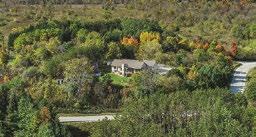















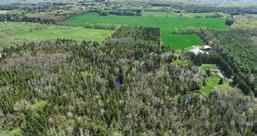





















Murgatroyd, Sean Wynn, Mark Campbell*** *Founder, **Broker of Record, ***Sales Representative

































































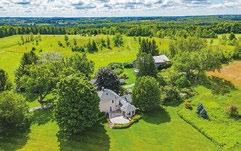






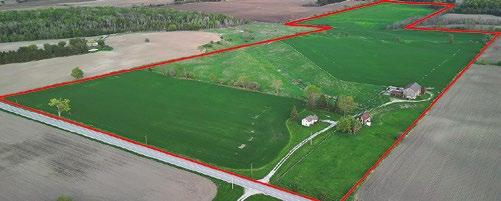










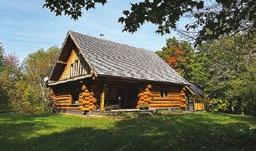












COMPILED BY JANET KERR • ILLUSTRATIONS BY JIM STEWART
NOW – JUN 29 : LAND, SEA & SKY
Members’ show with 40+ works in various media by 25+ Headwaters artists. Mon-Wed 10am-5pm. Free. Alton Mill Arts Centre, 1402 Queen St, Alton. 519-943-1149; headwatersarts.org
NOW – AUG 30 : UNITY IN DIVERSITY
Juried exhibition of 18 Ontario artists. Tues-Sat 10am-4pm. Airport Rd & Hwy 89, Mulmur. 1-877-9417787; Dufferin County Multicultural Foundation, dufferinmuseum.com
NOW – SEP 7 : A DAILY DRIVE
Inuk photographer Robert Kautuk captures a striking shot of the Arctic’s vast beauty. CONTACT Photography, Ottawa Art Gallery, PAMA, 9 Wellington St E, Brampton. 905-791-4055; pama.peelregion.ca
NOW – SEP 7 : DARK ICE: LESLIE REID & ROBERT KAUTUK Arctic land and life in various media. Ottawa Art Gallery, PAMA, 9 Wellington St E, Brampton. 905-791-4055; pama.peelregion.ca
NOW – SEP 7 : JUDE GRIEBEL:
ILLUMINATED COLLAPSE Miniature sculptural scenes of the end of the world. PAMA, 9 Wellington St E, Brampton. 905-791-4055; pama.peelregion.ca
JUN 14 : A RADICAL BOOK LAUNCH
Celebrate the release of Radical Revelry by Canadian author Carley Johnson. Healing circle, marketplace. 10am-noon. Monora Park Pavilion, 500 Monora Park Rd, Mono. carleyjohnson.ca
JUN 17 & 24 : KNITTING & PUZZLES
Drop in for crafts and social time. Puzzle exchanges welcome. 10-11am. Free. 346255 15 Sdrd, Mono. 519-9410972; highcountryunited.weebly.com
JUN 17 & 24 : GET CRAFTY CLUB
Bring any project you’re working on! 1-3:30pm. Shelburne Library, 201 Owen Sound St, Shelburne. 519925-2168; shelburnelibrary.ca
JUN 22 : AN AFTERNOON WITH CLAIRE CAMERON How to Survive a Bear Attack: A Memoir. 1-2pm. Free. Small Town Big Ideas, Shelburne Library, 201 Owen Sound St, Shelburne. 519-925-2168; shelburnelibrary.ca
JUN 26 : AN EVENING OF INDIGENOUS STORYTELLING & POETRY Gimaa R. Stacey Laforme reads from his latest book. Q&A. 6-7pm. Free. Humber River Centre, 28 Ann St, Bolton. Town of Caledon Recreation & Culture, 905-584-2272; caledon.ca
JUN 28, JUL 26, AUG 30 & SEP 27 : ART & POSTER WORKSHOPS FOR BELFOUNTAIN’S BICENTENNIAL Walk-ins welcome. Children 13 & under with an adult. Free. Belfountain Community Hall, 17204 Main St, Belfountain. 519-316-0060; belfountain-heritage.com
JUL 2 – AUG 4 : THE NEXT 50 YEARS
Landscape painting exhibition by Piera Pugliese (pierapugliese.com). WedSun 10am-5pm. Free. Headwaters Arts Gallery, 1402 Queen St, Alton. 519-943-1149; headwatersarts.org
JUL 7 – 25 : ORANGEVILLE ART GROUP AT THE SHELBURNE TOWN
HALL Expressions of creativity and collaboration. Jul 12: reception, 2-4pm. Mon-Fri 8:30am-4:30pm. Free. 203 Main St E, Shelburne. 519-925-2600 x239; orangevilleartgroup.com
JUL 17 : SUMMER ART WORKSHOP SERIES: BLOCK PRINT STATIONERY –AGES 18+ Carve your own stamps to create summer-themed stationery. Register. 6:30-8:30pm. PAMA, 9 Wellington St E, Brampton. 905791-4055; pama.peelregion.ca
JUL 26 & 27, SEP 27 & 28 : HANDCRAFTED WITH LOVE – ARTISAN MARKET Peruse 20+ unique booths, enjoy live music and cider. 10am. Free. 1137 Boston Mills Rd, Caledon. 905838-2520; spirittreecider.com
AUG 6 – SEP 14 : CHAOS & ORDER
Dramatic show of 25+ artists and 30+ works. Wed-Sun 10am-5pm. Free. Alton Mill Arts Centre, 1402 Queen St, Alton. 519-943-1149; headwatersarts.org
AUG 8 – 10 : SUMMER ARTS FEST North(519) Best of The Toronto Fringe, KIDSFest, Music Bingo with Fluffy Soufflé & TroyBoy. Town Hall Opera House, 87 Broadway, Orangeville. 519-942-3423; theatreorangeville.ca

AUG 10 : AUTHORS IN THE HILLS OF MULMUR Kath Jonathan, Bianca Marais and Sue Hincenbergs discuss history, mystery and mayhem with Bernadette Hardaker. Catered reception. Tickets at BookLore and Shelburne Library. 1pm. Foley Barn, 10 Sdrd & 1st Line, Mulmur. 519-942-3830; booklore.ca
SEP 1 – 30 : LIBRARY CARD SIGNUP MONTH @ SHELBURNE LIBRARY Prizes. Mon-Sat 10am-5pm. 201 Owen Sound St, Shelburne. 519925-2168; shelburnelibrary.ca
SEP 2 – 13 : SHELBURNE LIBRARY’S BIGGEST BOOK SALE OF THE YEAR Something for everyone! $2 per bag of books. Mon-Sat 10am5pm. 201 Owen Sound St, Shelburne. 519-925-2168; shelburnelibrary.ca
FARMERS’ MARKETS
ORANGEVILLE : Saturdays, 8am-1pm, to Oct 18. Second St and Broadway. orangevillefarmersmarket.ca
CREEMORE : Saturdays, 9am-1pm, to Oct 25. Creemore Station on the Green, 10 Caroline St E. creemorefarmersmarket.ca
ALLISTON DOWNTOWN MARKET: Sundays, (excluding Aug 10), 9am-2pm, to Sep 21. Centre St & Victoria St. allistonbia.com
ERIN : Thursdays, 3-6:30pm, to Sep 25. Erin Fairgrounds, 184 Main St. erinfarmersmarket.ca
NOW – ONGOING : DCAFS PROGRAMS & WORKSHOPS Community resources for child and youth mental health, child welfare, developmental support services and behaviour solutions. 655 Riddell Rd, Orangeville. 519-941-1530; dcafs.on.ca
NOW – ONGOING : HAPPY DAYS A nostalgic journey through the cherished memories of childhood. Tues-Sat 10am4pm. Airport Rd & Hwy 89, Mulmur. 1-877-941-7787; dufferinmuseum.com
NOW – ONGOING (SATURDAYS & SUNDAYS) : WEEKEND MAPLE SUGARBUSH EXPERIENCE TOUR & TASTING Discover, learn and taste! 10:30am and 12:30pm. 9467 Erin East Garafraxa Tnln, Hillsburgh. 519-216-0699; elliotttreefarm.ca
ABBREVIATIONS
CCS
Caledon Community Services
CMOW
Caledon Meals on Wheels
CMHA
Canadian Mental Health Association
CVC
Credit Valley Conservation
DCAFS
Dufferin Child and Family Services
EWCS East Wellington Community Services
MOD Museum of Dufferin
PAMA
Peel Art Gallery, Museum and Archives
SBEC
Small Business Enterprise Centre
NOW – ONGOING (MONDAYS) :
CMHA PEEL DUFFERIN – RAPID
ACCESS ADDICTION CLINIC Lowbarrier, immediate access and care for substance use management. 10am-1pm. Caledon Specialist Clinic, 18 King St, Bolton. CCS, 905-451-2123; ccs4u.org
NOW – JUL 1 : SPRING RURAL ROMP
Self-guided tour to farms, nurseries and local food/beverage businesses in Mapleton, Minto and Wellington North. Map on website. 10am-4pm. Wellington County. 519-837-2600; wellington.ca
NOW – SEP 20 (SATURDAYS) :
FLOODS, FIRES & FORTITUDE: A HISTORICAL WALKING TOUR
Jay Wilson brings Alton and the mill to life. Rain or shine. Comfortable shoes recommended. 10:30amnoon. Fee. 1402 Queen St, Alton. 519-941-9300; altonmill.ca
JUN 14 : CALEDON SENIORS’ CENTRE TRUNK SALE FUNDRAISER Call to book rental space. Fee. Caledon Seniors’ homemade preserves, BBQ,
order MacGregor’s seafood and meat. 8am-1pm. 7 Rotarian Way, Bolton. 905-951-6114; caledonseniors.ca
JUN 14 : CALEDON DAY Family fun, fireworks and The Strumbellas! 2-10pm. Free. Caledon East Community Complex, Caledon East. Town of Caledon, 905-584-2272 x4376; caledon.ca
JUN 14 & 15 : CALEDON FAIR Truck and tractor pull, demolition derby, Welsh Pony and Canadian Horse shows. Auctions supporting Bethell Hospice, MS Society. Fri 6-10pm. Sat 9am-9pm. Sun 9am-5pm. Caledon Fairgrounds, 18297 Hurontario St, Caledon Village. Caledon Agricultural Society, 519-925-3461; caledonfair.ca
JUN 16 & 23 : SENIORS’ WELLNESS
PROGRAM – AGES 55+ Fitness, food and fun. Guest speakers and friendly, but competitive games. 11am-12:30pm. Free. Victoria Parks Community Centre, Caledon. Caledon Meals on Wheels, 905-857-7651; cmow.org
JUN 17 & 24 : ARTHRITIS FOUNDATION
EXERCISE CLASS Drop in to improve mobility. All welcome, regardless of arthritis diagnosis. Video led. 11-11:30am. Free. 346255 15 Sdrd, Mono. 519-9410972; highcountryunited.weebly.com
JUN 17 & 24 : SENIORS’ WELLNESS
PROGRAM – AGES 55+ Fitness, food and fun. Guest speakers and friendly, but competitive games. 10am-noon. Free. Caledon Library, 20 Snelcrest Dr, Caledon. Caledon Meals on Wheels, 905-857-7651; cmow.org
JUN 17, JUL 15 & AUG 19 : LIVING INTO HOPE – GRIEF SUPPORT Drop in to this peer support group. 1:30-3pm. Free. 346255 15 Sdrd, Mono. 519-9410972; highcountryunited.weebly.com
JUN 18 : BRIGHTSTART CALEDON ANNUAL MEMBERS’ MEETING All welcome. 7-8:30pm. Humber River Centre, 28 Ann St, Bolton. BrightStart Caledon Family Centre, 905-8570090; brightstartcaledon.com
JUN 18 : CREEMORE HORTICULTURAL SOCIETY MEETING Stephanie Brash: Summer Travel – Gardens Not to Be Missed. 7pm. Creemore Station on the Green, 10 Caroline St E, Creemore. 705-466-3170; gardenontario.org
JUN 18 & 25 : SENIORS’ WELLNESS PROGRAM – AGES 55+ Fitness, food and fun. Guest speakers and friendly, but competitive games. 10am-noon. Free. Cheltenham Baptist Church, 14520 Creditview Rd, Caledon. 905-857-7651; cmow.org
JUN 18 & 25 : STRENGTH & STRETCH EXERCISE CLASS Drop in as you can. 11am-noon. Free. 346255 15 Sdrd, Mono. 519-941-0972; highcountryunited.weebly.com
JUN 18, JUL 16 & AUG 13 : CALEDON SENIORS’ CENTRE SPECIAL LUNCHES Jun 18: Quiche. Jul 16: BBQ burgers. Aug 13: Cold plate. Pick-up 11:45am, dine-in noon. Fee, call two days prior for tickets. Delivery available. 11:30am-1pm. 7 Rotarian Way, Bolton. 905-951-6114; caledonseniors.ca
JUN 19 : BOOST THE VALUE OF YOUR BUSINESS Drivers and tips with Rodney Hough. 9am-10:30am. Free. Orangeville & Area SBEC, 200 Lakeview Crt, Orangeville. Town of Orangeville Economic Development, 519-941-0440; orangevillebusiness.ca
JUN 19 : AN EVENING UNDER THE STARS Outdoor gala fundraiser at a Mono private property. Dinner, music and more. 5:30-10pm. 519-938-0780; dufferincommunityfoundation.ca
JUN 19, JUL 17 & AUG 21 : HEAR WELL BE WELL: FREE HEARING HEALTH CHECKUP Basic hearing tests, hearing aid checks and cleanings. 10am-noon. Free, register. Caledon Specialist Clinic, 18 King St, Bolton. CCS, 905-584-2300 x230; ccs4u.org


JUN 19, JUL 17 & AUG 21 : ALZHEIMER SOCIETY OF PEEL DEMENTIA DAY Drop in for program information. 10am-2pm. Caledon Specialist Clinic, 18 King St, Bolton. CCS, 905-584-2300 x230; ccs4u.org
JUN 20 : CREEMORE SUMMER SOLSTICE FESTIVAL Live music with Terra Lightfoot, great food, bar, line dancing, fun for all ages! 5-10pm. Mill St, Downtown Creemore. BIA, instagram.com
JUN 20 : WINES OF THE WORLD
Enjoy 50+ wines, craft beer and cider paired with delicious food and live music. Proceeds to community programs in Caledon and worldwide. 6-9pm. Fee. Caledon Equestrian Park, 200 Pine Ave, Caledon. Rotary Clubs of Palgrave and Caledon, 416-737-9416; rotarywow.com
JUN 20 & 27 : SENIORS’ WELLNESS PROGRAM – AGES 55+ Fitness, food and fun. Guest speakers and friendly, but competitive games. 9:30-11:30am. Free. Palgrave United Church, 34 Pine Ave, Palgrave. Caledon Meals on Wheels, 905-857-7651; cmow.org
JUN 20 & 27 : VON SMART EXERCISE CLASS Drop in to this SMART (Seniors Maintaining Active Roles Together) class. 11am. Free. 346255 15 Sdrd, Mono. 519941-0972; highcountryunited.weebly.com
JUN 21 : HOCKLEY VILLAGE STRAWBERRY PANCAKE BREAKFAST & GARAGE SALES Silent auction, small outdoor market, art sale. 8-11am. Fees, cash only. 994174 Mono-Adjala Tnln, Mono. 905-691-2361; hockleyvillage.com
JUN 21 : CELEBRATE YOUR AWESOME! Inclusive, family-friendly events that honour diversity, pride and individuality. 10am-8pm. Alexandra Park, 11 Second St, Orangeville. celebrateyourawesome.ca
JUN 21 : LIVING QUEER HISTORY: A STORYTELLING CELEBRATION Living Hyphen and PAMA celebrate stories of Peel’s 2SLGBTQIA+ community in this open mic event. 2-4pm. Fee. PAMA, 9 Wellington St E, Brampton. 905-791-4055; pama.peelregion.ca
JUN 21, JUL 26, AUG 16 & SEP 20 : FIELD TO FORK DINNER SERIES Dine on the freshest ingredients alfresco, prepared by local chefs. Proceeds to Shelburne Food Bank. 4:30-8:30pm. Fee. 518024 Cty Rd 124, Melancthon. 519-925-6444; lennoxfarm.ca
JUN 22 : RELESSEY MEMORIAL
SERVICE Please join us. Rev. Kent Ward officiating. 2:30pm. Relessey Church, 874615 Dufferin Cty Rd 8 and 5 Ln, Mono. Relessey Cemetery Board, 519-941-1100.
JUN 25 : HIGH COUNTRY STRAWBERRY SUPPER Sit-down dinner, tickets at the door and takeout available. 5-7pm. Fees. 346255 15 Sdrd, Mono. 519-9410972; highcountryunited.weebly.com
JUN 26 : CALEDON SENIORS’ CENTRE
AFTERNOON STRAWBERRY SOCIAL
Homemade cake, fresh strawberries and cream, and entertainment. 2-4pm. Free, call to register. Town of Caledon, 7 Rotarian Way, Bolton. 905-951-6114; caledonseniors.ca
JUN 26 : FARM TO FORK EXPERIENCE
Chef Ivan prepares local, in-season vegetables alongside proteins from the host and local farms. Rain or shine. 6:30-9pm. Fee. 5682 4th Ln, Hillsburgh. 519-766-6079; 4thlinecattleco.ca
JUN 26, JUL 31 & AUG 28 : CANCER SUPPORT GROUP Peer-led group for those journeying with cancer. All welcome. 1pm. Free. 346255 15 Sdrd, Mono. 519-941-0972; highcountryunited.weebly.com
JUN 27 : ST. JOHN’S STRAWBERRY
SUPPER Ham supper, salads, strawberries and cake. 5-7pm. Fee. St. John’s Anglican Church Orangeville, 3907 Hwy 9, Caledon. 519-941-1950; stjohnsorangeville.ca
JUN 27 : BOLTON TRUCK & TRACTOR PULL A test of sheer horsepower. 6-11pm. Fees, online and at the gate. Albion & Bolton Fairgrounds, 150 Queen St S, Bolton. Albion & Bolton Agricultural Society, 905880-0369; boltontractorpull.ca
JUN 27, JUL 11 & 25, AUG 29 : FRIDAYS IN THE PARK Live music, children’s entertainment and community activities. 6pm. Free. Jack Downing Park, 140 Main St E, Shelburne. Shelburne BIA, Town of Shelburne, 519-925-2600 x239; shelburne.ca
JUN 28 & 29 : HEADWATERS MEDIEVAL FAIRE Music, vendors, activities and the Knights of Valour jousting show. 10am. Fee. OAS Event Centre, 247090 5 Sdrd, Mono. Medieval and Renaissance Fairs in Ontario, faires.ca
JUN 28, JUL 26 & AUG 30 : BELFOUNTAIN’S BICENTENNIAL TRIVIA NIGHT FUNDRAISERS Show off your knowledge for fun and prizes. 6-8pm. Belfountain Community Hall, 17204 Main St, Belfountain. 519-3160060; belfountain-heritage.com
JUL 1 : CALEDON CANADA DAY STRAWBERRY FESTIVAL Delicious pancakes, strawberries, live entertainment, kids’ activities,
garage sale, Classic Car Show. 8am-4pm. Free. Caledon Village Fairgrounds, 18297 Hurontario St, Caledon Village. Caledon Agricultural Society, 519-925-3461; caledonfair.ca
JUL 1 : SUMMERFEST CANADA DAY
Live music, food, family-friendly activities. Noon-5pm. Free. Erin Fairgrounds, 184 Main St, Erin. Town of Erin, Rotary Club of Erin, 519-833-9258; erinrotary.com
JUL 1 : ORTON CANADA DAY CHICKEN
BBQ & FIREWORKS DISPLAY
Seatings at 5 and 6pm. Fireworks at dusk. See the website for prices and dinner reservations. 5-10pm. Orton Community Park, 4 John St, Orton. Orton Community Association, 519855-4243; orton-community.com
JUL 5 : CHELTENHAM DAY Vendor market, kids’ zone, beer garden with live music, silent auction. 9:30am5pm. Free. Cheltenham General Store, 14386 Creditview Rd, Cheltenham. Cheltenham Area Residents’ Association, 416-605-3865; facebook.com
JUL 5 : ERIN FALL FAIR 175TH
ANNIVERSARY TRACTOR PARADE & COMMUNITY CELEBRATION
Join the parade from Hillsburgh to Erin. Family-friendly activities, music. 10am-4pm. Free. Erin Agricultural Society, 519-833-2808; erinfair.com
JUL 10 & AUG 14 : NEWCOMERS
WEBINAR: ENGLISH LANGUAGE TRAINING & SETTLEMENT
ASSISTANCE Improve your English, navigate settlement services or connect with others. 2:30-3pm. Free. Zoom. CCS, 905-584-2300 x230; ccs4u.org
JUL 13, AUG 10 & SEP 14 : TEEN RANCH HUNTER/JUMPER SHOWS Professional, friendly and quality series since 1985! Top 7 in each division qualify for Ontario Fall Finals. 20682 Hurontario St, Caledon. 519-941-4501; teenranch.com
JUL 18 – 20 : ORANGEVILLE
ROTARY RIBFEST BBQ ribs, beer tent, Kidsfest, music. Proceeds to Rotary Park playground, other community projects. Bring gently used shoes for BioPed Orangeville’s Soles4Souls shoe drive. Free, donations accepted. Alder Street Recreation Centre, Orangeville. Rotary Club of Orangeville, 519-9391298; orangevilleribfest.com
Sandhill Pipes & Drums Band, 2nd York Militia & Canadian Volunteers of 1812 re-enactment co., horses, vintage cars, Erin Air Cadets, and more!
Festival Activities
• Commemorative sculpture & plaque unveilings

Free Art & Poster Workshops
May 31st , 1pm-4pm
June 28th , 1pm-4pm
July 26th , 1pm-4pm Aug 30 th , 1pm-4pm Sept 27th , 1pm-4pm
Trivia Night Fundraisers
• Live music: MAXIMUM 60s, Golden Country Classics Band, and Free Agents Band & Melyssa Kerr
• Scavenger hunt
• Heritage Art Show & Displays
• Vendors’ market
FREE PARKING AND SHUTTLE SERVICE
To help make this day a success, we are looking for sponsors & donors! SPONSORS will have their company logo on banners, posters, souvenir booklets, flyers & website.
TAX RECEIPTS AVAILABLE for donations of $100 or more. Contact Sarah, Belfountain Heritage Society belfountainheritage@gmail.com










June 28th , 6pm-8pm July 26th , 6pm-8pm Aug 30 th , 6pm-8pm
Hosted at Belfountain Community Hall @ 17204 Mississauga Rd. Walk-ins welcome!
To learn more about Belfountain’s rich history, scan the QR code below or visit www.belfountain-heritage.com

This is all possible thanks to our generous sponsors and supporters!











SHELBURNE Dinner includes dessert, with Pickin’ in the Park. 4-7pm. Fee. Shelburne Agricultural Community Centre, Shelburne. Rotary Club of Shelburne, 519-2784578; shelburnerotaryclub.com
JUL 26 : PARIS IN THE PARK Enjoy an outdoor, Parisian-themed culinary experience. Reserve online. 5-10pm. Fee. Creemore Village Green, 181 Mill St, Creemore. Chez Michel, 705-466-3331; chezmichel.ca
AUG 8 – 10 : FERGUS SCOTTISH FESTIVAL & HIGHLAND GAMES Celebrate Scottish heritage, and enjoy world-renowned talent and entertainment. Centre Wellington Community Sportsplex, Fergus. 519787-0099; fergusscottishfestival.com
AUG 9 : ALLISTON DOWNTOWN
STREET FESTIVAL Food trucks, 200+ vendors, entertainment, live music and kids’ fun! 10am-4pm. Free. Downtown Alliston, Mill and Victoria Sts. allistonbia.com
AUG 17 : GROVE CEMETERY
MEMORIAL SERVICE Fellowship, music and guided prayer as we remember our loved ones. 2-3pm. Grove Cemetery, Erin-Garafraxa Tnln, Orton.
AUG 22 : IN GOOD SPIRITS – AGES 19+ The finest locally produced craft beverages in the region. 6-10pm. Fee. Mill St, Orangeville. Orangeville BIA, 519-942-0087; downtownorangeville.ca
AUG 23 : SHOP THE SIDEWALK
Explore downtown for deals, promotions and one-of-a-kind items. 11am-4pm. Orangeville BIA, 519-9420087; downtownorangeville.ca
AUG 23 : TASTE OF ORANGEVILLE
The best tastes from 14+ restaurants, live music. 11am-4pm. Mill St, Orangeville. Orangeville BIA, 519-9420087; downtownorangeville.ca
FALL FAIRS 2025
Please see websites for more details.
AUG 29 – 31: ORANGEVILLE
OAS Event Centre, 247090 5 Sdrd, Mono. Orangeville Agricultural Society, 519-942-9597; oaseventcentre.ca
SEP 11 – 14: BRAMPTON
Brampton Fairgrounds, 12942 Heart Lake Rd, Caledon. 905843-0210; bramptonfair.com
SEP 12 – 14: SHELBURNE
Shelburne & District Fairgrounds, 200 Fiddlepark Lane, Shelburne. facebook.com/shelburnefair
SEP 19 – 21: BOLTON
Albion & Bolton Fairgrounds, 150 Queen St S, Bolton. boltonfair.ca
SEP 19 – 21: GRAND VALLEY
Grand Valley Agricultural Society Fairgrounds, 60 Main St N, Grand Valley. 226-979-3724; grandvalleyfallfair.ca
OCT 10 – 13: ERIN
Erin Agricultural Society Fairgrounds, 190 Main St, Erin. erinfair.com
JUN 14 – AUG 30 : SATURDAY NIGHT
MOVIES Two family-friendly films each night. Bring blankets and chairs. 6-10pm. Free. Garden Square, 12 Main St, Brampton. Brampton On Stage, 905-874-2800; tickets.brampton.ca
JUN 20 : GLOWJAM – AGES 7 TO 13 Dancing, music, games and tons of fun! Different fundraisers to benefit the community. 7pm. Fee. Orangeville District Secondary School, 22 Faulkner St, Orangeville. glowjam.ca
JUL 3 – 31 (TUESDAYS & THURSDAYS) : SUMMER FUN STUDIO TIMES – AGES 5+ From sand art,
kites to tie-dye art and more. See website for Aug activities. All children with an adult. 10:30am-3pm. PAMA, 9 Wellington St E, Brampton. 905791-4055; pama.peelregion.ca
JUL 4 : TD SUMMER READING CLUB
KICK-OFF PARTY Outdoor games, prizes! 10am-5pm. Register. Shelburne Library, 201 Owen Sound St, Shelburne. 519-925-2168; shelburnelibrary.ca
JUL 4 – AUG 22 : TD SUMMER READING CLUB – ALL AGES
Challenges, programs, prizes and fun! Free. 201 Owen Sound St, Shelburne. 519-925-2168; shelburnelibrary.ca
JUL 10 : SPIN, POP, BOOM SHOW BY MAD SCIENCE Learn the sounds and spectacle of chemistry and physics. Register. 1:30-2:15pm. PAMA, 9 Wellington St E, Brampton. 905791-4055; pama.peelregion.ca
JUL 19 : PAPER-MAKING WORKSHOP
– ALL AGES Transform recycled materials into one-of-a-kind handmade cards. Register. All children with an adult who must also register to participate. 11am-1pm, 2-4pm. PAMA, 9 Wellington St E, Brampton. 905791-4055; pama.peelregion.ca
AUG 21 : PIRATE WORKSHOP
Stories, games, activities and a scavenger hunt! 12:30, 2 and 3:30pm. Register. 12:30-4:30pm. PAMA, 9 Wellington St E, Brampton. 905791-4055; pama.peelregion.ca
AUG 22 : TD SUMMER READING CLUB
FINALE PARTY! Celebrate your reading milestones. Winners announced, pizza party, music by Josh Oatman, Party Safari. 10am-5pm. Free. Shelburne Library, 201 Owen Sound St, Shelburne. 519-925-2168; shelburnelibrary.ca
SEP 4 – 7 : CAMP MOLLY – AGES 15 TO 18 A firefighting camp dedicated to inspiring young female and nonbinary youth. Free. campmolly.ca
NOW – ONGOING : ERIN HILL ACRES
SUMMER WEEKENDS Live music and special events. 5837 3 Line, Hillsburgh. 519-806-7273; erinhillacres.farm
JUN – SEP: LIVE MUSIC AT ROSE THEATRE All performances at 8pm and have fees unless noted. Rose Theatre, 1 Theatre Ln, Brampton. 905-874-2800; tickets.brampton.ca
JUL 4, 18, 25, AUG 8, 15, 22 : THE FRIDAY NIGHT PATIO SERIES
Live concerts. 7pm. Free. Garden Square, 12 Main St, Brampton.
JUL 11 : EAST COAST KITCHEN PARTY Experience the heart and soul of Newfoundland. 7pm. Free. Garden Square.
JUL 17 : HYPE This electrifying showcase celebrates rising singers and performers.
AUG 1 : COLOURS OF CARNIVAL
Dance party featuring soca, dancehall, calypso, reggae and reggaeton. Dress up! 7pm. Free. Garden Square.
AUG 14 : LOVE HURTS Breathing new life into country classics. Dance following.


JUL 24 : CHILDREN’S DRUMMING SESSION AT PAMA Express yourself through rhythm. 1 & 2:30pm. Register. PAMA, 9 Wellington St E, Brampton. 905-791-4055; pama.peelregion.ca
AUG 7 : BUBBLEOLOGY The science and art of the beautiful bubble. Register. 1:30-2:15pm. PAMA, 9 Wellington St E, Brampton. 905791-4055; pama.peelregion.ca
AUG 27 : THE LAST WALTZ: A MUSICAL CELEBRATION OF THE BAND An intimate live celebration with an all-star lineup.
AUG 29 : AFTERGLOW! Be part of the ultimate Swiftie experience! 7pm. Free. Garden Square.
SEP 7 : MORGAN JAMES FEATURING THE B-JAZZED ORCHESTRA
Soulful arrangements backed by the B-Jazzed Orchestra. 7pm.

JUN 18 & 25 : CALEDON CONCERT
BAND REHEARSAL All ages and skills. 7-9pm. Free. Caledon Hills Fellowship Baptist Church, 16595 Airport Rd, Caledon East. 905-9517979; caledonconcertband.ca
JUN 19 : BRAMPTON FOLK CLUB
CONCERT “Back to the Garden – An Evening with Mother Nature.” 7-8:30pm. PAMA, 9 Wellington St E, Brampton. 905-791-4055; pama.peelregion.ca
JUN 22 : SPOTLIGHT ON THE ARTS & SPRING CONCERT Highlight performances of the 2025 South Simcoe Arts Council (SSAC) Music Festival. 2-5pm. St. John’s United Church, 56 Victoria St E, Alliston. 705-435-2378; southsimcoeartscouncil.com
JUL 6 – AUG 24 : SUNDAYS IN
THE PARK: SUMMER CONCERT
SERIES Family-friendly concerts in the heart of downtown Creemore. See website. 1-2:30pm. Free. 181 Mill St, Creemore. creemorevillagegreen.ca
JUN 14 : COMPASS RUN FOR FOOD
Supporting food banks and schools. 10.5 km or run/walk 5 km trails. In person or virtually. Register online. 8am-12:30pm. Island Lake Conservation Area, Orangeville. compassrun.com
JUN 14 : VELOCITY Supporting Caledon seniors. Four scenic routes for all ages and levels. Register online. 8am. Caledon East Park, 6101 Old Church Rd, Caledon East. ccsvelocity.ca
JUN 20 – 22 : SUMMER SOLSTICE NATURE CELEBRATIONS Natural and invasive species identification, geological explorations and forestbathing walks. Dufferin Hi-Land Bruce Trail Club, dufferinbrucetrailclub.org
JUL 3 : HIDDEN GEMS VII “HIDING IN HOCKLEY” Garden tour. 6-9pm. Fee, at May/June meetings, Booklore and Past Glories of Toad Hollow. Hockley Village. Orangeville and District Horticultural Society, orangevillehort.com
JUL 12 & 13 : ISLAND LAKE BASS
DERBY – ALL AGES Big-catch prizes. Fishing license required for ages 18–64. See cvc.ca for change/cancellation info. 7am-3pm. Fees. Island Lake Conservation Area, Orangeville. Friends of Island Lake, 1-800-367-0890; islandlakederby.ca
JUL 24 : EWCS GOLF TOURNAMENT All levels. Proceeds to healthcare, transportation and social service needs. Lunch and dinner (dinner only
tickets available), golf carts, prizes. 10:30am-7pm. Fees. Guelph Lakes Golf and Country Club, 7879 Wellington Rd, Guelph. 519-833-9696; ew-cs.com
AUG 8 – 10 : MANSFIELD 24-HOUR
MTB EVENT Limited entry, meals, and tent or RV camping included. Cabins available. Fri: BBQ, bar and live music. 9am-5pm. Fee. Canondale, Mansfield, 937365 Airport Rd, Mulmur. 705-4354479; mansfieldoutdoorcentre.ca
AUG 10 : CALEDON HILLS BRUCE TRAIL CLUB GRAND RIVER CRUISE
Three-hour full meal on your own boat. Optional led prehike. Some proceeds to the Bruce Trail. Noon3pm. Fee. caledonbrucetrail.ca
AUG 28 : PEEL-DUFFERIN PLOWMEN’S ASSOCIATION PLOWING MATCH Join us to mark our 100th anniversary. 14495 The Gore Rd, Caledon. 519-400-3160; facebook
Visit us online
For up-to-date listings between issues, and for more details, go to inthehills.ca/events.
To submit your community, arts or nonprofit event:
Select “What’s On” from the menu bar at inthehills.ca.
That will take you to the listings page. Select “Add Your Community Event” and complete the easy form.
Submit by Friday, August 1, 2025 for the fall (September) issue.
We reserve the right to edit submissions for print and web. inthehills.ca
SEP 1 : ISLAND LAKE CLASSIC
5 km and 10 km races on groomed trails and bridge crossings. Medal, swag, free kids’ fun run! 8am-1pm. Fee. Island Lake Conservation Area, Orangeville. gottarunracing.com
SEP 3 : LEGACY GOLF CLASSIC
Proceeds to Caledon Agricultural Society. All levels welcome. 8:30am5pm. TPC Toronto at Osprey Valley, 18821 Main St, Caledon. Allan and Anne Thompson Community Fund, 905-703-0744; legacygolfclassic.ca
SEP 5 : TERRA COTTA COMMUNITY
CENTRE GOLF TOURNAMENT
Nine-hole tournament in support of our community hall. Donations and support appreciated. Noon-9pm. Calerin Golf Club, 9521 10 Sdrd, Erin. terracottacommunitycentre.com
SEP 8 : CALEDON SENIORS’ CENTRE
CHARITY GOLF TOURNAMENT
Supporting the centre and satellite programs. Lunch, cart, prizes included. Registration 11am, lunch noon and 1pm tee off, shotgun train. 11am-6pm. Fees, register online or by email. Glen Eagle Golf Club, 15731 RR 50, Caledon. 905-951-6114; caledonseniors.ca
JUN 14, 15, 20 – 22 : DELVAL DIVAS
How do The Divas save their prison home, solve a murder and reunite on a Roman holiday? By American playwright Barbara Pease Weber. Bring food drive donation. Fri Sat 8:15pm. Sun 2:15. Fees. 17272 Mt Wolfe Rd & Hwy 9, Caledon. 905-880-5002; blackhorsetheatre.ca
JUN 18 : ARTS INSIDE: INTRO TO ACTING – AGES 14+ Explore improvisation, script analysis and acting techniques with Allison Edwards-Crewe. 7-9pm. Fees. The Rose Studio, 1 Theatre Ln, Brampton. Brampton On Stage, 905-874-2800; tickets.brampton.ca
JUL 3 – 6 : THE NORTHMEN WAY
DOCUMENTARY Celebrate the rich history of lacrosse in Orangeville, the iconic Northmen, and the impact on the greater sports world. See website for fees and times. Town Hall Opera House, 87 Broadway, Orangeville. bumpyroadproductions.com
AUG 15 – 17 : DUFFERIN FILM FESTIVAL Showcasing the best independent films and emerging filmmakers, educational opportunities, industry forums and networking events. See website for fees and times. Town Hall Opera House, 87 Broadway, Orangeville. dufferinfilmfest.com
SEP 7, 13, 14, 19 – 21 : MELVILLE
BOYS Norm Foster’s laughs and tender moments about brotherhood and the unexpected. Fri Sat 7:30. Sun 2pm. 72 Trafalgar Rd, Hillsburgh. 519-8554586; centurychurchtheatre.com
SEP 17, 19 & 21 : THE NORM EFFECT: A THREE-DAY ADVENTURE THROUGH FOSTER’S WORLD Three Norm
Foster readings staring Norm Foster and friends. Wed 7:30pm: On a First Name Basis. Fri 7:30pm: The Writer. Sun 2pm: Jonas & Barry in the Home (with David Nairn). Town Hall Opera House, 87 Broadway, Orangeville. 519942-3423; theatreorangeville.ca








28 Ontario Tar & Chip Bespoke Country Driveways 108 Orangeville Building Supply / GO Timber Mart 88 River Ridge 8 Roberts Roofing 131 Synergy Exteriors
INTERIOR DECORATING & DESIGN 22 JDC Janssen Design
LANDSCAPING & GARDENING 19 GB Stone 9 Headwaters Landscaping
Hill’N Dale Landscaping 49 It’s In The Shed 82 Leaves & Petals Garden Maintenance 19 Randy Tumber Consulting 88 River Ridge 25 Sinovi Masonry & Stonescapes 3 Tumber Landscape Design & Build
108 Downsizing Diva Dufferin-Caledon 55 Maria Sierra, Smart-Shift Transition
Rural Commons PEST
Environmental Pest Control PET SUPPLIES & SERVICES 30 Animals in Motion Rehabilitation Services 30 Erin Trailside Veterinary Services 96 Global Pet Foods PONDS 47 Creative Ponds
103 ReMax Realty Specialists Inc.
Sigrid Doherty
109 Royal LePage Credit Valley
Rita Lange
109 Royal LePage Meadowtowne Realty
Denise Dilbey
116 Royal LePage Meadowtowne Realty
Paul Richardson
76 Royal LePage Meadowtowne Realty
Tom Linkletter
117 Royal LePage RCR Realty
Doug & Chris Schild
112 Royal LePage RCR Realty
Jacqueline Guagliardi
116 Royal LePage RCR Realty
Kelly McCague
105, 114 Royal LePage RCR Realty
Suzanne Lawrence
114 Royal LePage RCR Realty
Victoria Phillips & Janna Imrie
12, 110 Royal Le Page RCR Realty
Wayne Baguley
94 Sutton-Headwaters Realty
Jim Wallace & Rebecca Wallace
RECREATION 124 Mansfield Outdoor Centre
SCHOOLS & EDUCATION 10 Brampton Christian School
Barwell
Bosley Real Estate
Velvet Alcorn & Lindsay Alcorn
110 Century 21 Millennium Inc.
Ann Shanahan, Betty Hunziker
111 Century 21 Millennium Inc.
Mary Klein, Kaitlan Klein
116 Century 21 Millennium Inc.
Michele Skawski 112 Chestnut Park Real Estate
Sue Collis, Sarah MacLean
115 Coldwell Banker, Ronan Realty
Britton Ronan, Marc Ronan, Sarah Lunn
Cornerstone Realty Brokerage
Nancy Urekar
Harvey Kalles Real Estate Ltd.
Hilary Matthews
113 Moffat Dunlap Real Estate
Moffat Dunlap, John Dunlap, Nik Bonellos, Elizabeth Campbell, Courtney Murgatroyd, Sean Wynn, Mark Campbell
112 ReMax In The Hills
Chris Richie, Karen Caulfield, Carmela Gagliese-Scoles, Sean Anderson, Dale Poremba, Jennifer Unger
SECURITY 76 Commissionaires Great Lakes
SENIORS’ SERVICES
Avalon Retirement Lodge 91 Headwaters Home Care 91 Lord Dufferin Centre
TOURISM & TRAVEL 27 Cruise Holidays
FF9 Dufferin County
48, 49 Orangeville BIA
34 Town of Caledon
26, 27 Town of Erin
TREE SERVICES
FF15 Nortree Arborists Inc.
WEDDINGS
21 Alton Mill Arts Centre
13 Mrs. Mitchell’s Restaurant




















TURN NORTH OFF DUFFERIN ROAD 109 ONTO EAST
Luther Sideroad 21-22, and you’ll encounter a landscape of pancake-flat, carefully tended farm fields and, in the distance, giant wind turbines. What you won’t find is any hint that Peepabun was once a thriving centre of Christian revivalism.
That’s not surprising. Even in its heyday, Peepabun — its curious-sounding name is said to derive from an Anishinaabe word meaning “dawn of day” or “turn of the day” — was a widely scattered farming community. Its nucleus, if there was one, may have been the post office, which closed in 1912.
But for a time, at least, annual camp meetings, a popular evangelical tradition that had spread north from the United States, focused widespread attention on the community. The photo shows some of the congregants, decked out in Sundaygo-to-meeting finery, at a Peepabun camp meeting in 1905.
The Peepabun meetings, which began in about 1898, took place every summer on a local farm and attracted the faithful from as far away as the northern U.S. Camping out, the visitors attended outdoor services several times a day over the course of about 10 days.

A church, Victory Chapel, was built, but most camp services were held outdoors in a “brush arbour.” The arbour was assembled by collecting long, green — and therefore flexible — poles and planting them in two parallel lines about 30 feet apart. The tops of the poles were bent toward each other and lashed together to create an arched frame that was covered in evergreen boughs.
Inside, wooden benches provided seating, sawdust covered the ground, and a platform was built for the singers and the preachers, usually visiting ministers and missionaries.
By the 1930s, however, enthusiasm for camp meetings was fading, and the Peepabun meetings died out. Victory Chapel was eventually torn down, the Peepabun post office had long since closed, and in the 1960s, the community’s Presbyterian church met the same fate as Victory Chapel.
Today, Peepabun’s halcyon days are largely forgotten. But its name, said to be the only Indigenous place name in Dufferin County, endures, even if only on Google Maps.
— DYANNE RIVERS












